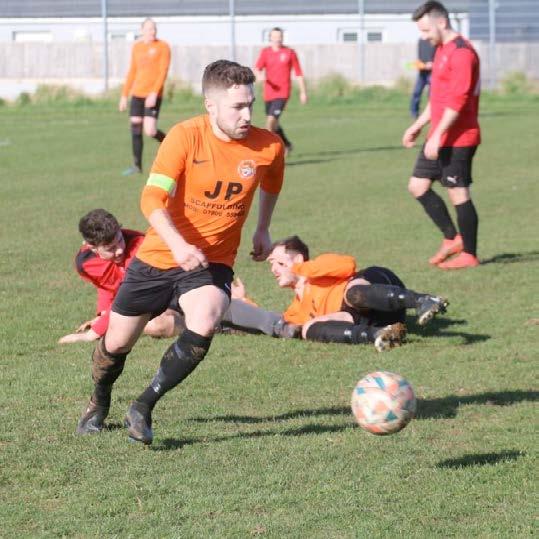




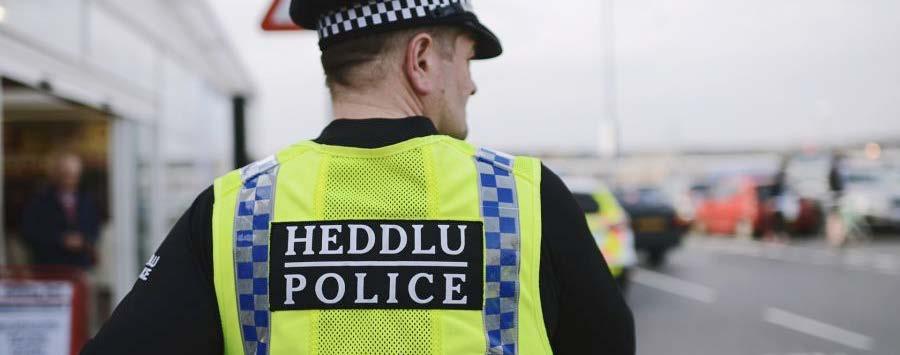












THE government is set to abolish the controversial system of Police and Crime Commissioners (PCCs) across England and Wales, bringing an end to a decade-old experiment in elected policing oversight.
PCCs were introduced by the Conservatives in 2012, replacing police authorities and giving one elected individual responsibility for holding each force to account, setting budgets and priorities, and hiring or firing chief constables. The move was sold as a way to boost transparency and make policing more responsive to local communities.
But the system has long faced criticism, with police chiefs complaining about political interference, low turnout in PCC elections, and inconsistent performance between force areas. Labour ministers have now confirmed the roles will be abolished once the current terms expire.
Announcing the plan, Home Secretary Shabana Mahmood said PCCs had “failed” to deliver meaningful accountability.
“The introduction of police and crime commissioners by the last government was a failed experiment,” she said. “I will introduce new reforms so police are accountable to their local mayoralties or local councils. The savings will fund more neighbourhood police on the beat across the country, fighting crime and protecting our communities.”
Mahmood added that current PCCs would continue in post until the end of their terms and thanked them for their service. The next PCC elections, due in May 2028, will now be cancelled.
Joint Statement from the Police and Crime Commissioners for Wales
A statement was issued jointly by
the Police and Crime Commissioners for Wales on Thursday afternoon: “The announcement that the role of Police and Crime Commissioners (PCCs) is to be abolished represents a significant moment for policing governance in Wales and across England.
As PCCs, we and our offices perform vital functions that make a real and tangible difference to the lives of thousands of people, from commissioning critical services for victims and survivors, to holding our police forces to account, shaping local priorities, and representing the voices of our communities. This important work will continue throughout any transition period.
While the detail of future governance arrangements has yet to be determined, it has been clear for some time that reform of the policing landscape has been high on the Government’s agenda. Both former and current Home Secretaries have indicated an intention to review and reshape local policing oversight. As this process unfolds, our focus remains on ensuring that accountability, transparency and public service remain at the heart of any new model.
We believe it is essential that the next phase delivers stability, continuity and confidence, for the public, for victims, for policing partners and for the workforce. The transition must not divert attention from what matters most: keeping people safe, supporting victims, and building public trust in policing.
As the future roadmap is developed, we stand ready to contribute our knowledge, experience and insight to help shape the next oversight model. We urge the UK Government, Welsh Government and the Home Office to work collaboratively with us and to consult widely across Wales
to ensure that any new arrangements reflect Welsh priorities and maintain the highest standards of accountability and service.
Ultimately, any future system must serve the best interests of policing and the public, safeguarding local accountability while supporting effective, communityfocused policing. We welcome the Government’s stated commitment to ensuring that public confidence remains central to policing oversight, and we are committed to engaging constructively to achieve that goal.
The role of PCC may change, but our dedication to the people of Wales and our Force areas remains unwavering. We will continue to champion victims, uphold public confidence, and work tirelessly to ensure that policing in Wales remains responsive, fair and effective through this period of transition and beyond.”
Responding to the news that Police and Crime Commissioners have been abolished, Welsh Liberal Democrat Westminster Spokesperson David Chadwick MP said: “After years of calling for Police and Crime Commissioners to be scrapped, this is a huge Liberal Democrat win.
“The Government must now ensure that the resources wasted on these costly PCCs go into what really matters –improving frontline policing and properly staffing community policing and rural crime teams.”
A confidential briefing seen by The Herald states that in areas with an elected mayor — such as Greater Manchester and the West Midlands — those mayoralties will take over PCC
responsibilities.
In areas without a mayor, including every police force in Wales, local councils are expected to take on the role via new policing and crime boards. Full details are expected to be announced shortly, including how much money the government believes will be saved and how those savings will be reinvested.
Background: A troubled model from the start
Turnout in the first PCC elections in 2012 averaged just 15%, one of the lowest recorded in any modern UK election. Subsequent contests rarely climbed above 30%.
Several PCCs faced controversy during their terms, including allegations of overreach, resignations, and costly by-elections. Critics said the role created too much power in the hands of one individual, while supporters argued the model brought clearer accountability than the old police authority committees. For years, independent reviews and parliamentary committees raised concerns about the system’s effectiveness, but no government acted until now.
Policing is controlled by Westminster, but PCCs cover the four Welsh police forces: Dyfed-Powys, South Wales, Gwent and north Wales. Wales does not currently have regional mayors with policing powers, meaning new local oversight structures will need to be created.
The move will therefore be one of the most significant changes to policing governance in Wales since devolution. Who is the current Dyfed-Powys PCC?
The PCC for Dyfed-Powys — covering Pembrokeshire, Carmarthenshire, Ceredigion and Powys — is Dafydd Llywelyn, first elected in 2016 and representing Plaid Cymru. He will remain in office until the government formally dissolves the role.
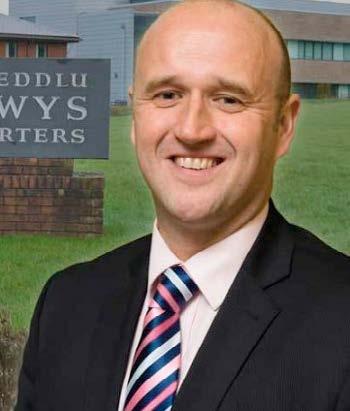






FOUR children were taken to hospital after smoke began filling a school bus outside Ysgol Bro Gwaun in Fishguard on Tuesday afternoon (Nov 4).
The incident occurred on the 503 school route operated by Richards Bros, when a fault in the vehicle’s heating and air conditioning system caused a foulsmelling smoke to pour from the vents.
Witnesses said the bus was stationary outside the school when pupils first noticed the problem. Some attempted to leave via the emergency exit but were reportedly told to remain on board. The driver then moved the bus a short distance to the school’s
astro-turf area, where the pupils were briefly allowed off.
Parents later reported that some children developed headaches, sore throats and nausea after inhaling the fumes. Four pupils were later taken to hospital as a precaution after contacting nHS 111 for advice. All were discharged the same evening.
A Pembrokeshire County Council spokesperson confirmed that the issue was caused by a melted electrical component within the heating system, which had produced the smoke.
They said the bus was immediately stopped, the fault isolated, and the vehicle removed from service for inspection. A full safety check has since been completed, and the problem has been rectified.
The council added that pupil safety “remains the highest priority” and that it continues to work closely with the transport provider to ensure all school buses meet required safety standards.
The Herald understands that the driver acted promptly once alerted to the problem and that the bus was around 15 minutes late leaving the school site as a result of the incident.
A 52-YEAR-OLD Haverfordwest woman brought court proceedings to a halt this week with a furious outburst against the police.
“This county is full of wrong’uns,” shouted Sally n olan from the dock at Haverfordwest Magistrates’ Court on Tuesday ( n ov 11).
“Two police officers arrested me for nothing and got away with it. You’re all bent, man – the lot of you.”
n olan, of Three Meadows, Haverfordwest, was convicted on October 20 of failing to provide a blood specimen for laboratory analysis
after being stopped by officers while driving through Johnston on August 15.
“Initially she complied with the police enquiries, but when she was taken into custody she refused to provide a specimen, saying the police were corrupt,” said Crown Prosecutor Sian Vaughan.
Her behaviour escalated in court, prompting senior legal manager n athan Chapman to order her removal from the dock. However, when n olan was readmitted some 90 minutes later, the disruption continued.
“I’ve never been done for drink or drugs, so this was an unlawful arrest,” she declared. “You’ve villainised me and I’m not going away until I get justice. And by the way, I’m going now — you can send me a letter in the post.”
Magistrates proceeded to deliver their verdict in her absence. n olan was fined £300 and ordered to pay £650 in prosecution costs and a £120 surcharge, bringing the total to £1,070. She was also disqualified from driving for 18 months.
A HOMELESS man who hurled abuse at police officers after being found covered in blood at a bus stop in Goodwick has been fined by magistrates.
Scott Hughes, aged 26, was discovered by officers just after 6:30pm on October 22, sitting in a bus shelter opposite the Glendower Hotel.
“Police had received a call from a member of the public who was concerned about the defendant’s wellbeing,” Crown Prosecutor Sian Vaughan told Haverfordwest magistrates this week.
“He was sitting on a bench in the
bus stop, covered in blood, and was very intoxicated, having difficulty standing.”
When officers suggested taking Hughes to hospital for treatment, he became verbally aggressive.
“He told the police he wanted to be left alone and that’s when the bad language started,” said Ms Vaughan.
“His obscenities continued, and this was what led to his arrest.”
Hughes later pleaded guilty to being drunk and disorderly in a public place.
Defending solicitor Alaw Harries said the offence was aggravated by
Hughes’ difficult circumstances.
“He’s been homeless for some time,” she said. “He’s finding it very difficult to obtain support, and the current housing situation in Pembrokeshire certainly isn’t helping.
“He’s extremely sorry for what happened, but that evening he had gone to the Glendower pub to use the phone because he’d injured his finger, and he began drinking to cope with his situation.”
After considering the mitigation, magistrates fined Hughes £40 and ordered him to pay £85 in court costs and a £16 victim surcharge.

A LONG-RUNNING row over dog noise in the small coastal village of Trefin has taken a new turn after a local woman admitted breaching a Community Protection Notice — while multiple other charges were dropped by Pembrokeshire County Council. Julia Goodgame, aged 58, of Bryn Y Derwydd, appeared before Haverfordwest Magistrates’ Court on Monday (Nov 10) facing nine allegations of failing to keep her dogs under control, contrary to the terms of a Community Protection Notice (CPN) issued by the council in June.
The case, prosecuted by David Wheel of Welch & Co on behalf of the council, followed months of complaints from neighbours and a protest in the village earlier this year over what residents described as “constant barking” and “uncontrolled dogs”.
In August, residents of Bryn Y Derwydd staged a small protest calling for stronger action, claiming that up to ten dogs were being kept at one property and that the noise had become intolerable.
One pensioner told The Herald they had been “kept awake for months”, while others complained of dogs roaming freely and fouling gardens.
Tom Sinclair editor@herald.email
Local councillor neil Prior, who represents Llanrhian, said at the time that the situation had been “slow and frustrating” for all involved, adding that council officers, housing staff and police had been in discussion for over a year about possible enforcement.
The council issued the CPn on June 17, requiring Ms Goodgame

to keep her dogs under control and prevent excessive noise. She was later accused of breaching the notice on nine occasions between June 17 and July 15, with further allegations in July and September.
At Monday’s hearing, Ms Goodgame — who represented herself — pleaded guilty to one count, relating to June 20. The remaining eight counts were dismissed after the council offered no evidence.
Magistrates adjourned the case until December 11 for sentencing and to consider the council’s application
for a Criminal Behaviour Order (CBO) and costs.
The case has divided opinion in Trefin, with some residents welcoming the prosecution and others calling for mediation and support rather than legal action.
The outcome of next month’s hearing will determine whether longerterm restrictions are imposed under the proposed CBO.
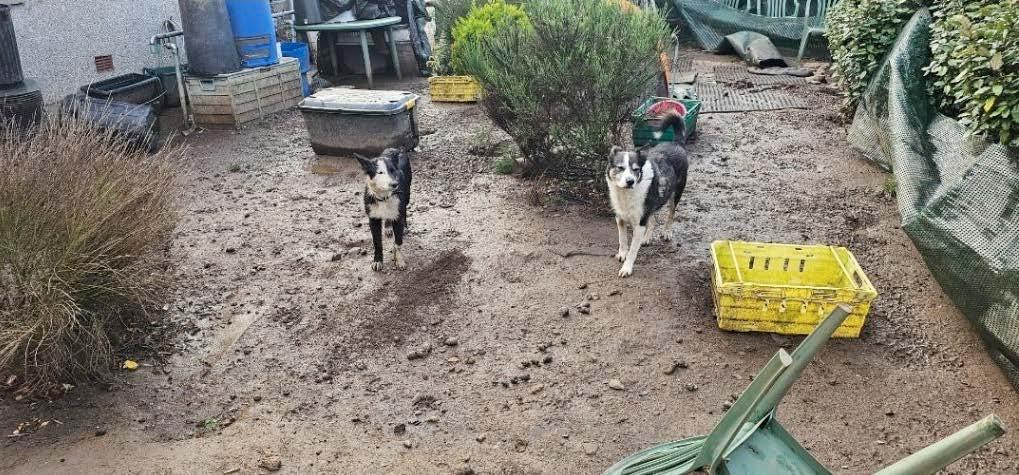
A NEYLAND man has been remanded in custody following a serious assault in Milford Haven at the weekend.
Benjamin Cullen, aged nineteen, of Gordon Parry Road, neyland, appeared before Haverfordwest Magistrates’ Court on Monday (nov 10) charged with assault occasioning
actual bodily harm after an incident on Charles Street late on Saturday night (nov 8).
The court heard that the victim, nicholas Hammond, was taken to hospital with injuries not believed to be life-threatening.
Cullen did not formally enter a plea.
The case was committed to Swansea Crown Court, where he is due to appear on Monday, november 24.
He was remanded in custody after magistrates heard details of his previous record and concerns that he may offend or interfere with witnesses if released on bail.
A second man, aged thirty-six, was also arrested in connection with the incident and has been released on bail pending further enquiries.
Police and ambulance crews attended the scene at around 11:30pm on Charles Street, which remained closed for several hours during the investigation.

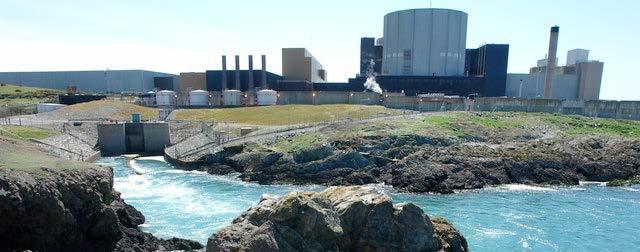
WYLFA on Anglesey has been chosen as the site for the UK’s first small modular reactor (SMR) nuclear power station — a landmark decision welcomed across the political spectrum but met with calls to ensure that local people benefit from the investment.
The announcement, made on Thursday (nov 13), was described by Labour as “proof that two Labour governments working together are delivering for Wales.” The project is expected to create thousands of skilled jobs, attract billions of pounds in investment, and re-establish Anglesey as a hub for energy generation.
Welsh Labour said the move marks the start of a new era for clean energy, aligning with its target of meeting 100% of electricity demand from renewables by 2035.
A spokesperson said: “The Welsh Labour Government is seizing the green opportunities of the future, making the most of our landscape, and taking action to deliver clean energy, good jobs, and cheaper bills. This is Labour’s vision for renewable energy — made here in Wales.”
The party highlighted recent initiatives
Tom Sinclair editor@herald.email
including Trydan Gwyrdd, a publiclyowned renewable developer aiming to power 350,000 Welsh homes with new wind farms by 2030, and Ynni Cymru, which supports local hydro and solar energy projects.
Anglesey Council Leader and Economic Development portfolio holder, Councillor Gary Pritchard, welcomed the decision, calling it “an important step forward for new nuclear build on Ynys Môn.”
He said: “If, as we hope, these plans come to fruition – it will mean economic certainty and prosperity for decades to come. Despite past disappointments, we remain committed to hosting a new nuclear on the condition that it delivers long-term transformational benefits – in terms of local jobs, supply chain opportunities, and prosperity for our communities and residents.”
Anglesey’s Chief Executive, Dylan J. Williams, added that the development could “transform the economy of Ynys Môn, particularly the north of the Island and north Wales,” but stressed that the
council would “work to mitigate negative impacts” on local residents and ensure “the voices of north Anglesey are fully taken into account.”
Welsh Liberal Democrat Westminster Spokesperson David Chadwick MP said he welcomed steps to improve energy security but warned against the use of outside contractors.
“I welcome any moves to improve our energy security, but this must translate into real jobs for local people, not outside contractors flown in for a few years,” he said.
“The focus should be on training, apprenticeships, and long-term opportunities that strengthen communities. Wales has the natural resources to lead a green energy revolution through tidal energy and offshore wind, but we need to see this same level of investment extended to projects like the Swansea Bay Tidal Lagoon.”
UNITE: “A STEP FORWARD BUT A MISSED OPPORTUNITY”
Trade union Unite said the announcement was welcome but criticised the government for not opting
for a larger gigawatt-scale nuclear station at Wylfa.
General secretary Sharon Graham said: “Unite is a strong supporter of the development of SMRs, but a failure to support a giga-watt nuclear power station at Wylfa would be a huge missed opportunity in securing the UK’s energy security.
“The UK is crying out for a joinedup energy strategy that ensures longterm energy security while maximising well-paid, highly skilled jobs for British workers.”
Unite national officer Simon Coop added: “While there are several places where SMRs could be sited, Wylfa is by far the best placed for a giga-watt nuclear power station. This would bring substantial jobs and investment to Anglesey.”
UK: “LONG OvERDUE”
Reform UK Wales also welcomed the news but accused successive governments of dragging their feet.
A spokesperson said: “This announcement is long overdue and, if the political will had been there, we could have been well on our way to generating nuclear power from Wylfa by now.
“With energy costs soaring and unemployment rising in Wales, we should be taking a lead on nuclear power, not dawdling as we have done now for many years. Sadly, lukewarm support from Plaid Cymru for nuclear has also played a role in slowing this down.”
The original Wylfa nuclear Power Station, near Cemaes, provided stable employment from the 1960s until its decommissioning in 2015. If the new project goes ahead as planned, it would mark the revival of one of Wales’ most iconic industrial sites — bringing new life and purpose to Anglesey’s north coast.
However, with questions over scale, local employment, and community impact still to be resolved, the challenge now is to ensure that Wylfa’s future truly delivers for the people of Wales.
POLICE have arrested two men on suspicion of rape and false imprisonment following a serious incident on Main Street, Pembroke, on Sunday morning (nov 9).
Dyfed-Powys Police said officers were called at 9:45am to reports of a woman in distress at a property above Mehfil’s Indian restaurant. The woman was taken to hospital by ambulance.
Two men, aged 36 and 27, were arrested at the scene. They have since been released on bail while police enquiries continue.
Officers remained outside the premises for much of the morning, with several police vehicles and ambulances attending. A cordon was placed around the entrance to Willings Walk shopping arcade as forensic work was carried out.
The Herald understands that the woman’s condition is stable, and police have confirmed that an investigation into the incident is ongoing.
Anyone with information is asked to contact Dyfed-Powys Police, quoting reference DP-20251109-132.
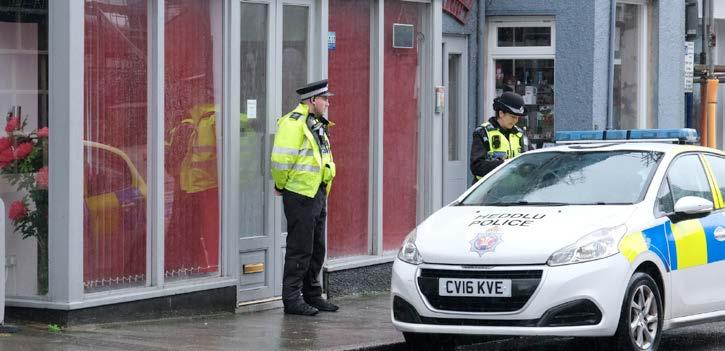

A PEMBROKESHIRE teenager
who took her life while suffering from a psychotic episode might still be alive today had she been prescribed anti-psychotic medication and given a proper safety plan, a coroner has concluded — more than three years after her mother successfully fought a judicial review to secure a full inquest.
Sixteen-year-old Kianna Patton was found dead at the derelict Commodore Hotel in Pembroke Dock on October 24, 2019. The inquest, which concluded on Thursday (nov 13), found that serious
failings in her mental health care “probably contributed” to her death.
Tom Sinclair editor@herald.email
The inquest heard that Kianna first came to the attention of mental health services in January 2018, when her GP referred her to the Child and Adolescent Mental Health Service (CAMHS) after she

reported self-harming and experiencing panic attacks.
In May 2018, she took an overdose of Tramadol and told doctors she wanted to die. She was referred again to CAMHS and prescribed antidepressants. By December 2018, she was discharged after being assessed as no longer posing a risk to herself.
By mid-2019, Kianna had left the family home to live with friends in a household where cannabis was used. Her mother, Joanne Patton, repeatedly raised concerns with both police and social services but said she was “passed from one to the other”.
In September 2019, Kianna told her GP she had been hearing voices for several months and feared she was
developing schizophrenia. The GP made an urgent referral to CAMHS.
An assessment later that month classed her as “low risk”, despite her describing intense sadness and auditory hallucinations. She had stopped taking antidepressants, and there was a known family history of schizophrenia — but no anti-psychotic medication was prescribed.
On October 14, Kianna told clinicians she had thoughts about ending her life but would not act on them. On October 21, she reported hearing voices telling her to “off herself”. Two days later she went missing, and on October 24, police found her body at the abandoned hotel.
Independent psychiatrist Dr Joana Sales told the inquest that while early treatment was reasonable, there was
The High Court in Cardiff ruled in 2022 that the first coroner’s decision on Kianna Patton’s death was wrong in law — forcing a full reinvestigation.
Mrs Justice Hill decided that the earlier ruling failed to properly consider whether public bodies had a legal duty to protect Kianna’s life under Article 2 of the Human Rights Act. That duty requires the state to have effective systems and safeguards in place to protect vulnerable people.
The court said coroners must look not only at what happened to an individual, but at whether the systems meant to protect them actually worked. That means an inquest can now ask wider
questions — about how health services, social services and police handled the case — not just how the person died.
The original coroner decided that Article 2 didn’t apply because Kianna was living with friends and not formally “in care.” The High Court said that was too narrow. Even though she had a roof over her head, the question was whether that home was safe and suitable, given her mental health problems and cannabis use there.
If the council had a duty to provide her with different accommodation under the Social Services and Well-being (Wales) Act, that could have made her a “lookedafter child,” triggering extra protection
and a detailed support plan.
The ruling meant the coroner had to reopen the case and look again at whether the council, health board and police systems were strong enough to protect vulnerable teenagers like Kianna. It also required the coroner to explain decisions clearly and give reasons families can understand.
The case sets an important precedent for Wales and beyond. It shows that when a vulnerable young person dies in the community — not in hospital or custody — the state can still be held to account if systems, communication or safeguarding break
down.
It also means families in similar cases can get proper legal representation and a wider inquiry into what went wrong, rather than being told it was an isolated tragedy.
• The High Court overturned the coroner’s earlier ruling.
• Councils must show how they decide if accommodation for a child is suitable.
• Article 2 can apply even when someone isn’t detained.
• Families now have stronger rights to a full, transparent inquest.
“no effective safety plan” in place in the weeks before Kianna’s death. She said the failure to prescribe anti-psychotic medication or involve a crisis team left a vulnerable teenager managing complex symptoms alone.
Dr Sales added that Kianna’s cannabis use may have worsened her psychosis, but appropriate medication could have stabilised her condition within days. A structured safety plan, she said, could have prevented her death.
Pembrokeshire Coroner Gareth Lewis accepted those conclusions, ruling that the failure to prescribe medication and put a safety plan in place “probably contributed” to Kianna’s death.
He found that she died by hanging on October 23, 2019, her mind disturbed by untreated psychotic symptoms. The coroner noted that Hywel Dda University Health Board has since taken steps to address several of the failings identified through an internal review.
Mr Lewis said there was “no act or omission” by Pembrokeshire County Council that would likely have changed the outcome but extended his “deepest sympathies” to Kianna’s family and thanked all who took part in proceedings.
The full inquest only took place after Kianna’s mother launched a judicial
review challenging the coroner’s original decision not to hold an Article 2 inquest — one that examines whether state bodies failed in their duty to protect life.
In June 2022, Mrs Justice Hill ruled in R (Patton) v HM Assistant Coroner for Carmarthenshire & Pembrokeshire that the earlier decision was legally flawed and must be reconsidered. The High Court found the coroner had not properly examined whether health and social services had a statutory duty to safeguard Kianna under the Social Services and Well-being (Wales) Act 2014.
The judgment was seen as a landmark case for defining how Article 2 of the European Convention on Human Rights applies to vulnerable young people at risk of self-harm.
Mrs Patton’s determination led to renewed scrutiny of how agencies share information between health, social services, and police. The High Court’s intervention ensured that her daughter’s death was not dismissed as an isolated tragedy, but examined as evidence of wider systemic failures in child mental health care and safeguarding across Wales.
Her fight for answers is a powerful example of how one family’s persistence can expose critical gaps in public services and help drive change.

THE DEATH of sixteen-yearold Kianna Patton is a tragedy that should shake every public body in Wales to its core. A bright, vulnerable girl lost her life while experiencing a psychotic episode, and the inquest has now exposed what too many families already know: our local mental health services are simply not good enough.
This is not a comfortable truth, but it is one we must face directly. If we soften it or look away, we allow the same failures to continue.
A system full of cracks, and a child fell through every one
For years, people in Pembrokeshire have been raising concerns about long waiting lists, poor communication between agencies, young people slipping between thresholds, and a lack of crisis support that leaves families terrified and alone. Kianna’s case shows what happens when those cracks are left to widen.
A teenager reporting hallucinations, despair, and voices telling her to harm herself, yet no anti-psychotic medication, no crisis referral, and no meaningful safety plan.
A mother begging for help, yet finding herself passed between agencies as if her daughter’s life were
Tom Sinclair editor@herald.email
an administrative inconvenience.
These are not isolated issues. They are signs of a system that is overstretched, under-resourced, and far too slow to recognise when its own processes are failing.
What sets this case apart is not only the failings that preceded Kianna’s death, failings the coroner says probably contributed to the outcome. It is the extraordinary determination of her mother, Joanne Patton.
Most grieving parents would struggle simply to cope. Joanne found the strength to challenge the system itself. She took the matter to the High Court and won a judicial review that overturned the original decision and secured the full, Article 2 inquest her daughter deserved. Without her persistence, the public would never have learned the full circumstances.
It should never be necessary for a mother to drag public bodies to court in order to obtain basic accountability. Yet that is exactly what happened.
The judgment in R (Patton) v HM Assistant Coroner is more than a legal technicality. It is a warning. It clarified how the duty to safeguard life applies to vulnerable young people and exposed the gaps between health services, social services, and the law.
Joanne Patton’s fight did not only secure justice for her own daughter. It strengthened the protections around every other vulnerable child in Wales. Very few people can say they have changed the law for the better. She can.
Hywel Dda University Health Board has said that several failings have since been addressed. That is welcome. Pembrokeshire County Council has been cleared of any act or omission that would have changed the outcome. But this does not mean the wider mental health system is functioning properly.
Every parent in West Wales knows the struggle of trying to obtain timely, effective help for a child in crisis. It is a
battle when it should be a lifeline. If the lessons from this case are not acted upon with urgency, then nothing will change. The next inquest will simply repeat what we already know: that vulnerable young people continue to be failed while public bodies offer the same promises of improvement.
Despite the heartbreak, there is still hope.
There is hope in the legal safeguards strengthened by the High Court. There is hope in a mother who refused to accept silence.
There is hope that Kianna’s death will finally force a serious examination of youth mental health provision in Wales.
We owe it to her, and to every child like her, to ensure these hopes lead to real change. The question now is whether the services responsible for protecting our most vulnerable are willing to rise to that responsibility. It should not take a grieving mother to expose what is broken. We cannot allow another parent to stand in her place, fighting alone for answers that should have been provided without a struggle.

A PEMBROKE DOCK man who crashed a Jaguar into several parked vehicles before fleeing the scene has admitted a string of driving offences.
Christopher Rees, 35, of Lewis Street, appeared before Haverfordwest Magistrates’ Court on Wednesday (nov 12) where he pleaded guilty to three charges — aggravated vehicle taking, failing to stop after an accident, and driving without insurance.
The court heard that on May 25 this year, Rees took a white Jaguar xE without the owner’s consent and drove it through Gwyther Street, Pembroke Dock. During the incident, the vehicle was involved in a collision that caused extensive damage to three parked cars — a black MG ZS, a silver Toyota Yaris and a white VW Caddy — with total damage estimated at more than £5,000. Rees failed to stop at the scene or
report the crash to police within the 24hour legal requirement. When arrested, it was also found that he was uninsured to drive the vehicle.
Magistrates were told that the case was being linked to a Crown Court matter, and sentencing has been adjourned until november 28 at Llanelli Magistrates’ Court, where Rees will appear via video link. He remains in custody until that hearing.
Sian Vaughan prosecuted for CPS Wales, while Mike Kelleher represented Rees.

A MILFORD HAvEN man has been given a year-long community order and banned from contacting his former partner after admitting to a week-long campaign of harassment.
Liam Whatling, 30, of Belfrey Close, Hubberston, appeared before Haverfordwest Magistrates’ Court on Wednesday (nov 12) charged with harassment without violence, contrary to Section 2 of the Protection from Harassment Act 1997.
Between August 5 and August 12 this year, Whatling bombarded a female with numerous messages and attended her address on one occasion.
He pleaded guilty at the first hearing, with the court taking his early plea into account during sentencing.
Magistrates imposed a 12-month community order requiring Whatling to complete up to 15 days of rehabilitation activity.
A restraining order lasting until November 11, 2026, was also imposed.

Under its terms, Whatling must not contact the woman directly or indirectly, except through a solicitor or social services representative when seeking access to his child. He is also prohibited from entering within 100 metres of any address where she lives or posting any content online referring to her.
The case was prosecuted by Sian Vaughan for CPS Wales (South West), with Mike Kelleher representing the defence.
AN 84-year-old convicted Pembrokeshire sex offender faces another custodial sentence after breaching a Sexual Harm Prevention Order imposed following his previous conviction.
On October 2, police officers discovered that Barry Hollingsworth, of Slade Park, Haverfordwest, was in possession of a new mobile phone.
Despite being a registered sex offender and subject to a Sexual Harm Prevention Order, Hollingsworth had failed to register the device with police as required.
Crown Prosecutor Sian Vaughan told Haverfordwest Magistrates’ Court that further investigation revealed a text message from Vodafone confirming that Hollingsworth had requested a
‘pay-as-you-go’ SIM card for the phone.
Ms Vaughan described Hollingsworth as a persistent breacher of his Sexual Harm Prevention Order, noting that his last breach resulted in a 27-month custodial sentence.
This week he pleaded guilty to the latest breach, and the court was told that he now faces a further custodial term of at least 12 months.
Following submissions from both the Crown Prosecution Service and the court’s senior legal manager, nathan Chapman, magistrates declined jurisdiction on sentencing. Hollingsworth will be sentenced by a judge at Swansea Crown Court on november 25. He was released on unconditional bail.
POLICE and ambulance crews were called to Milford Marina at around 8:10pm on Thursday (Nov 6) after reports that two women were in the water near the Ty Hotel.
Both women were recovered safely from the water by emergency services and taken to hospital for assessment.
A Dyfed-Powys Police spokesperson said: “Police were called at 8:10pm, Thursday, November 6 to a report that two women were in the water at Milford Marina. Both were recovered from the water and taken to hospital. One was later arrested on suspicion of a public order offence.”
The Herald witnessed a large emergency response, with two ambulances, an ambulance response vehicle and five police vehicles attending the scene.
The Angle Lifeboat was initially tasked by stood down, the RnLI confirmed.
A woman, wrapped in a towel and visibly cold, was seen being escorted into a police van by officers shortly before 9:00pm.
The incident is now under investigation.

SENTENCING has been adjourned for a Tenby man who admitted making indecent images of children.
David Michael Frazer, aged 33, of Highlands, Highlands Lane, Manorbier newton, appeared before Haverfordwest magistrates on Tuesday (nov 11).
Frazer had earlier indicated guilty pleas on October 21 to two charges of making indecent photographs or pseudo-photographs of children, contrary to section 1(1)(a) of the Protection of Children Act 1978. The offences took place between April
2023 and March 2024 and involved Category A and B images.
Crown prosecutor Sian Vaughan told the court that the offences were too serious to be dealt with by magistrates and requested a presentence report ahead of sentencing.
The case was adjourned for a presentence report to be prepared.
Frazer, represented by Alaw Harries of DJG Solicitors, was released on unconditional bail to return to Haverfordwest Magistrates’ Court on Tuesday (nov 18) at 10:00am for sentencing.
A HAvERFORDWEST man has been fined after admitting to damaging a car wing mirror belonging to a woman in the town earlier this year.
Luke Owen, 33, of Wayside Close, Simpson Cross, appeared before Haverfordwest Magistrates’ Court on Tuesday (nov 12), where he pleaded guilty to criminal damage.
The court heard that on May 7, 2025, Owen damaged the wing mirror of a black Peugeot 2008.
Prosecutor Sian Vaughan said the damage was minor, and a victim personal statement was not presented to the court as the complainant had since retracted it.
Owen, represented by Mike Kelleher of Welch & Co Solicitors, was fined £40.
He was also ordered to pay £20 in compensation, £85 in prosecution costs, and a £16 victim surcharge.
Magistrates allowed the fine to be deducted from Owen’s benefits.

A PEMBROKE man has received a suspended prison sentence after admitting to sexually assaulting a woman in Lamphey.
Keith Sillence, aged 71, of Lowless Close, Pembroke, appeared before Haverfordwest Magistrates’ Court on Tuesday (nov 12) for sentencing after pleading guilty to sexual assault on a female, contrary to section 3 of the Sexual Offences Act 2003.
The court heard that on november 23, 2024, Sillence intentionally touched
a woman aged 16 or over in a sexual manner without her consent and without a reasonable belief that she was consenting.
Magistrates imposed a 36-week custodial sentence, suspended for 24 months, noting that the offence was so serious that only a custodial sentence could be justified. However, the court accepted there was a realistic prospect of rehabilitation and took into account Sillence’s caring responsibilities for his wife.
As part of the suspended sentence order, he must complete up to 25 days of rehabilitation activity and pay £500 compensation to the victim, along with £650 in prosecution costs and a £187 victim surcharge.
Sillence was placed on the Sex Offenders Register for ten years and must report to Haverfordwest Police Station.
A restraining order was made prohibiting him from contacting or approaching the victim, or entering any premises where she lives or works, including CK’s in Lamphey. The order will remain in force until november 11, 2027.
Magistrates said the order was necessary and proportionate to protect the victim, whose personal statement was read to the court by the prosecutor.



A NEW digital storytelling project launched by Welsh broadband company Ogi is shining a spotlight on the real stories of modern Wales — including one rooted in Milford Haven — after new research revealed nearly half of people in Wales feel misrepresented on screen.
Broadcaster and filmmaker Jonny Owen has voiced the first chapter of “Local Legends”, a collection of short
films capturing community spirit, humour and resilience across the nation. The series was developed in response to Ogi’s survey which found that forty-five per cent of people in Wales feel disconnected from how Welsh identity is portrayed in TV and film, with two-thirds saying the version of
Wales they recognise is “invisible”.
Earlier this year, people across Wales were invited to submit their own real-life stories. From these, three tales have been selected and brought to life on film: A Mountain Comeback – Cwmaman
The story of Mike from Cwmaman, who believed his hiking days were behind him after being diagnosed with MS. A community effort helped him achieve something he never expected — a remarkable ascent of Pen y Fan.
A chaotic rugby tour in the former Czechoslovakia turned into a triumph of pure teamwork after a mechanical problem with a bus forced the squad to improvise and pull together.
An inspiring incident from Milford Haven that sparked an unexpected journey of strength, determination and community pride — and went on to demonstrate
Welsh grit on the world stage.
Owen said the aim of the project was simple: to show Wales as it is lived every day, not as it is often portrayed.
“These stories are funny, moving and completely real,” he said. “They show Wales today — communities coming together, people finding their place, and that brilliant mix of pride and humour we do so well.”
Ogi says the project is part of its mission to reflect the communities it serves through its broadband rollout across Wales.
Sarah Vining, Brand Marketing Director at Ogi, said: “Local Legends shines a light on the everyday moments that make Wales extraordinary. It’s about connection — both online and off — and celebrating the voices that make this country what it is.”
The first films are now available to watch at ogi.wales/local-legends, and the public is being invited to submit further stories as the collection grows during 2025.




SPECULATION continues to swirl around the future of Penally Camp, but the Home Office has reiterated this week that there are “no current plans” to use the site for asylum accommodation.
The clarification comes after renewed online rumours suggested the former military facility could once again be used to house asylum seekers.
A Home Office spokesperson told The Herald that while the department keeps “all accommodation options under review”, there are “currently no plans to reopen the Penally site.”
The statement follows a letter sent on November 4 by local Senedd Member Samuel Kurtz to the Home
Tom Sinclair editor@herald.email
Secretary, expressing “strong opposition” to any potential reuse of the camp.
Mr Kurtz cited the highly critical independent reports from its previous operation, which described conditions as “filthy,” “run-down,” and “unsuitable for long-term accommodation.”
He added that reusing the camp would “reopen old wounds” for the local community and risk repeating mistakes that should not be repeated.
Penally Camp, which closed as a military facility in late 2022, was formally put up for sale in August 2023.
An “early stage observations application” for proposed residential redevelopment has been submitted to the Pembrokeshire Coast national Park Authority and is currently under consideration.
Any change of use would require full planning permission from local authorities.
Speculation follows use of other military sites
The latest speculation has been fuelled by confirmation that the UK Labour Government is using other military sites — including Cameron Barracks in Scotland and Crowborough Training Camp in England — to accommodate asylum seekers as part of efforts to reduce reliance on hotels.
Despite that wider policy, officials stress that no new decision has been made about Penally.
For now, the site remains on the market, with its future hinging on whether private redevelopment plans progress through the planning system — or whether the government later decides to revisit it as an “option under review.”
A GOODWICK man has been found guilty of drug-driving after previously failing to appear at court.
Marc Barber, aged 41, of Monarch House, Dyffryn, appeared before District Judge M Layton at Llanelli Magistrates’ Court on Thursday (Nov 6).
The court heard that Barber had driven a vehicle in March with a controlled drug in his system exceeding the prescribed
limit. He initially denied the charge when he appeared in court in September but was convicted following a trial.
The case had been delayed after Barber failed to surrender to bail on a number of occasions, leading to warrants being issued for his arrest.
Barber was convicted of the drugdriving offence and the case was adjourned for sentencing.



POULTRY and bird keepers across Wales will be legally required to house their birds from Thursday (Nov 13) as the Welsh Government introduces strict new measures to contain the growing threat of avian influenza.
The decision follows a sharp rise in cases among both wild and kept birds across Great Britain, prompting warnings about the impact on animal welfare, food production and public health.
REqUIREMENT FROM THURSDAY
From Thursday, all keepers of fifty or more birds of any species must keep them housed.
The same rule will also apply to smaller flocks if eggs or poultry products are sold or given away, because of the increased risk of disease spread through trading or sharing.
The move forms part of the existing Wales Avian Influenza Prevention Zone (AIPZ), which was first introduced in January. Additional biosecurity requirements are also being brought in for the gamebird
Tom Sinclair editor@herald.email
sector, following outbreaks last season.
GOvERNMENT: “DIFFICULT BUT NECESSARY”
Deputy First Minister and Rural Affairs Secretary Huw Irranca-Davies said the decision was not taken lightly but was vital to protect flocks and livelihoods.
He said: “The risk of disease has recently increased further, and Wales is now facing a very high level of avian influenza risk. The decision has not been taken lightly, but it is necessary to protect both our bird populations and the livelihoods of poultry keepers across Wales.”
“I urge all bird keepers to comply with these requirements and maintain the highest standards of biosecurity. By acting now, we can help prevent the spread of this disease and protect our flocks.”
CVO: “Housing is not a substitute for biosecurity”
Chief Veterinary Officer for Wales Dr Richard Irvine warned that while housing birds is a key control measure, strict hygiene and biosecurity remain essential.
“We are seeing a sharp increase in the number of avian influenza cases in kept and wild birds. In the face of very high risk levels, mandatory bird housing measures will now apply across the whole of Wales,” he said.
“Housing measures can help protect birds, but they are not a substitute for stringent hygiene and biosecurity. I urge all keepers to act now, familiarise themselves with the biosecurity checklist online, and report any suspected cases immediately.”
The housing order and AIPZ will remain in place until further notice and will be reviewed regularly by the Welsh Government, working alongside the Animal and Plant Health Agency and the other UK administrations.
A PEMBROKE DOCK man has been fined after being found guilty of speeding and admitting to driving without insurance earlier this year.
Jake Jones, aged 24, of Ferry Terrace, Waterloo, appeared before District Judge M Layton at Llanelli
Magistrates’ Court on Thursday (nov 6).
The court heard that Jones had been caught exceeding the speed limit on February 3 while driving in Pembrokeshire. He initially denied the offence, but was later found guilty after
trial.
He was also charged with using a motor vehicle on a public road without third-party insurance on April 2. On this count, he changed his plea to guilty when he reappeared before the court in September.
The court imposed fines and ordered Jones to pay costs to the Crown Prosecution Service. His driving record was endorsed, but he was not disqualified after the court accepted there were mitigating circumstances.
ANGLE lifeboat volunteers have been called out twice in two days to separate incidents in the Milford Haven Waterway.
The first call came at 6:25pm on Sunday evening (nov 9) following reports of a vessel on fire at Castle Pill. Unsure whether anyone was on board, the all-weather lifeboat was launched immediately and made best speed to the scene.
On arrival, the crew found Mid and West Wales Fire and Rescue Service already in attendance. The vessel was beached, and it was quickly confirmed that no one was on board and no persons had been reported missing.
With no further assistance required, the lifeboat was stood down and returned to station, where it was refuelled and made ready for service by 7:15pm.
Tom Sinclair editor@herald.email
The crew were paged again at 10:30pm on Monday night (Nov 10) to assist a 16foot motorboat with one person on board who was unsure of their position following an electrical failure.
After launching from Milford Docks, the lifeboat quickly located the vessel just off the marina entrance. The skipper explained he had been trying to return to Castle Pill but was struggling to navigate in the dark without power.
The motorboat followed the lifeboat back towards Castle Pill, and once safely inside the Pill, the skipper was content to continue unaided to his mooring.
The lifeboat was stood down and made ready for service by 11:25pm.

A PEMBROKESHIRE boxer has elected to stand trial at Crown Court after being charged with inflicting grievous bodily harm on a man in Haverfordwest.
Callum James, 20, of Bush Street, Pembroke Dock, is accused of wounding and causing grievous bodily harm to Declan Laville during an alleged assault on May 25.
“There was an exchange of words and as Declan Laville walked out, Callum James began shouting and swearing at him,” Crown Prosecutor Sian Vaughan told Haverfordwest magistrates this week.
“When the defendant ran up to Declan, Declan knew at that point that he was going to be hit.”
The Crown alleges that during the assault, Laville was subjected to repeated punches and kicks to the face, placed in
a chokehold, and stamped on the head. Photographs of his injuries were shown to the magistrates.
Ms Vaughan added that James is a local boxer who “used trained fighting” during the attack.
James denies the charge, maintaining that his actions were taken in self-defence.
Although magistrates accepted jurisdiction, James elected for the case to be heard before a jury at Swansea Crown Court.
Proceedings will begin on December 12.
He was released on conditional bail, prohibiting him from contacting Declan Laville or any of his family members, either directly or indirectly, and from making any reference to them or the police investigation on social media.
AN UNPROvOKED attack at the Lord Nelson Hotel in Milford Haven has led to a court appearance for Dock resident Joshua White, who this week admitted assault causing actual bodily harm.
Crown Prosecutor Sian Vaughan told Haverfordwest magistrates: “It was an unprovoked attack on two males, one of whom, Gareth Roberts, sustained considerable injuries to his nose. There is a possibility that he has had to have surgery to straighten his nose.”
The assault took place on the night of
July 24, 2024, at Emma’s Bar within the Lord nelson Hotel, Milford Haven.
Ms Vaughan requested an adjournment to confirm the extent of Gareth Roberts’ injuries and to obtain an updated victim impact statement. The probation service has also been asked to prepare an all-options pre-sentence report ahead of sentencing.
Joshua White, aged 37, of Castle Street, Pennar, is due to return to Haverfordwest Magistrates’ Court on December 2 for sentencing. He was released on unconditional bail.
nEYLAnD man Mark Crane has appeared before magistrates accused of harassing his neighbours and driving dangerously during two separate incidents.
Crane, aged 45, of Honeyborough Grove, neyland, is alleged to have harassed his neighbours over a sixmonth period between January 11 and June 21, 2025.
Prosecutors say Crane repeatedly shouted abuse, swore, and made offensive hand gestures towards the pair during the alleged campaign of harassment.
He also faces a charge of dangerous driving after reportedly driving his Toyota estate car over Ian Lloyd’s foot as Lloyd
was erecting road signs on Hamilton Terrace, Milford Haven, on December 10, 2024.
Crane appeared before Haverfordwest Magistrates’ Court this week, where he elected to stand trial at Crown Court, despite magistrates indicating they were prepared to hear the case.
His case was committed to Swansea Crown Court, where proceedings are due to begin on December 12.
Crane was released on conditional bail. He must not contact the complainants directly or indirectly, must not go to their address at Honeyborough Grove, and must refrain from making any gestures or comments towards them.
A PEMBROKESHIRE support worker has been banned from driving after being involved in a twovehicle collision in Haverfordwest while over the legal drug-drive limit.
Police were called to Pembroke Road at around 6:30pm on June 13 after a Hyundai i10 collided with another vehicle. At the scene, officers found the Hyundai’s driver, Sarah
Richards, aged 54.
A roadside drugs test proved positive, and subsequent blood analysis at the police station showed Richards had 3mcg of Delta-9 tetrahydrocannabinol — the active component of cannabis — in her system. The legal limit is 2mcg.
“The defendant was not the cause of the accident, and the other driver is now under investigation for what took
place,” Richards’ solicitor, Jess Hill, told Haverfordwest magistrates after Richards entered a guilty plea.
“She was driving to her mother’s home as she needed to put her mother to bed, as she will soon require round-the-clock care. Without her driving licence, this will no longer be possible.”
Hill added that the mandatory driving ban was likely to result in the
loss of Richards’ employment, as she relies on her car to travel to and from her job supporting adults with learning disabilities.
Richards, of Grassholm Place, Broadway, Broad Haven, was disqualified from driving for 12 months. She was fined £440 and ordered to pay £176 in surcharge and £85 in prosecution costs.
A FORMER hotel in Pembroke Dock that was badly damaged by fire has been listed for online auction with a guide price of just £10,000.
The property, known as The Commodore Hotel, sits on Admiralty Way within a site of around 1.38 acres. Once a busy venue, it now offers significant redevelopment potential— subject to the necessary planning permissions.
The site is within easy reach of Pembroke Dock town centre, with good transport links including the nearby railway station. South Pembrokeshire Golf Club is also just a short distance away.
The building is being sold by auctioneers Under the Hammer, with bidding set to open on Wednesday, november 19.
Due to access restrictions imposed by the current occupant, the auctioneer has been unable to carry out an internal inspection of the building. As a result, details about the layout, accommodation and condition have been supplied by the seller and remain unverified.
Under the Hammer advises all prospective buyers to download the legal pack, carry out their own checks, and seek independent advice before making an offer. The property is being sold “as seen,” and anyone

information, register to bid, or make a pre-auction offer via the Under

A PEMBROKE man has denied possessing an offensive weapon after police found him with a hurling stick outside his home.
Jack Morgan, aged 30, of The Green, Pembroke, appeared before Haverfordwest Magistrates’ Court this week charged with possessing an offensive weapon in a public place.
The court heard that Morgan was arrested at his home on november 7 after police were called to an incident involving several men outside the property.
Defending, solicitor Jess Hill told magistrates that Morgan had only armed
himself out of fear.
“Four males were beating on the door and the police were called, but there was a delay,” she said. “Jack Morgan was under considerable fear, so the hurling stick was for his protection.” Morgan entered a plea of not guilty. The case was adjourned until December 22 for trial.
He was released on conditional bail requiring him to live and sleep at his home address, observe a curfew between 8:00pm and 8:00am, and have no contact with the prosecution witness.


A MOTHER-OF-THREE from Pembroke Dock who defied the odds to qualify as a nurse has won a prestigious Wales Care Award.
Sarah Lees, 47, was honoured with the Silver Award in the Independent Sector nurse of the Year category at this year’s ceremony, held at Cardiff’s Holland House Hotel.
Described by colleagues as “a champion in social care who transforms the lives of those around her”, Sarah was praised for her inspirational journey and her impact on residents and staff at Shaw Healthcare’s Cartref Cleddau care home.
Sarah, who is also due to receive her Queen’s nurse badge and certificate at a ceremony in London this month, completed her nursing qualification at Oxford Brookes University as a mature student while going through a divorce and caring for her three children — one with learning difficulties and another with ADHD.
“It required a lot of juggling,” she said. “Looking back now I don’t know how I got through my course, but I had lots of help around me which I’m so grateful for.”
After several years working as a carer, Sarah decided to train as a nurse to enhance her knowledge and influence the direction of care. She joined Cartref Cleddau in 2019 as deputy manager and was promoted to service manager in 2021.
Among her proudest achievements is transforming the home’s care provision so that residents with dementia can now receive “whole of life care” without having to move elsewhere.
She explained: “Previously, a dementia diagnosis meant residents had to move, which caused huge

Tom Sinclair editor@herald.email
disruption. That’s no longer the case — all staff are now fully trained to care for people with dementia, keeping their care stable and secure.”
Outside work, Sarah enjoys reading and spending time with her three dogs, who love chasing a ball along the nearby beach.
Sean Tregonning, Head of Marketing and Communications at Shaw Healthcare, said: “Sarah doesn’t just manage a care home — she transforms lives, those of her
residents, their families, and the staff she mentors. When she took on the role, morale was low and many beds were empty. Through her drive and compassion, the home now has a waiting list and a happy, motivated team.”
Mario Kreft MBE, Chair of Care Forum Wales, said the awards celebrate the “unsung heroes and heroines” who make a vital difference to vulnerable people’s lives
He added: “The Wales Care Awards underline the importance of the sector – it’s the glue that binds our communities together. Our mission
has always been to stand up for the workforce and ensure their dedication is properly recognised.”
A poignant moment came when Mair Elis-Thomas, widow of the late Lord Dafydd Elis-Thomas, presented one of the evening’s awards in tribute to her husband’s long-standing support for the social care sector.
“Dafydd was a passionate believer in the power of the arts to enrich lives and support wellbeing,” said Mr Kreft. “He is greatly missed, but his legacy lives on through his immense contribution to public life and his impact on communities across Wales.”
A MONKTON man has been fined for using a mobile phone while driving.
Jadey Frank Hearn, aged 40, of Castle Quarry, Long Mains, appeared before Haverfordwest Magistrates’ Court on Thursday (Nov 6) charged with using a handheld mobile phone while driving on July 30 this year.
Hearn denied the offence but was found guilty after trial. The case was prosecuted by Dyfed-Powys Police, with nia James appearing for the prosecution.
Magistrates imposed a £280 fine and ordered Hearn to pay costs to the Crown Prosecution Service. no driving endorsement was imposed.
The bench was chaired by Mrs C Kendrick, sitting with Dr R TalbotEnglish and Mrs J Davies.

THE UK prison system could face “collapse” under new visa rules that risk forcing thousands of officers out of work – a warning that could have serious implications for HMP Parc in Bridgend, already struggling with chronic staff shortages and mounting criticism over safety.
Confidential data obtained by ITV News shows more than 2,600 prison staff across England and Wales are foreign nationals working on right-towork visas.
Under Home Office rules introduced in July, anyone earning below the new £41,700 salary threshold may be unable to renew their visa and could face deportation when it expires.
A source within His Majesty’s Prison and Probation Service said around 2,200 of those affected are frontline officers, with the rest in administrative and support roles.
Starting salaries for prison officers range from £33,750 to £44,500, meaning many will fall below the new threshold – particularly those based outside London.
The Prison Officers’ Association has warned that the loss of so many experienced officers could “totally destabilise” the prison estate.
n ational chair Mark Fairhurst said: “We simply cannot afford to lose that many frontline staff. If the government does not exempt the prison service from the new salary thresholds, many prisons will not be able to function.”
The Prison Governors’ Association added that the loss of these workers would “leave a gap that cannot easily be filled,” calling the change “shortsighted and damaging”.
Although the Home Office has not released prison-by-prison figures, G4S run HMP Parc – Wales’s largest
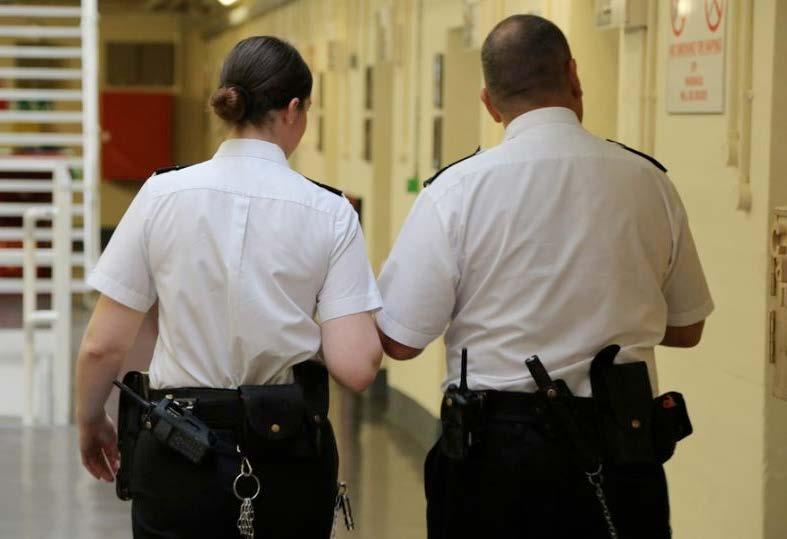
Tom Sinclair editor@herald.email
jail housing many prisoners from Pembrokeshire – is believed to recruit beyond the local labour market to fill vacancies.
Inspection reports have repeatedly highlighted problems with staff turnover, reliance on agency officers, and pressures caused by overcrowding and record numbers of deaths in custody.
If even a small number of Parc’s officers were affected by the new visa threshold, insiders warn it could “make a bad situation worse” at a prison already under strain.
A PEMBROKE DOCK woman has been found guilty of owning a fighting dog — and a warrant has been issued for her arrest after she failed to attend court for the verdict.
Elisha Callen, aged 26, of Glenview Avenue, denied possessing or having custody of a fighting dog, contrary to the Dangerous Dogs Act 1991. The offence took place on July 26 this year.
Callen had pleaded not guilty at an earlier hearing in July, but was found
guilty in her absence following a trial before Haverfordwest Magistrates’ Court on Thursday (Nov 6).
The case was prosecuted by CPS Wales (South West), with n ia James appearing for the Crown. Callen was represented by Liam Francis of DJG Solicitors.
Magistrates issued a warrant for her arrest without bail.
The bench was chaired by Mrs C Kendrick, sitting with Dr R TalbotEnglish and Mrs J Davies.

THE ALL-WEATHER lifeboat was launched at 6:15pm on Sunday (Nov 9) after HM Coastguard received reports that several cockle boats were in difficulty near Ferryside, around 13 miles north-east of Tenby.
The volunteer crew made best speed to the area, joining Burry Port Lifeboat, Ferryside Lifeboat, Rescue Helicopter 387, and Llansteffan Coastguard Rescue Team in a coordinated search.
Ferryside lifeboat quickly located
Tom Sinclair editor@herald.email
two cockle boats and assisted them safely ashore, while other lifeboats, the helicopter, and shore-based teams continued to search for any further vessels in distress.
With no additional boats found and no further reports of difficulty, all search assets were stood down and returned to station. Tenby lifeboat arrived back at 9:00pm.

A PEMBROKE woman has been sentenced for a string of theft and burglary offences.
Alisha Stokes, aged 31, of Devon Drive, appeared at Haverfordwest Magistrates’ Court on Thursday (nov 6) to admit three offences committed between April 2024 and June 2025.
The court heard that Stokes pleaded guilty to burglary other than a dwelling on two occasions — the first on April 24, 2024, and the second on June 19, 2025. She also admitted theft from a shop committed on April 19, 2024.
All three offences were prosecuted by CPS Wales (South West). Stokes was represented by Alow Harries of DJG Solicitors.
The bench was chaired by Mrs C Kendrick, sitting with Dr
English and Mrs
Magistrates ordered her to pay £117 in compensation and costs to the Crown Prosecution Service. no separate penalty was imposed for the other offences.
Davies. The Herald understands the offences are linked to a pattern of low-level thefts across the Pembroke area earlier this year.
HYWEL DDA University Health Board is urging people across west Wales to take part in the final weeks of its public engagement on a refreshed long-term health and well-being strategy.
The nine-week programme, which began on September 26 (2025), has gathered feedback from hundreds of residents in Carmarthenshire, Ceredigion and Pembrokeshire. The aim is to update the Health Board’s “A Healthier Mid and West Wales” strategy so it reflects the changing needs and priorities of local communities.
People taking part have been asked 11 questions about staying well, accessing care, and what improvements they would like to see in local services, nHS buildings and digital healthcare.
COMMON THEMES EMERGING INCLUDE:
• The importance of strong communities, family networks and volunteer support.
• A clear desire for improved access to GP appointments.
• Concerns about long travel distances for rural patients and limited public transport options.
• Interest in more convenient digital support, including wider use of the nHS Wales app, alongside better help for people with poor connectivity or low digital confidence.
• The value of local facilities such as gyms, sports clubs and social groups in keeping people healthy.
Some residents have suggested

Tom
Sinclair editor@herald.email
expanding volunteer driver schemes to help people in isolated areas who struggle to reach appointments.
HEALTH BOARD: ‘YOUR FEEDBACK SHAPES OUR FUTURE’
Professor Philip Kloer, Chief Executive of Hywel Dda University Health Board,
thanked those who had contributed so far and encouraged others to do the same before the deadline.
He said the insights gathered will help ensure future plans “continue to reflect the needs and priorities of the people we serve.”
The Health Board has made several ways available for people to share their views:
• Visit the engagement platform.
• Email or telephone the engagement team.
• Invite Health Board staff to your community group meeting.
• Write to FREEPOST HYWEL DDA HEALTH BOARD.
• Respond to posts on Facebook and Instagram.
The closing date for comments is Friday, november 28, 2025.

INDUSTRIAL tensions at First Cymru have intensified as hundreds of bus drivers across South and West Wales prepare for an extended period of strike action in a long-running dispute over pay.
The walkout, due to begin on november 20 and continue until January 21, will affect depots in Swansea, Port Talbot, Bridgend, Carmarthen, Haverfordwest and Ammanford, covering much of the company’s network across the region.
The union Unite says its members are “furious” that the company has refused to backdate pay from the annual pay review and has instead offered what the union called a “£50 bung payment” to encourage drivers to cross picket lines.
Unite general secretary Sharon Graham said: “First Cymru is trying to take industrial relations back to the dark ages with its refusal to pay
monies owed, attempts at unionbusting to get staff to cross picket lines, and all the while paying some of the lowest wages in the industry.
Unite never stands for such behaviour. First needs to think again about how it is treating its workforce.”
According to Unite, First Cymru currently pays £13.40 an hour, compared with £15 at Cardiff Bus, £15 at Arriva North Wales, £14.44 at Stagecoach, and £14.50 at newport Transport. The union says the company may soon be the only major operator still applying a lower “new starter rate” for the first year of service.
Unite regional officer Alan McCarthy added: “Driving a bus is a highly skilled job, yet First Cymru
A PEMBROKE DOCK man has appeared before magistrates after police discovered a samurai sword inside his home.
When officers visited the basement flat on Bush Street on October 23 for an unrelated matter, they found three swords on display – one of which was deemed to fall outside legal limits.
“The officers discovered three swords, one of which was without the criteria of the legislation,” Crown Prosecutor Sian Vaughan told Haverfordwest magistrates this week.
“This was because the blade was 22 inches long.”
Defence solicitor Alaw Harries told
the court that her client, 34-year-old Mark Briskham, had owned the sword for many years and kept it purely as an ornament.
“It was within his property and not in a public place, which would obviously be much more serious,” she said. “He’s owned the sword for many years, and it’s simply an ornament placed on a stand in a safe place and out of reach.”
After considering the mitigation, magistrates granted Briskham a conditional discharge. He was ordered to pay £85 in court costs and a £26 surcharge. A destruction order was made for the samurai sword.
drivers are treated like second-class citizens. They’ve reached the end of their tether and are struggling to make ends meet. Unite will be backing them every step of the way.”
The union says drivers are seeking a “reasonable” rise that reflects the cost of living and inflation.
In response to the ongoing dispute, First Cymru said it remains committed to reaching a resolution and has made what it described as a “fair and sustainable” pay offer in line with other transport operators.
A company spokesperson said: “We are disappointed that Unite has chosen to escalate strike action rather than continue meaningful discussions. We value our drivers and are keen to reach an agreement that recognises their hard work while ensuring the long-term viability of our services for
passengers and communities across South and West Wales.”
First Cymru is part of the First Group, which reported profits exceeding £200 million last year, with its chief executive receiving more than £3 million in pay and bonuses. The company operates bus services across South and West Wales, including key routes connecting Swansea, Carmarthen, and Haverfordwest.
Previous industrial action earlier this year caused widespread disruption across the region, with some routes reduced or cancelled entirely.
The latest announcement marks a significant escalation in what has become one of the longest-running industrial disputes in Wales’ transport sector this year.

POLICE across Wales have launched a campaign with child protection charity the Lucy Faithfull Foundation to help prevent online child sexual abuse.
Throughout november and December, the four Welsh forces — Dyfed-Powys, Gwent, north Wales and South Wales Police — will work with the charity’s Stop It now campaign to encourage people worried about their own or someone else’s online sexual behaviour to seek confidential help.
In 2024, more than 11,000 people in Wales contacted the Stop It now helpline or used its online self-help services. These included 476 from the Dyfed-Powys area, 816 from Gwent, 622 from North Wales and 3,466 from South Wales.
The figures represent a 34% rise in people seeking help in Wales compared with 2023 — part of a UKwide total of 275,000 people who reached out for support last year.
Viewing sexual images of under-18s or engaging in sexual conversations with under-16s are serious criminal offences that cause lasting harm to children. The campaign aims to raise awareness of these offences and direct people towards early intervention through the anonymous helpline.
Tom Sinclair editor@herald.email
Detective Superintendent Wayne Bevan, Wales Police lead for Child Sexual Exploitation and Abuse, said: “I’m pleased that all four Welsh police forces are supporting the Lucy Faithfull Foundation’s Stop It now campaign and its preventative approach to child sexual abuse.
“Children are spending more and more time online and should be able to do so safely. Unfortunately, there are adults who see gaming and social media platforms as ways to contact young people for sexual purposes. The time it takes for an offender to contact a child online can be shockingly quick.
“While police will always take action where offences are committed, prevention is vital. The Lucy Faithfull Foundation’s work diverts people from offending by providing confidential help before a crime takes place.”
Claire Short, the charity’s Wales Manager, added: “Online sexual offences against children continue to affect communities across Wales. People who offend in this way come from all walks of life — there is no one type of person.
“This campaign raises awareness of the harm caused and, crucially, the

confidential support we offer. We want people who are concerned about their behaviour to contact us before it’s too late. We can help you find a pathway out — anonymously and without judgement.”
Anyone in Wales concerned
about their own or someone else’s sexual thoughts or behaviour towards children can contact Stop It now on 0808 1000 900 or visit www.stopitnow. org.uk for anonymous advice and support. The helpline welcomes calls in Welsh or English.

REHEARSALS are in full swing for this year’s festive pantomime Rapunzel at the Torch Theatre, Milford Haven –and the excitement is already building among the cast and crew.
Local actress and choreographer Freya Dare is returning to the Torch stage to play Zephyr the Puffin, a lively, loveable character set to have audiences wiggling in their seats. Having performed in previous productions, including last year’s Jack and the Beanstalk, Freya says being back on her home stage feels “like coming home.”
Freya, who runs her own theatre company with her mum, Lynda, creates original plays inspired by classic children’s literature, often weaving in environmental messages.
“I started dancing when I was three,” she recalled. “I was always moving and couldn’t sit still. My amazing mam took me to my first dance class, and I just loved that feeling of freedom and joy. When I took part in a project called The Young Americans at The Lyric in Carmarthen, I knew performing was something special.”
Freya believes dance is something everyone can enjoy — whatever their age
or ability.
“Dance is like an extension of language,” she said. “It helps you express what words can’t. It brings people together and creates so much joy. I teach dance classes to people of all ages, from little ones to those in their eighties, and you still see the same happiness in every class.”
This year, Freya not only stars as Zephyr but is also choreographing the entire pantomime — a high-energy show filled with sea-themed numbers, comedy routines and audience participation.
“I start with the music and lyrics for inspiration,” she explained. “Our musical composer James Williams creates an incredible range of songs that really express the characters’ emotions. I build the choreography around that feeling — whether it’s quirky jazz moves for a villain or playful gestures for a comic song.
“Last year I even used sign language in one of the fairy songs for Jack and the Beanstalk, so the audience could join in. It was a brilliant way to connect movement, music and meaning.”
Set around a Pembrokeshire lighthouse, this year’s Rapunzel has a distinct nautical flavour — complete with

puffins, shipwrecks and sea shanties.
“I’m taking inspiration from the sea,” Freya said. “There’ll be some Charlestonstyle rowing, waves of movement, and fun choreography that everyone can copy from their seats. It’s going to be full of energy and laughter.”
Freya previously understudied in Beauty and the Beast and says pantomime season remains the highlight of her year.
“Panto is my absolute favourite season,” she said. “I love seeing audiences let go — shouting out, laughing
and dancing along. It’s so special to be part of people’s Christmas memories. I can’t wait for the fun to begin!”
Rapunzel runs at the Torch Theatre from Saturday 6 December to Sunday 28 December.
Tickets: £24.50 | £20.00 concessions | £78.00 family.
Relaxed Environment Performance: Saturday 13 December, 2:00pm.
BSL Interpreted Performance (Liz May): Tuesday 16 December, 6:00pm.
COUNCIL and Pembrokeshire Leisure have announced that extra support from Activity Wales, through the Long Course Weekend Legacy Fund, will help extend school swimming provision across the county — ensuring that more children and schools receive the help they need most.
The core school swimming programme continues to be funded by Pembrokeshire County Council, providing every primary school in the county with access to this essential life skill.
Thanks to the additional Legacy funding, Pembrokeshire Leisure will now be able to employ an extra qualified swimming instructor to work alongside the existing school swimming instructor.
This will allow for more focused support for schools and pupils who would benefit most, helping to ensure that every child has the chance to become a confident and safe swimmer.
ABOvE-AvERAGE
School swimming lessons offer much more than time in the pool — they provide a purposeful introduction to water, teaching vital swimming, water confidence, and safety skills that children can use throughout their lives.
Pembrokeshire’s commitment to school swimming is already delivering strong results. During the 2024/25 academic year,

62% of children in Years 3–6 achieved the national swimming standard, well above the national average of less than 40%.
In addition, 80% of pupils leaving Year 6 achieved the National Curriculum standard, showing the impact of sustained local investment and dedicated instruction.
Pembrokeshire Leisure and the Long Course Weekend fully support Swim Wales and Water Safety Wales’ belief that all children should have the opportunity to learn to swim and stay safe around water.
Together, they encourage all pupils to achieve the Nofio Ysgol Gold Award — the recognised minimum standard for swimming and self-rescue skills by the end of primary school.
All primary schools in Pembrokeshire currently access school swimming lessons, ensuring that every child in the county has the opportunity to learn this vital life skill.
This collaboration between Pembrokeshire County Council, Pembrokeshire Leisure, Activity Wales and
the Long Course Weekend demonstrates the power of partnership in helping every child thrive, both in and out of the water.
Matthew Evans, CEO of Long Course Weekend, said:
“The results from our Legacy Programme have been nothing short of incredible — a real testament to what can be achieved when communities and partners come together with purpose.
“LCW has become so much more than an event; it’s a platform to give back, to inspire, and to invest in the next generation of Pembrokeshire’s children.
“What Mel [Morgan, PCC Swimming Teacher] and her team have accomplished is truly unparalleled in Wales. This year we’re taking it even further, launching a free open-water swim programme for children — made possible only through the generosity of our athletes and the unwavering support of partners like Hugh James and Princes Gate Water, whose belief in this mission continues to elevate the Legacy Programme to new heights.”
Cllr Rhys Sinnett, Cabinet Member for Residents Services, said:
“Our ongoing partnership with the Long Course Weekend, supported through their legacy funding, has enabled Pembrokeshire Leisure to enhance our school learn-to-swim programme.
“This collaboration has achieved its aim of giving local schoolchildren the best possible opportunity to develop this vital life skill. We are extremely grateful for their contribution, which, alongside our core provision, has allowed us to deliver targeted support that makes a real difference for those most in need.”

A CALL to keep a Pembrokeshire dog training school which has won medals for Wales in international dog agility events has been approved by county planners.
In an application to Pembrokeshire County Council, Kerry Hunt, through agent GMW Design, sought permission to retain a dog training school at Treforfol, Barham Road, Trecwn.
A supporting statement through Johnston Planning, said: “Valley Dog Training is an award-winning
enterprise that has operated from the site since around 2022. The nature of the use is considered to be compatible in policy terms with the host building and appropriate to the wider locality in terms of its wider impact
“The application relates specifically to the large barn with the two smaller structures directly to the east. The main barn houses a dog agility school (Valley Dog Training) and as such

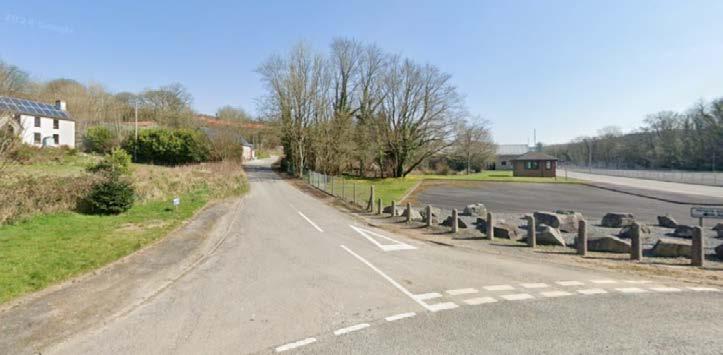
is the main focus of the application whilst the two smaller building provide storage facilities in connection with the business.
“Valley Dog Training is run by Harriet Hunt, the applicant’s daughter, who resides at Treforfal. The business which provides dog agility training has run out of the barns for some three years and essentially grew out of a personal pastime pursued by Ms Hunt for over 10 years.”
It added: “The business has proved highly popular and successful. Ms Hunt with her dog Gracie maintains a highly successful competition record having represented Wales and Team GB (both individually and as part of a team) a number of times.
“Amongst their achievements are representing Wales four times at the world agility open championships in the netherlands whilst in 2022 Harriet and Gracie were awarded the first ever gold medal for Wales when they became world champions in 2022. In July 2025 they will be representing Team GB at the European open championships in Portugal.
“This proposal seeks permission for the retention of an established and successful building which is run out of an existing building in a countryside location.”
The application was conditionally approved by officers under delegated powers.

A MUCH-LOvED Pembrokeshire riding centre has been forced to close temporarily after an outbreak of strangles hit the yard, leaving both horses and riders heartbroken.
Jess Ingle, who runs Jess’ Horses Haven, said the closure has had a devastating impact on the community and the small business, which offers riding lessons and equine therapy sessions for children and adults.
Jess said: “Our place has had to close for now due to strangles hitting our yard. So many children and adults are so upset, and we’ve since been told we’re not covered by insurance for this. Sharing our GoFundMe and raising awareness would be a big help — it might just pull us through this time.”
Strangles is a highly contagious bacterial infection that affects horses’ respiratory systems and requires full isolation measures to prevent further spread. During an outbreak, all horse movements must stop, and yards are placed under strict biosecurity controls — often leaving small equestrian businesses with no income for weeks.
Jess’ Horses Haven has launched a GoFundMe appeal to help cover essential care costs while the centre remains closed. Supporters can find the fundraiser by searching “Jess’ Horses Haven Strangles Support Fund” on GoFundMe.



PASSENGERS using the popular West Wales station are set to enjoy easier, more accessible journeys thanks to Network Rail’s upcoming upgrades.
Supported by the Department for Transport’s Access for All programme, and the Welsh Government, the project will see the construction of a
Tom Sinclair editor@herald.email
brand-new fully accessible footbridge complete with lifts.
Once complete, the upgrades will make a real difference for disabled people, parents with pushchairs, and
those carrying luggage in the busy town – helping to make rail travel more inclusive and convenient. The investment also supports wider goals to encourage public transport use and reduce carbon emissions across the region.
n etwork Rail’s contractor, AmcoGiffen, will begin setting up the site compound in December 2025. This will include fencing off an area of the station car park near the air cadet huts, resulting in a temporary reduction in parking spaces.
“We’re delighted to be improving accessibility at Tenby Station, ensuring that all passengers can travel with confidence and independence,” said Helen Hodgson, Senior Sponsor, n etwork Rail Wales and Borders route.
“These upgrades will make a real difference for everyone using the station and reflects our commitment to building a more inclusive and sustainable railway for the
Only last week it emerged that Panorama, in conjunction with the BBC, stands accused of shamefully editing a speech delivered by Donald Trump back in January 2000. The programme, broadcast last October on the eve of the US presidential election, allegedly doctored Trump’s words to give the impression he was calling on people to “fight”. Yes, violence did occur that day — but it was not, as Panorama appeared to portray, on Trump’s orders.
The Daily Telegraph uncovered an email exposing Panorama’s manipulation, and the ramifications have been staggering. First, BBC Director General Tim Davie resigned, swiftly followed by Head of n ews Deborah Turness. Rather than apologising for false reporting, the pair heaped praise on the very organisation now engulfed in scandal.
Meanwhile, President Trump reacted like a scalded cat, launching litigation reportedly worth £1bn against the BBC. By Friday, he was demanding an apology and calling for the item to be removed from BBC iPlayer. Don’t hold your breath, Mr President.
Over in Brazil, “Keystone Cop 30” reared its head — the annual gathering where world leaders tell us there are “five minutes to save the planet”, while simultaneously
communities we serve.”
Most work will take place during the day, though some overnight activity will be required while the railway is closed, for safety reasons. The station will remain open to passengers while work takes place. Planned working hours are as follows:
• Daytime: 7:30am to 6:00pm
• Overnight: 10:00pm to 6:00am
Work will continue throughout 2026, with the new facilities expected to open by Christmas 2026.
Community engagement event n etwork Rail will host a public drop-in event for anyone wishing to learn more about the plans on Wednesday 19 n ovember, between 3:00pm and 7:00pm, at St Mary’s Church, High Street, Tenby (SA70 8AP). Members of the project and contractor teams will be available to answer questions and discuss the planned improvements.

bulldozing a protected stretch of the Amazon rainforest to construct a 13-mile road to reach the summit. Ed Miliband, the climate minister, joined thousands of delegates, yet we’re told the public shouldn’t fly to Alicante. How these hypocrites sleep at night is anyone’s guess. To add to the absurdity, China, India and the US — the world’s biggest polluters — didn’t even turn up. You genuinely couldn’t make it up.
Back in London, “calamity Lammy” was left in charge — a bit like putting Popeye in charge of security at a spinach factory. In Parliament he attempted to justify the wrongful release of around 350
prisoners since his government took office. He was also reminded he wasn’t wearing a poppy, leading to an awkward moment where he appeared to grab one from a colleague in an effort to look statesmanlike. It didn’t work.
It wasn’t the BBC’s only controversy of the week. Longserving presenter Martine Croxall raised eyebrows — quite literally — when she read a bulletin referring to a woman as “pregnant people”. She rolled her eyes and corrected it to “woman”, which most of the public would consider perfectly reasonable. For this she was reprimanded, prompting an outpouring of support for her from
viewers across the country.
And finally, a sobering tale from France. In 2007, n icolas Sarkozy became President of the French Republic, the most powerful man in the country. Decades later, he stood accused of accepting campaign funding from Libyan dictator Colonel Gaddafi. Recently he was sentenced to five years’ imprisonment and placed in solitary confinement for his own safety — a plain cell with a bed, table, chair and toilet. Three weeks later, he was released following an appeal, and is due back in court next year. Quite a week, I’m sure you’ll agree.
RESIDENTS are being urged to plan their nights out carefully and book local taxis as Dyfed-Powys Police warn of the dangers of drinkdriving during the busy Christmas party season.
Although this year’s enforcement campaign has not yet been formally launched, last year’s figures show the scale of the problem facing the force. According to official Dyfed-Powys Police data, 55 people were arrested for drinkdriving in December 2023. Across a wider twelve-month period from September 2022 to September 2023, a further 446 people were charged with drink-driving offences – 358 men and 88 women.
Police say those figures should act as a “clear reminder” that too many motorists are still taking risks, particularly the morning after heavy drinking.
In public guidance issued on their website, the force warns that there is no safe way to judge whether a driver is under the limit, stating: “It’s

impossible to get alcohol out of your system quickly. A shower, coffee or any other method won’t remove the alcohol from your body.”
Officers stress that alcohol can remain in the system well into the next day, leaving drivers unknowingly over the legal limit even after a night’s sleep.
A spokesperson for DyfedPowys Police said that drivers should plan their transport before leaving home, adding: “The safest option is to leave the car at home and arrange a lift or book a taxi.”
Taxi operators across Pembrokeshire report that they are already receiving increased bookings from workplaces, pubs and clubs for Christmas gatherings. Many firms will be running extended hours on the busiest weekends, but availability will still be tight.
Residents are being advised to book taxis early and avoid relying on being able to “grab one at closing time”, particularly in rural areas where fewer vehicles are on the road.

Taxi firms also point out that the “morning-after risk” is one of the most common causes of drink-drive arrests in winter, and encourage anyone unsure of their alcohol level to arrange transport rather than take a chance.
WINTER ROADS ADD TO THE DANGER
Pembrokeshire’s rural road network, narrow lanes and exposed coastal routes can be particularly hazardous in wet and icy conditions. Local councillors have backed the safety message, reminding
residents that impaired driving on these roads puts lives at risk.
A spokesperson for Pembrokeshire County Council said: “Every drink-drive collision is preventable. Planning ahead can protect you, your family and other road users.”
Police are urging residents to look out for friends on nights out, make use of taxis and designated drivers, and avoid becoming a statistic on the county’s winter roads.
The message remains simple: Plan it. Book it. Don’t risk it.



HUNDREDS of people gathered in Haverfordwest on Sunday (Nov 9) to honour those who gave their lives in service to their country, as the town came together for its annual Remembrance Service.
Despite steady rain, residents lined the streets as veterans, serving personnel, cadets, Scouts, Guides, and community representatives joined civic leaders in a moving parade through the town.
The Mayor of Haverfordwest led the civic party, laying wreaths at the war memorial alongside local organisations and schools. The ceremony was supported by members of the Royal British Legion and local
clergy, who led prayers and readings of remembrance.
The Last Post echoed across the square before a two-minute silence was observed at 11:00am. Wreaths of red poppies were laid in solemn tribute to the fallen, followed by the Reveille and the national Anthem.
The service reflected the deep respect and gratitude felt across the county for those who made the ultimate sacrifice. Young and old stood together, many wearing poppies despite the rain, as the crowd paid silent tribute.
Local dignitaries praised the turnout and the enduring strength of Haverfordwest’s community spirit.








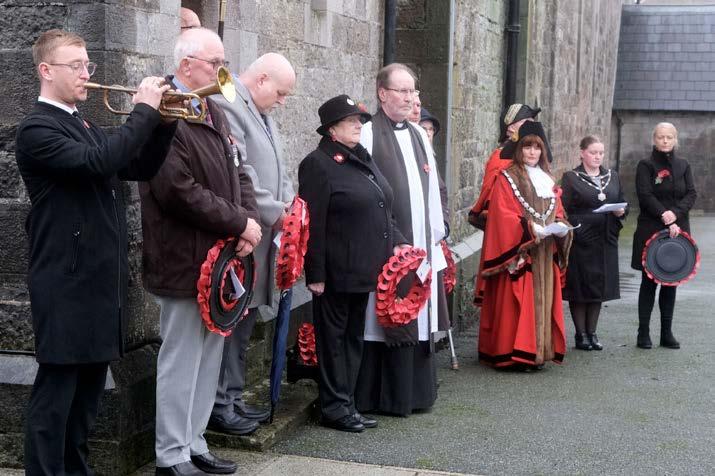

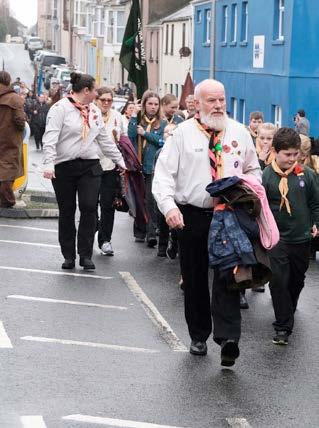

THE PEOPLE of Pembroke Dock gathered on Sunday (Nov 9) to pay their respects to the fallen in a moving Remembrance Service held at the town’s war memorial.
Despite grey skies and rain, hundreds turned out to take part in the annual parade and service of remembrance. Veterans, serving personnel, cadets, Scouts, Guides and community representatives joined civic dignitaries in the march through the town.
The service featured the playing of the Last Post and a two-minute silence, followed by the Reveille and the national Anthem. Local uniformed groups and schoolchildren stood proudly with flags lowered in respect, while the crowd joined in hymns of remembrance.
The event was a powerful demonstration of Pembroke Dock’s community spirit and enduring commitment to honouring its fallen heroes.
Lest we forget.



RESIDENTS of Neyland gathered on Sunday (Nov 9) for the town’s annual Remembrance Service, standing in solemn silence to remember those who gave their lives in war and conflict.
The parade made its way through the town, led by veterans, Sea Cadets, Army Cadets, and members of the Royal British Legion, before assembling at the cenotaph for the Act of Remembrance. The Last Post was played and a two-minute silence observed at 11:00am.
Wreaths were laid by civic leaders, veterans and community groups. Among those attending was Henry Tufnell MP, who laid a wreath on behalf of the UK Government, and Mayor of neyland, who placed a wreath on behalf of the town.
The service was accompanied by music from neyland Town Band, with hymns and readings led by local clergy. Children from local schools and uniformed youth organisations also took part, ensuring that the tradition of remembrance continues through the generations.
As the rain fell lightly over the estuary, the crowd stood in quiet reflection — a moment of unity and gratitude that captured the spirit of neyland’s remembrance.
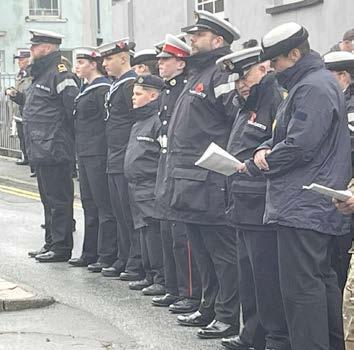









SAUNDERSFOOT residents gathered at the village cenotaph on Sunday (Nov 9) to pay their respects to those who gave their lives in conflict, as the annual Remembrance Service brought the community together in solemn reflection.
As church bells rang out across the village, the parade made its way to the cenotaph, led by veterans, members of the Royal British Legion, uniformed organisations, and civic representatives. A hush fell over the crowd as the bugler sounded the Last Post, marking the start of the twominute silence.
Despite the light rain, dozens of residents stood shoulder to shoulder to honour the fallen. Wreaths were laid by representatives of the armed forces, local groups, and schoolchildren, while prayers were offered for peace and remembrance.
The Reverend conducted the service, reminding those present of the continuing importance of remembrance and gratitude for the sacrifices made by generations past and present.
The service concluded with the Reveille and a heartfelt rendition of the national Anthem, followed by a march-past through the village, warmly applauded by onlookers.
Once again, Saundersfoot demonstrated that the spirit of remembrance remains strong within the community.


PEMBROKE residents gathered at the town’s cenotaph on Sunday (Nov 9) to pay tribute to those who lost their lives in conflict, as the annual Remembrance Service brought the community together in solemn reflection.
Under grey skies, members of the Royal British Legion, the Armed Forces, veterans, youth groups and local councillors joined residents to observe the traditional two-minute silence. The Last Post echoed across the town before wreaths were laid at the base of the war memorial in a touching act of remembrance.
The Mayor of Pembroke led the civic procession, accompanied by councillors, representatives from emergency services, and local organisations. Scouts, Guides, cadets and schoolchildren also took part, symbolising the passing of remembrance to the next generation.
Despite the cold and intermittent rain, a strong turnout filled the area around the cenotaph. As prayers were said and hymns sung, many reflected on the sacrifices of local men and women who gave their lives in the First and Second World Wars and in conflicts since.
The event concluded with a parade through the town, warmly applauded by onlookers lining the streets.
Pembroke once again demonstrated that remembrance lives strongly in the hearts of its people.

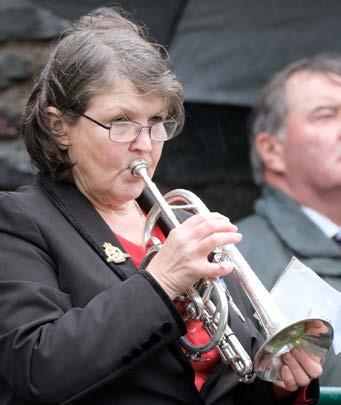
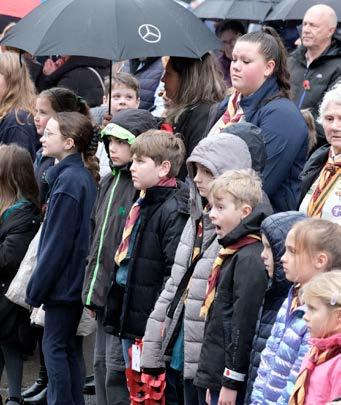









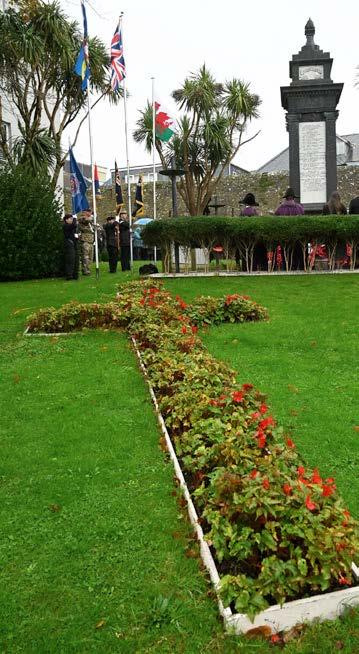
TEnBY residents gathered in solemn reflection at the town’s cenotaph this morning (Sun, nov 9) to mark Armistice Day and honour all those who gave their lives in service to their country.
Despite the drizzle, a large crowd assembled at the war memorial on South Parade as the clock struck 11:00am. The Last Post was sounded, followed by two minutes’ silence observed across the town.
The Mayor of Tenby, town councillors, veterans, members of the Royal British Legion and representatives from youth groups, cadets, emergency services and local schools took part in the wreath-laying ceremony. Among them was a young boy who stepped forward to lay a poppy wreath— symbolising the next generation’s gratitude for those who made the ultimate sacrifice.
As the names engraved on the cenotaph were read aloud, the assembled crowd stood shoulder to shoulder, remembering those from Tenby and beyond who never returned home. Local clergy led prayers, and the service was accompanied by music from the Salvation Army Band.
Following the ceremony, the parade marched through the town walls led by the Royal British Legion standard bearers, with applause from residents lining the streets.
The annual service once again showed Tenby’s deep respect for its history, its veterans and the continuing legacy of remembrance.



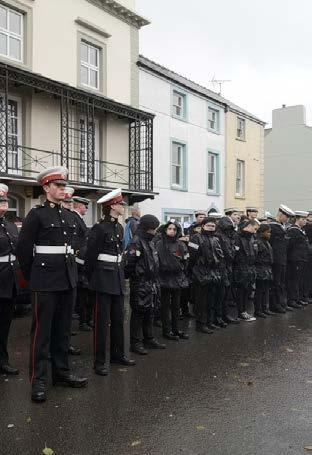
A SHORT service of remembrance was held on Tuesday (Nov 11) at the Narberth Remembrance Garden, where pupils from Narberth and Tavernspite Schools joined the community to honour the fallen.
narberth Town Mayor and Mayoress attended the service, which included the laying of poppy wreaths
by children from both schools, along with representatives from narberth Museum.
The event provided an opportunity for the younger generation to reflect on the sacrifices made by servicemen and women, ensuring that the message of remembrance continues to be passed on.
HUNDREDS of people gathered at the cenotaph overlooking the Haven on Sunday (Nov 9) to pay their respects to those who gave their lives in service to their country.
Despite persistent rain, residents, veterans, and uniformed organisations stood shoulder to shoulder as the Last Post echoed across the waterfront at the 11th hour. Tugboats sprayed water high into the air while ships in the port sounded their horns, marking a powerful and poignant moment of remembrance.
The ceremony was led by clergy and members of the Royal British Legion, with representatives from the Armed Forces, emergency services, and youth groups in attendance.
Cllr William Elliott, Mayor of Milford Haven, laid a wreath on behalf of the
town, while Paul Davies MS represented the Welsh Conservatives and also laid a wreath in tribute. A number of local organisations, schools and community groups followed, each placing their own wreaths at the base of the memorial.
As prayers were said and hymns sung, the crowd reflected in silence — united in gratitude for those who never returned home.
From the water’s edge, the sight of the tugboats’ sprays and the sound of ship horns added a uniquely local note of remembrance, honouring Milford Haven’s long association with the sea and the many servicemen and women connected to its history.
The service concluded with the national Anthem and a march-past by veterans and cadets, warmly applauded by those lining the streets.


A REMEMBRAnCE service was held on Saturday afternoon at Pembroke Dock Military Cemetery –the only dedicated military cemetery in Wales – as residents, veterans, and cadets gathered to honour the fallen.
Representatives of the armed forces, Royal British Legion, and local dignitaries joined clergy and members of the public for the solemn ceremony. Wreaths were laid at the war memorial as standards were lowered in silence to mark the moment of remembrance.
The service included prayers led by the officiating minister and

readings reflecting on the sacrifice of those who served in both world wars and later conflicts. Members of the Army Cadet Force and Sea Cadets stood proudly alongside veterans, many wearing medals and poppies in quiet tribute.
Among those in attendance were local officials dressed in ceremonial robes and uniformed representatives from the Royal navy and Army Reserve. The haunting words “Lest we forget” were echoed as the community came together to remember those who gave their lives in service of their country.


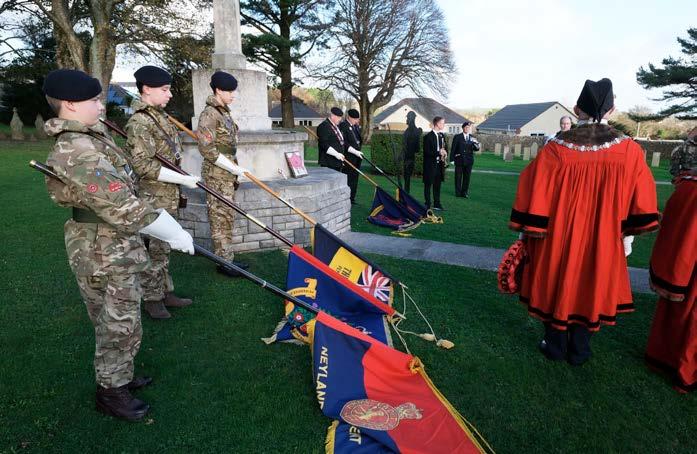





THE OLDER PEOPLE’s COMMISSIONER FOR WALES has praised a range of projects across Pembrokeshire that are providing vital support for older people and helping residents to “live well and age well”.
Rhian Bowen-Davies spent the week (nov 3–7) visiting towns and villages throughout the county, meeting older residents and volunteers at a variety of community groups and activities. The visits formed part of her ongoing work to understand the challenges faced
Tom
Sinclair editor@herald.email
by older people in Wales and highlight examples of best practice in local communities.
During her time in Pembrokeshire, the Commissioner met with older people’s groups in Carew, Crymych, Haverfordwest, Hubberston, Milford Haven, newport, Pembroke Dock, Saundersfoot and St Davids.
These included the Pembrokeshire 50+ Forum, social and lunch clubs,
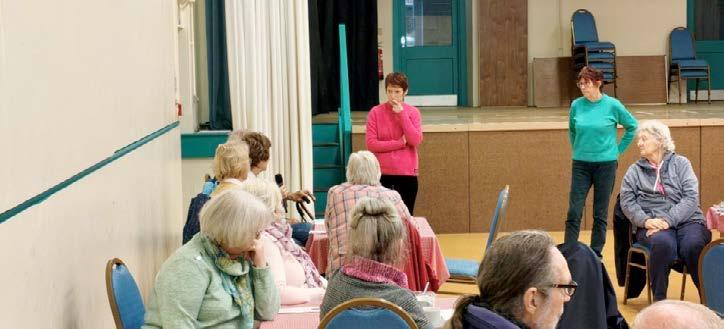
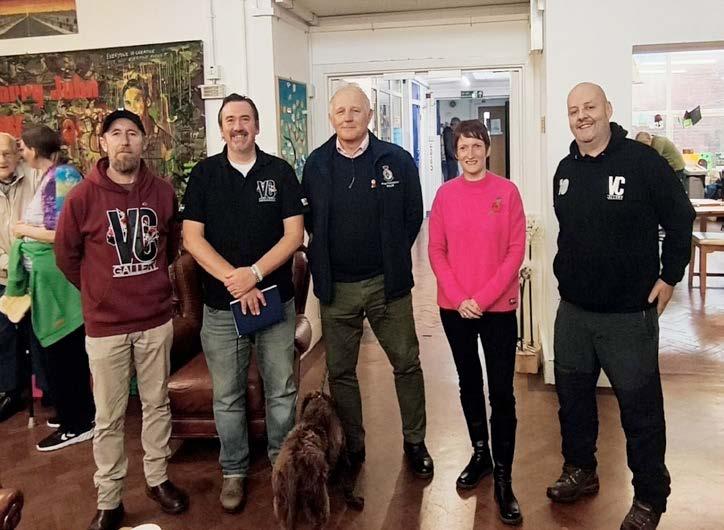

dementia-friendly groups, and exercise sessions designed to help people maintain strength, confidence and independence. She also visited an innovative new extra-care housing scheme and a reablement service supporting older people to regain independence after illness or injury.
The Commissioner held meetings with Pembrokeshire County Council’s Leader, Chief Executive and Cabinet Members, as well as representatives from local organisations such as PAVS, PACTO and Bro Preseli, to discuss services aimed at making communities across the county more age-friendly.
Speaking after her visit, Rhian Bowen-Davies said it had been “hugely valuable” to see the positive difference that local groups and volunteers are making.
“From social clubs and lunch groups to housing and reablement services, the commitment, compassion and creativity of local volunteers, community leaders and organisations are transforming
people’s lives every day,” she said.
“It’s been a privilege to hear directly from older people about what helps them live well – opportunities to socialise, stay active and feel connected. But we must also recognise the challenges they face, such as access to healthcare, limited public transport, and fears of being left behind in a digital world.
“I look forward to working with partners across Pembrokeshire to build on the excellent work already underway and ensure every older person can access the support they need.”
Her week of visits also highlighted how dedicated volunteers are the backbone of many successful local initiatives. Many of the groups she met are entirely community-led, offering companionship, exercise, meals, and creative activities that help reduce loneliness and improve wellbeing.
The Commissioner thanked all those she met for their warm welcome and for sharing their experiences “so openly and honestly”.
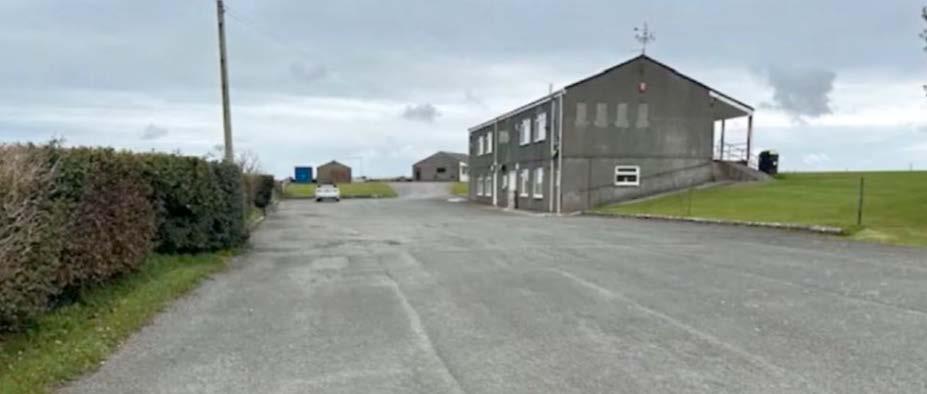
PLANS for a second cricket pitch at a successful Pembrokeshire club to let it “future-proof” its growth have been given the go-ahead. In an application recommended for approval at the november 3 meeting of Pembrokeshire County Council’s planning committee, Chris Richards, on behalf of Cresselly Cricket Club, sought permission to convert a field to a second pitch at the club.
A supporting statement said: “The Committee at Cresselly Cricket Club over the past five years has been extensively promoting the game of cricket particularly aiming at grass roots level in the local community.
“Our approach has been extremely

successful and as a result we currently have four senior teams, ladies team, 10 junior teams, together with the All Stars/Dynamos Programme.
“As a result of our success we have to ground share, but we are finding this increasingly difficult, so our aspiration of the club is to have its own designated second cricket pitch alongside our existing facility.
“This will provide more playing
opportunities and enable us to be in control of the second pitch, but more importantly future proof and support our continued growth without reliance on other clubs who are also expanding and may want their facility for their own use in the future.”
It says the land will only be used as a cricket pitch with no permanent buildings being constructed.
Local community council Jeffreyston unanimously supported the proposal.
An officer report said the proposal would result in the loss of some best and most versatile agricultural land but that is balanced against “the importance of recreational spaces and outdoor facilities in terms of health, well-being and amenity”.
It concluded: “Whilst the proposal would result in the loss of agricultural land, the scheme would provide significant social benefits for the wellbeing and health of the community. The scheme would have a low impact on the landscape and upon the amenities of nearby residents.”
The recommendation of approval was moved by Cllr Alan Dennison and backed by the committee.
TESCO customers in Milford Haven are being invited to help spread some festive cheer by donating new toys to children in need this Christmas.
From today until December 15, the Tesco Milford Haven Superstore will be collecting new and unwrapped toys on behalf of the local charity PATCH (Pembrokeshire Action To Combat Hardship). PATCH will distribute the gifts to children across Pembrokeshire as part of its annual Christmas Toy Appeal, which supports families who are struggling during the festive season.
Tesco Community Champion, Debbie Ann-Mills said: “I am delighted to support the PATCH Toy Appeal again this year. Bringing some happiness to families in Pembrokeshire who may be struggling this Christmas is so important.
“We take pride in supporting our local community throughout the year through Tesco Stronger Starts and
our Community Food Connection programme, and this year’s toy donation campaign is a fantastic way for customers to help local families in need.”
Claire De Silva, Head of Communities at Tesco, added: “Our stores are committed to supporting local children and their communities yearround. Thanks to the generosity of our customers and colleagues, the annual toy donation campaign is a wonderful way to make a difference at Christmas.
“It’s great to see Tesco Milford Haven partnering with PATCH this year to ensure that every child experiences the magic of Christmas.”
More than 800 large Tesco stores across the UK will have dedicated toy donation points where customers can drop off gifts bought in-store. Last Christmas, Tesco customers donated over 125,000 toys — a figure the retailer hopes to beat this year.

A MILFORD HAvEN student, formerly a pupil at Haverfordwest High, is preparing for the adventure of a lifetime as she takes on the challenge of climbing Mount Kilimanjaro in aid of Amnesty International UK.
Lily Walters has signed up for the UK Kilimanjaro 2026 Student Challenge, which will take place from August 25 to September 3, 2026. She is aiming to raise £4,970 for the human rights charity, which campaigns for justice, equality and freedom across the world.
Lily said: “This challenge isn’t just about pushing myself outside my comfort zone — it’s about making a difference too. Every donation, big or small, will help me reach my target and support Amnesty International UK’s important work.”
So far, Lily has raised £145 from seven supporters, with donations continuing to come in through her JustGiving page. Messages of encouragement have included: “Go for it, girl!”, “Fantastic news, Lily —
Tom Sinclair editor@herald.email
wishing you all the very best,” and “We are so proud of you!”
The nine-day trek will see students from across the UK journey to Africa to climb the world’s tallest free-standing mountain, reaching an altitude of almost 6,000 metres (19,000 feet). The challenge tests both physical endurance and mental strength, and participants are expected to train for months before departure.
Funds raised will go directly to Amnesty International UK (RC n 1051681), whose campaigns focus on issues such as refugees, children’s rights, women’s rights, and conflictaffected communities.
Those wishing to support Lily’s fundraising can visit her JustGiving page at: justgiving.com/fundraising/ uk-kilimanjaro-25th-august2026-student-choseachallenge690a50b1eff9e







LOOKING ahead with genuine excitement to the upcoming UK season of I’m a Celebrity… Get Me Out of Here!, which returns on Sunday 16 November 2025. Once again hosted by the indefatigable duo Anthony McPartlin and Declan Donnelly, viewers are promised the familiar jungle setting in Murwillumbah, New South Wales, and the tried-and-tested mix of gruelling trials, night-time nerves and the raw alliances that emerge when celebrities swap comfort for camp life.
This year’s lineup is shaping up to be a real mixed bag of personalities and backgrounds. Among the names expected to enter the jungle are former Lioness and sports presenter Alex Scott, rock-star-turned-actor Martin Kemp, beloved soap stars Shona McGarty and Lisa Riley, comedy icon Ruby Wax, rapper Aitch, model and TV presenter Kelly Brook, TikTok and YouTube personality Angry Ginge, and broadcaster Tom Read Wilson. It’s an eclectic blend of household names and new-generation favourites, promising a camp that feels both nostalgic and refreshingly modern.
What’s particularly
intriguing this year is how the show seems to be balancing “big star” credibility with socialmedia appeal. The producers appear to be chasing the perfect storm of contrasting energies: sports legends alongside entertainers, soap actors sharing space with digital influencers, and seasoned comedians clashing—or bonding—with younger performers. Someone like Alex Scott could bring the calm and determination of an athlete, while Aitch offers charisma and youth appeal. Ruby Wax will almost certainly deliver the wit and emotional honesty that fans adore, whereas Kelly Brook’s presence could add glamour and nostalgia for viewers who remember her early TV years. Martin Kemp, always cool under pressure, might surprise everyone with his adaptability, while the likes of Angry Ginge and Tom Read Wilson are sure to keep the energy unpredictable.
Of course, the formula remains the same: brutal trials, creepy-crawly dinners, endless hunger and sleepless nights. But what gives each series its life is not the bugs or the challenges—it’s the people. Watching how they crumble, bond, and rebuild themselves is what makes the jungle experience so fascinating. Will
Shona McGarty’s soap-acting resilience help her when the camp politics heat up? Will Lisa Riley’s warmth and humour become the emotional glue of the group? And who will fall apart the moment they’re handed a meal of witchetty grubs? These are the delicious unknowns that keep fans coming back year after year.
At its best, I’m a Celebrity delivers far more than shock value. The real magic lies in its ability to strip fame away and reveal something authentic about the contestants underneath. The jungle humbles them, softens them, and occasionally transforms them. If this year’s cast leans into the spirit of camaraderie, self-discovery and humour, then this could easily become one of the strongest and most memorable seasons in years.
So yes—I’ll definitely be tuning in. I’ll be cringing through the trials, laughing at the late-night banter, and cheering for whoever learns the most about themselves by the end. With a cast this varied and promising, there’s every chance we’ll see moments of genuine courage, kindness and chaos—the perfect recipe for another great year in the jungle.



THE much-anticipated third instalment in the magician-heist franchise, Now You See Me: Now You Don’t, arrives with the swagger of a reunion tour and the freshness of a new recruit lineup. This time around, the familiar quartet of illusionists led by J. Daniel Atlas (portrayed with jaunty flair by Jesse Eisenberg) — joined by the equally deft Merritt McKinney (Woody Harrelson), Henley Reeves (Isla Fisher) and Jack Wilder (Dave Franco) — find themselves not just reclaiming their place under the spotlight but being forced into the role of mentors to a younger contingent of magicians (including Justice Smith, Ariana Greenblatt and Dominic Sessa). In the director’s chair is Ruben Fleischer, who brings a kinetic energy and franchise-savvy that elevates the spectacle beyond mere callback territory. From the opening moments it’s clear the film is wagering much on the elasticity of its own premise — stage magicians who moonlight as high-stakes heist artists, combining sleight of hand, misdirection and big set-pieces. Here the stakes are global and personal: an enigmatic crime heiress (played by Rosamund Pike) stands at the centre of a web of trafficking and corruption, and the Horsemen must team up with the rookie illusionists to pull off the impossible. The artifice of magic tricks is used not just for show but as a metaphor for
the shifting generational power play: the old guard must adapt or watch the younger bloods outperform them. visually the film stomps its foot: gravitydefying card floods, a large jewel heist in exotic locales, and a trailer that teases “mindmelding twists, turns, surprises and magic unlike anything ever captured on film.” The tone is sleek, glossy, often playful, but there’s an undercurrent of darker ambition this time — the challenge of staying relevant, being seen, then unseen.
The strength of the movie lies in the chemistry and charisma of its leads. Eisenberg effortlessly resumes his Atlas persona — confident, sharp-tongued, yet haunted by the shadow of a past that won’t fade. Harrelson and Franco provide comedic and dramatic ballast, Fisher’s return (after her absence in the second film) brings welcome continuity, and the newcomers inject a youthful scramble that prevents the film from becoming merely a nostalgia cruise. Pike’s antagonist is a chilly, elegant foil, and Morgan Freeman, back as Thaddeus Bradley, adds gravitas and a reminder of the series’ enduring flair for misdirection and subversion. There are moments where the film teeters into self-parody — when the card-throwing becomes cartoonish or the “we’ll fool you before you even see it coming” line is so literal it strays into silliness —
but, largely, it handles its tone with a confident wink rather than a fatal tumble.
What may divide audiences is the script’s ambition to layer complexity over spectacle. The heist is bigger, the betrayals more personal, the generational conflict laid bare, and the twist — teased by Eisenberg himself as “mind-blowing” — aims to land with a flourish. For fans of the earlier films who came for the clever gimmicks and paced reveals, this one ups the ante, asking them to care about legacy, relevance and change as much as the deck of cards hidden in plain sight. For newcomers it offers a flashy entry point: you don’t need intimate knowledge of the entire back-story to enjoy the illusions, the spectacle or the brisk pacing.
In short, Now You See Me: Now You Don’t delivers exactly what its title suggests: illusions and revelations, the seen and the unseen, old tricks hatched anew. It reassembles a beloved cast, injects fresh faces and bigger set pieces, and invites viewers to suspend disbelief and surrender to the glamour of magic as a heist art form. It won’t reinvent the wheel of the franchise, but it sharpens it. For anyone intrigued by elegant sleight of hand wrapped in blockbuster sheen, this is a show worth seeing — and worth being surprised by.



Well now, bach, hold onto your leek-shaped USB sticks — the boffins at Valve have crawled out of their Seattle cave and announced a brand-new Steam Machine, a chunky black cube that looks like someone crossed a PlayStation with a council recycling box. And fair play, it’s causing quite the stir in the tech world.
Valve, if you’re not familiar, is the company behind Steam — the platform responsible for 90% of the arguments in my house about why the broadband’s slow (“It’s nOT the weather, Gwyneth! I’m downloading a patch the size of Betws-y-Coed!”).
Their new Steam Machine 2026 Edition promises to let you play all your PC games on the telly, without having to drag a full tower PC into the living room and upsetting the feng shui of your scatter cushions.
It’s a follow-up to the Steam Machine they tried in 2014 — a device which, to put it politely, sold about as well as English tickets in a Cardiff pub on match day. This time, though, Valve reckons they’ve cracked it.
Valve says the Steam Machine will hit shelves in early 2026, which in tech-speak means “we’ll tell you when we’re good and ready, butt”.
No confirmed price yet either — but seeing as the old version was $499, the new one is expected to cost “a good deal more”, which is corporate language for “start saving now, mun”.
• SteamOS (Linux-based — ideal if you enjoy both gaming and mild emotional distress)
• AMD graphics
• 4K resolution at 60fps
A controller with two massive trackpads, which look like someone glued two beer mats on the front and said “job done”.
Valve claims it’s optimised because it can tell you which Steam games will run properly on it before you buy them — a subtle dig at every console launch disaster of the last 20 years.
Industry analyst Christopher Dring says the Steam Machine might end up like the Steam Deck:
“Lucrative but niche… most appealing to existing Steam power users.”
In other words:
If you already own a gaming PC, a Steam Deck, three RGB keyboards, and have strong opinions about frame pacing, this is for you.
If you play Wordle and Candy Crush… probably not.
This one’s called the Steam Frame, and boys bach — it’s ambitious:
• Fully wireless
• Runs SteamOS on its own
• Only shows the highest-quality graphics in the part of the screen you’re actually looking at
Designed for streaming games
It sounds clever, but I’ll reserve judgement until I’ve worn it in the living room and walked into the dresser again.
Valve hopes this flashy line-up will help it take on the giants — xbox, PlayStation, nintendo — who have spent the last decade fighting like seagulls over a chip.
I love the ambition. I love the tech. I love anything that promises 60fps without sounding like a Tywyn tractor starting up at 5am.
But until we know: the price, the release date, and whether it’ll actually run Football Manager without melting…
…I’ll be watching with respectful Welsh scepticism.
Like my Uncle Ifor always said:
“Hope for the best, plan for the worst, and never preorder a console you haven’t seen running Skyrim.”

PLANS for a mini golf tourist attraction on part of a Pembrokeshire seaside village family venue have been submitted to the national park.
In an application to Pembrokeshire Coast national Park, Lowri Silver of Kilgetty, seeks permission for a change of use of the ground floor area of Saundersfoot Harbour’s Coastal Schooner to an indoor mini golf tourist attraction.
The schooner – a prominent feature on the village’s national Events Deck –was built to showcase Saundersfoot’s maritime heritage and is part of the £10m Wales Coastal Centre project.
The building is a replica of a traditional coastal schooner vessel which operated from the harbour during the coal mining era to transport coal from Saundersfoot.
The interpretation centre closed in October 2024.
Back in July, an application by Jonathan Thomas of ‘Schooner’ for a pirate-themed bar at the site was refused at the national park development management committee.
That rum bar scheme had raised concerns from the community council, saying it was “considered to be at odds with the current family venue and heritage elements”.
An officer report recommending refusal said that scheme was considered to fall outside the seaside village’s defined retail area and the impact on the amenity of the area and especially
nearby residential dwellings.
At that meeting, Cllr Alec Cormack, one of the local county councillors, called for a more family-friendly scheme for the site.
A supporting statement accompanying the new application says: “The maritime theme will be maintained as the attraction will maintain many of the existing interpretation information and the maritime theme. The Schooner operated as an interpretation centre and high ropes offer for a year from October 2023 to October 2024.
“It has been open through the summer of 2025 on Tuesday and weekends. However, it has proved not to be a viable option to run the Schooner as an interpretation centre alone and an additional use is sought to maintain the interpretation element of the Schooner and to offer an all-weather attraction for local people and residents alike.”
It added: “The proposal will allow for the Schooner to be maintained and be open to the public thus protecting and enhancing the community facilities to meet the needs of local people and visitors alike. The proposal would also sustain the future of the interpretation element of the Schooner which in turn will protect and enhance the harbour, which is one of the key attractions in Pembrokeshire.”
The new application will be considered by park planners at a later date.



AS a long-time devotee of the Anno 117: Pax Romana saga, I approached this latest chapter with that familiar mixture of excitement and expectation—and I’m pleased to say that it delivers on many of the promises that had me thrilled in the first place. From the moment I assumed the mantle of governor in the year 117 AD, I felt like I was returning to the core of what made this series great: citybuilding at its finest, layered with strategy, culture, and empire.
What grabs you immediately is the setting. There’s something deeply satisfying about returning to an era where expansion, trade and infrastructure take centre stage rather than simply waging war. The “Pax Romana” period offers a cleaner slate for building an empire: you’re not constantly in the thick of global war, but rather shaping society, economy and influence. It gives the game breathing room to let the systems shine rather than relying purely on conflict.
The foundation of the gameplay remains familiar in all the best ways – you lay roads, allocate resources, build districts, balance citizen needs and watch your population grow and stratify. Yet, there are subtle evolutions that feel refreshing. The dual-province design (for example starting in Latium and eventually exploring regions like Albion) injects variety into terrain and challenge, and the cultural overlay—deciding whether you lean more Roman or allow local traditions to persist— adds meaningful flavour to each decision. It’s not a radical
reinvention of the series but a thoughtful refinement. The sheer visual detail—zooming into Roman streets, seeing marketplaces humming with life, watching settlements expand across marshes and hills— makes the world feel lived-in rather than just a grid of icons.
The economic systems, one of the hallmarks of the series, remain as satisfying as ever. Watching the chain of supply lines, resource gathering, trading with your neighbours, and ensuring your citizens are happy and productive still brings that distinct Anno “click” feeling: when everything hums and your city is running smoothly, it’s deeply rewarding. And when things don’t go to plan—insufficient workers, broken trade routes, unhappy citizens—you feel the sting, which means your decisions truly matter.
One of the biggest improvements I felt was that the game gives you more meaningful choices in how you lead your province. Do you build a mighty empire through dominance, or do you become a savvy economic powerhouse? Do you impose a fleeting Roman peace or embrace the local customs and cultures for longer-term harmony? These branching choices add to replayability and make me feel less like I’m following a fixed path and more like I’m truly carving out my own legacy. And that is exactly what I want from the series: that sense of “what kind of ruler do I want to be”.
That said, as much as I loved my time previewing the game, I also encountered a few small
caveats—though none of them dampen my enthusiasm. For one, the learning curve is non-trivial; while the franchise has always required a willingness to engage with layered systems, at the outset the pace of new concepts and stats can feel a little steep. If you’re new to the series you may find yourself pausing frequently, reading tooltips, or reconfiguring things once they’ve spun out. But in my mind that’s not a serious flaw—just the trade-off of depth versus instant simplicity.
Another very minor note: while the visual detail is topnotch and the city views are immersive, some of the narrative beats feel less central. The focus remains rightly on the sandbox building experience, but if you were hoping for a blockbuster story with every twist and turn you might find it light. But again, that’s not what the game promises first and foremost—it promises freedom, strategy and urban mastery, and that’s where it shines.
Ultimately, as a fan I feel that Anno 117: Pax Romana hits the sweet spot. It retains the heart and soul of the Anno franchise— meticulous city-building, satisfying economic systems, and deep strategic choices— while refreshing the formula with a bold setting and meaningful new wrinkles. It’ll reward both long-time followers (like me) and newcomers prepared to dive into its systems. I’m counting down the days until full release, confident that when I sit down and build that first grand Roman city, I’ll have hours and hours of engrossing expansion ahead of me. The empire awaits, and I’m ready.
exactly where you want it to be, though, you might want to at least try to turn your attention toward one other activity, just briefly. Isn’t there someone out there who’s been trying for days now to entice you into spending a few minutes alone with them? You’ve got a wonderfully clean nest to show off, so invite them over.
CANCER
Family matters could be tricky, but that won’t keep you from getting involved and possibly being able to solve something that’s been ignored for far too long. This ability to mediate will come to you courtesy of the Universe, which is currently sensitizing you in the department of home and family. You’re equipped to talk anyone into anything at the moment. Why not use it to help heal an ageold wound? At least one. You know you want to.
LEO When you least expect it, a burst of anger could change the tone of a conversation that started out sane, respectable, and civil. Your mission, should you choose to accept it, is to temper the rhetoric of all parties concerned with a bit of tact and diplomacy and by translating it in your own inimitable fashion. You know, it’s the “what they really meant to say is...” kind of thing. Fortunately, you’ll have some very valuable help from the Universe.
VIRGO
You’ve probably already got more penciled into your calendar for the day than you can possibly pull off. That is, unless you’re careful with your time, and, of course, we all know you are. That said, don’t go right over the top. The invitations to come out and play will pour in, and you really should save just a few hours for the delightful offers that haven’t yet presented themselves. You may find that folks are feeling quite sociable these days.
LIBRA
Don’t be surprised if you’re attracting a lot of admiring attention for at least the next few days. You’re charming, you’re sociable, you’re magnetic, and folks are loving your sensitivity and tenderness. Needless to say, your dance card may be overflowing, but it won’t be difficult for you to swing. In fact, one admirer in particular may let it be known that you’re exactly what they have been searching for.
SCORPIO Communication is the name of the game, secret stuff, though, at least for starters. That one little clandestine meeting you’ve been pondering? The one that your (somewhat murky) intuition is pretty sure couldn’t hurt a thing? Well, it just might, so sit tight. In the meantime, you could end up with some really lovely communications that are more fit for public knowledge. But if you just can’t resist, then, keep quiet about it. You’re good at that.
SAGITTARIUS
Stop me if this sounds familiar. Someone you know and love could be offended by something you say quite off the cuff and in an entirely playful way, something that comes out sounding like you think it’s a lot less serious than you really do. Go easy. Don’t hurt a friend inadvertently. They’ll undoubtedly forgive you, but why risk it? Think just for a second about how you’d feel if the tables were turned.
CAPRICORN
An older relative or authority figure who’s had their eye on you for a while now is just about ready to let you know how well you’ve been doing, especially based on a recent stressful situation that you’ve passed through with flying colors. In the meantime, don’t ignore someone new and interesting (who’s due to come along any time), sent to take your mind entirely off of this situation and anything that’s even remotely unpleasant.
AQUARIUS
You’re about to rush headlong into something you never expected. An intimate encounter with someone who’s so interesting and unusual, even downright fascinating, that you might actually see yourself hanging out with them for more than a few dates. Well, if that’s truly the case, don’t bother making plans to see a movie. Why waste valuable getting-to-know-you time in silence and the kind of darkness that makes you feel awkward, not closer? Plan coffee or drinks instead. At your place.



by editor tom sinclair


SO this is what we’re all getting worked up about? A programme aired by the BBC last year –Panorama: Trump: A Second Chance? – which linked two quotes from Donald Trump’s January 6th speech, the day his supporters went on to smash their way into the US Capitol.
Let’s be clear about what actually happened. Trump stood before a crowd in Washington and told them the election had been stolen. He said: “We fight like hell. And if you don’t fight like hell, you’re not going to have a country anymore.” He told them to “walk down to the Capitol.” Within an hour, that crowd did exactly that, leaving death, destruction, and
democracy hanging by a thread.
The BBC’s “crime” was editing two parts of his speech so the phrases appeared back-to-back, intercut with footage of the crowd heading for the Capitol. not ideal journalism, sure – but it didn’t invent words or alter their meaning. The message was the same: Trump incited anger, and the crowd acted on it.
now, two senior BBC figures have resigned over the fallout. Deborah Turness was in charge of BBC news when the documentary aired, but she didn’t commission or personally approve the edit. Yet she’s gone regardless. That proves the point: this isn’t real accountability – it’s political theatre.

The so-called “dossier of bias” reads more like a grievance list than a revelation – lumping together complaints about coverage of Gaza, trans rights and Trump all in one breath. The whole thing has been whipped up by politicians and culture warriors who have spent years trying to wound the BBC.
There’s also a wider question about standards. For decades, BBC journalists learned their craft in local newsrooms before moving on to national media. Those training grounds have been gutted by Facebook and Google’s ad monopolies. Without a strong local press, where exactly are future reporters meant to learn how to get stories right?
And here’s the irony lost in all the outrage: this controversy was uncovered not by rivals, but by the BBC’s own internal checks. The broadcaster’s editorial review system flagged the issue itself – proof that its mechanisms for scrutiny and accountability actually work within the BBC.
If we’re really going to start firing people for every imperfect edit, we’ll have no journalists left. The real scandal isn’t what the BBC did – it’s that we’re re-litigating a year-old broadcast while the man who inspired an insurrection prepares for another run at the White House. 2028 hat, anyone?



IT’S all about context, readers.
Many of you will be familiar with the sort of glutinous, sub-Hallmark card online sentiment that praises those who take the road less travelled. But how many of those nodding along at the glib summation of individuality know where the quote originates?
The road less travelled comes from a poem by the American poet Robert Frost.
In the original poem, the author describes a scene in which he enters a wood and comes to two paths that fork in different directions. And, guess what, readers? He takes the road less travelled.
Except that the forking roads are identical. The authorial character cannot tell them apart. Far from taking the road less travelled, the traveller’s choice is capricious.
The entire poem is likely a literary joke at the expense of one of Frost’s contemporaries and close friends, the poet Edward Thomas. Thomas was famously indecisive and inclined to overthink things. Frost’s poem is also an ironic comment on humans’ ability to construct grand narratives to explain their actions, when the choices made that contribute to that narrative

are little more than random.
That explains why context is important. Quotation without understanding is denser than sixteen tons of lead.
“Oh, Badger”, he hears his readers cry, “why are you telling us about context?”
Well, readers, it’s because, in light of the events surrounding the BBC, context is most important.
The immediate, not to say superficial, cause of the brouhaha is the idiotically maladroit editing of a speech made by Donald Trump before the January 6 riot in Washington in 2021. Editing together two separate sections of the speech to create a narrative was stupidly wrong. Broadcasting that edit on a Panorama just before the last US election was editorially inept.
There are overlapping contexts at work here, but Badger will tease out the three important ones:
(1) The BBC - and other UK mediais generally staffed by people who are irrevocably opposed to Donald Trump and all his works. He’s either a buffoon, a madman, a danger to world peace, or a soulless, senile, thuggish plutocrat. Those personal assessments might be objectively valid, but it is not the
BBC’s role to take a side in the politics of other democracies.
As the late Jack Webb said in Dragnet: “Just the facts, ma’am.”
There is scope for commentary from politicians and advocates for a cause, but not from those whose claim is that the BBC sets the gold standard for global journalism. Badger comments on news stories; others, no matter how tedious or godawful you find their prose, report them.
(2) There is no doubt that some people who rallied to Washington to support Donald Trump on January 6, 2021, did so to further their own violent ends. It beggars belief that Donald Trump, whose social media channels whipped up a blizzard of conspiracy theories to lie about how Joe Biden had so comprehensively stuffed him in the popular vote and finally in the electoral college, was unaware of the potential for his words to encourage violence.
Selectively edited or not, Donald Trump either knowingly disregarded the risk and proceeded with his tirade anyway or was reckless in his assessment of the risk. In either event, a rational and reasonable human being would conclude that haranguing a wildly partisan crowd that you know has elements in it who wish to perpetrate violence will result in violence being perpetrated.
The Panorama edit was foolish and unnecessary for that reason alone. In Badger’s opinion, Donald Trump deliberately fomented violence with his words and actions before January 6, and his speech that day provided the spark for violence. His actions and words, in context, speak for themselves without some bright spark deciding to amplify them by editorialising through an edit.
(3) The Panorama edit does not exist in isolation. The BBC has fallen into horrendous form by providing editorial comment in the guise of news. The increasing role played by selfappointed, unrepresentative and often rather small activist groups in shaping public debate has been examined too little. Badger believes that BBC news has abused its market-leading reputation and position to peddle the
personal and political agendas of a metropolitan chattering class
A specialist correspondent for a news organisation is not an advocate for any particular side in a debate about a contentious or divisive issue. They are a reporter, albeit one with special insight into their field of interest or expertise (the two concepts are not synonymous). Suppose you are inclined to approach a subject such as women’s rights, the war between Hamas and Israel, or immigration on one side of it. In that case, you betray the principle of impartiality that is VITAL to a PUBLIC SERVICE BROADCASTER such as the BBC.
Badger tries very hard to see all sides of an argument, but it is seldom possible to do so when watching or listening to BBC news. The attitude of interviewers, how they frame their questions, and their tone of voice when asking questions of the side they dislike shine through. That, and the incessant chatter of journalists interviewing other journalists as though their words carried some deep, lapidary meaning or were the word of a god itself, is a formula that has shed and continues to shed more light on the interlocutors’ prejudices than on events. BBC news has shifted its focus from accuracy and facts to a self-absorbed, self-righteous, and self-perpetuating commentary model, in which the colours of lanyards, wristbands, and the flags waved at weekends take precedence over journalistic standards.
Badger concludes not with his words but with those of the comedian, columnist, and essayist Simon Evans.
“The friends that the BBC should have listened to are those ... who have been warning for many years that a growing liberal bias in the newsroom was undermining its single strongest claim to the traditional public service funding model.
“For every free market partisan who would love to see the field cleared entirely, there are dozens of us who have a deep and abiding love and respect for the old thing and just want to see her justify her continued existence.”

STREWTH, there’s been more noise from across the Atlantic this week than when the gulls at Milford Docks discover a fresh skip full of chips. Donald Trump’s at it again — feathers ruffled, beak wide open — this time screeching at the BBC for trimming a few seconds off one of his old speeches about January 6th.
He’s calling it “fake news” and “a disgrace,” as if the fate of civilisation depends on Auntie Beeb’s editing room. But while Trump’s busy waging war on the telly, a much bigger storm’s brewing right under his gilded perch — one that smells more like rot than righteousness.
See, while he was squawking about the BBC, the U.S. House Oversight Committee quietly dropped a bombshell of its own — thousands of pages of Jeffrey Epstein’s old emails and files. And guess whose name popped up in the middle of that soggy mess? none other than The Donald himself.
In one email from 2011, Epstein wrote to his old pal Ghislaine Maxwell that “the dog that hasn’t barked is Trump… she spent hours at my house with him.” Another message to author Michael Wolff said: “of course he knew about the girls.”
Now before anyone starts flapping too hard, there’s no proof Trump did anything criminal — these are Epstein’s words, not sworn testimony. But let’s just say it’s not the sort of company a man with White House dreams should be keeping in his address book.
Trump insists he booted Epstein out of Mar-a-Lago years ago for being “a creep.” Fair enough — but there’s that pesky photo again, the one of Trump, Epstein and Maxwell all grinning like it’s a charity gala and not the prelude to one of the nastiest scandals in modern history.
And that’s the thing about seagulls and politicians — both love to puff themselves up and look important,

but both tend to leave a mess behind. You can scrub the deck, but the stink lingers.
Trump’s problem isn’t legal, it’s moral. Every time new Epstein files surface, the world’s reminded that he once mingled comfortably among men who saw young women as disposable. Even if he did nothing wrong, the question remains: why was he ever part of that crowd?
Over here on the Welsh coast, we’ve seen plenty of posers and big
talkers. Every marina’s got one — the bloke with the shiny yacht, a spray tan that could stop traffic, and a story for every sin he swears wasn’t his fault. They all say the same thing: “It’s a setup, everyone’s lying.” Sound familiar?
So while Trump rages about BBC edits, the truth is this: his biggest problem isn’t a few seconds of missing footage. It’s the decades of photos, friendships and whispers that tie him to a world that stank long before the cameras rolled.
If The Donald really wants to prove he’s different, he’d do better looking in the mirror than shouting at the media. Because you can polish your feathers all you like, but if you’ve been feeding with the sharks, people remember the blood in the water.
And take it from me — a seagull who’s seen more scandals wash up on these docks than you’ve had hot dinners — you can’t escape your own reflection in the tide.

WITH more people choosing staycations this summer, new research has warned that pet owners could face fines of up to £2,500 for travelling with unrestrained animals in their cars.
A survey by price comparison site Confused.com found that nearly one in four (24%) pet-owning motorists will be holidaying in the UK with their pets this year. But more than a third (37%) say they do not intend to properly restrain their animals while driving.
According to the findings, one in ten drivers plan to leave their pet loose in the boot without a guard, while 27% intend to let their pet roam freely around the vehicle.
Although driving with an unrestrained animal is not an offence on its own, police can issue penalties if the pet causes a distraction. Almost one in five (18%) drivers surveyed said they had received a fine or penalty points because their pet was loose in the vehicle.
Motorists caught driving without due care and attention can receive a £100 on-the-spot fine and three penalty points, but more serious cases can attract fines of up to £2,500 and even driving bans.
The risks extend beyond financial penalties. Confused. com found that one in seven (14%) drivers said their pet had caused an accident or a near miss while travelling. In such circumstances, drivers could face further sanctions, including an unlimited fine or –in the most serious cases – a prison sentence for dangerous driving.
The research also shows widespread uncertainty about the law. nearly one in five (19%) pet owners admit they do not know the legal requirements for restraining pets in vehicles. More than a third (35%) were unaware that allowing a pet to roam freely could invalidate their insurance if the animal is found to have contributed to a collision.
Unrestrained pets also risk serious injury themselves.
To help motorists understand the rules, Confused.com has produced a guide detailing how to keep animals safe during car journeys. Effective methods include using a specialist pet seatbelt, securing animals in a cage or carrier, or fitting a suitable boot guard.
Despite this, some drivers still allow pets to sit on the back seat, lie in the footwell or even

climb onto their lap. Almost one in five motorists (18%) admitted they had been distracted by a loose pet while driving.
Drivers are also urged to make regular comfort stops during warm weather. However, nearly one in ten (9%) petowning motorists travelling this
summer say they do not plan to stop at all.
With millions preparing for summer breaks, the message from experts is clear: secure pets properly, avoid distractions, and ensure the journey is safe for everyone on board.


THE GROWING crisis over children’s reading standards in Wales has deepened following revelations suggesting confusion and potential bias at the heart of the education inspection system.
Following an ITV news investigation, the Welsh Conservatives have called for urgent action to ensure that reading in Welsh schools is taught using evidencebased methods — rather than outdated or discredited theories.
Estyn, the body responsible for inspecting schools in Wales, is facing criticism after ITV news uncovered evidence that inspectors continue to reference and even praise so-called “cueing” methods — where children are encouraged to guess words using pictures or context.
International research over several decades, including the UK Government’s 2006 Rose Review and findings from the US national Reading Panel, has shown that systematic synthetic phonics (SSP) is the most reliable and effective approach to teaching children to read.
Despite this, Estyn officials have appeared to defend cueing as part of a “balanced” model. When asked to provide evidence for the effectiveness of such methods, the inspectorate reportedly cited
studies that did not support the approach.
In response, Estyn said it does not endorse any single reading method and that its inspections recognise a range of effective strategies. However, critics argue that the tone and examples used in Estyn reports amount to an implicit endorsement of cueing alongside phonics.
Concerns have intensified following the resignation of literacy expert Elizabeth nonweiler from the Welsh Government’s Expert Literacy Panel. nonweiler, chair of the Reading Reform Foundation and a leading advocate for phonics, accused the government of embedding “mixed messages” in its new £8.2 million CAL:On Cymru literacy programme.
It has also emerged that Estyn invited Professor Dominic Wyse — a well-known critic of phonics-focused teaching — to brief inspectors, while initially declining a request for nonweiler to do the same.
The Welsh Government insists it “supports the systematic teaching of phonics” and that its literacy strategy includes direct support for phonics-based approaches. However, the row has exposed deep divisions over how literacy should be taught and evaluated.
phonics as part of our credible plan to improve education and deliver a better future for Wales.”
Government and Estyn respond
The Welsh Government said that phonics remains a supported part of the curriculum but emphasised that teachers must retain professional judgement in addressing the diverse needs of learners.
Estyn has since apologised for an internal email referring to nonweiler as “evangelical about a single approach”, describing the comment as “an error”. It has pledged an “enhanced focus on reading” within its inspection framework for the next three years.
The political row comes amid mounting evidence that thousands of pupils in Wales are leaving primary school unable to read at the expected standard. ITV news previously reported that up to 30 per cent of children finish primary education without secure reading skills, with Estyn inspection reports continuing to praise cueing-style methods in some cases.
International assessments paint a bleak picture. In the 2022 Programme for International Student Assessment (PISA) tests, 15-year-olds in Wales scored an average of 466 in reading — below the OECD average and significantly behind England’s score of 496.
Welsh Conservative Shadow Cabinet Secretary for Education, natasha Asghar MS, said:
“These revelations are deeply concerning. It appears that the body responsible for upholding educational standards in Wales may be promoting flawed and damaging teaching methods.
“The evidence is crystal clear — systematic phonics works. The Welsh Conservatives are the only party committed to banning cueing and following the science by introducing
Supporters of phonics say the research is overwhelming and that consistency is key. They argue that England’s shift to mandatory phonics testing and instruction led to measurable improvements in reading outcomes.
Others, however, defend a more “balanced” approach, emphasising comprehension and meaning-making as essential components of literacy. They warn that rigid adherence to phonics alone risks neglecting broader language development.
With Estyn due to increase its focus on reading, and the Expert Literacy Panel’s report still unpublished, pressure is growing on both the Welsh Government and the inspectorate to provide clarity.
For teachers, parents and pupils, the unanswered questions remain: What guidance will schools receive? How quickly will it change? And how will inspectors judge literacy teaching going forward?
As the debate continues, one fact is beyond dispute — reading is the foundation of all learning. For Wales, ensuring every child can read confidently and fluently is not just a matter of education policy, but of fairness and social justice.




environmental project in Pembrokeshire aims to capture up to 250 million litres of additional groundwater each year, as local farmers take collective action to tackle flooding, drought and water quality challenges.
The initiative brings together 21 dairy farmers, all members of the First Milk co-operative, in a new four-year partnership with nestlé Waters & Premium Beverages UK — both major employers in the region.
The project forms part of First Milk’s industry-leading regenerative farming programme, which encourages practices such as rotational grazing and increasing species diversity in grassland. These methods improve soil structure and organic content, helping land retain more water and reducing environmental damage during extreme weather.
“As extreme weather becomes more frequent, poor water systems add to the risk of flooding and drought,” said Mark Brooking, First Milk’s Chief Impact
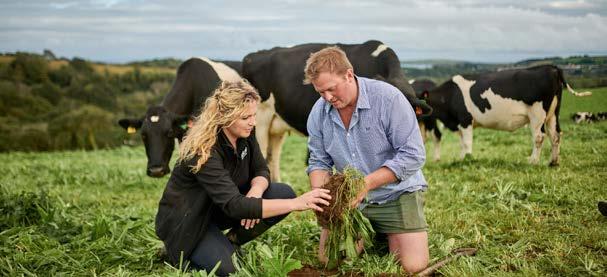
Officer. “This project supports our farmers to work with nature — improving the land, supporting biodiversity, and delivering lasting benefits to local communities.”
Across 800 hectares of farmland, the farmers are extending regenerative practices to create natural water reservoirs within the soil. By improving water infiltration and the soil’s holding capacity, they hope to make farms more resilient while protecting nearby rivers.
To establish a baseline, an agronomist has assessed more than 100 fields across the 21 farms. nearly 50 soil samples were analysed, 650 earthworms counted as indicators of soil health, and penetrometer
tests carried out to measure compaction.
Each farm has received tailored recommendations, from shallow sward slitting to deeper subsoiling, along with guidance on grazing patterns and planting deeper-rooting pasture species to maintain long-term soil structure.
Farmers are already putting the advice into practice.
“It’s made me spend time looking at issues I hadn’t given enough attention to before,” said Dan James of Gellyolau Farm near Clynderwen. William Fox, of South Astridge Farm near Tenby, added: “Understanding where compaction occurs helps me plan improvements. Anything that reduces soil compaction benefits both the farm and the environment.”
near Puncheston, Michael
Williams is using sward slitting and subsoiling in the short term while increasing grass diversity for the long term. “The assessment confirmed what I suspected — that some areas struggle in very wet or very dry conditions. It’ll be interesting to see what impact these changes have,” he said.
As the interventions take effect, the land will hold more water and reduce surface run-off, helping to improve water quality in the Eastern and Western Cleddau and tributaries of the River Taf.
Matthew Faulkner, Factory Manager at nestlé Waters & Premium Beverages in narberth, said: “We’re proud to work with First Milk farmers to improve groundwater quality and quantity here in Pembrokeshire, where our Princes Gate and nestlé Pure Life bottling site operates. “Water is a shared resource and a shared responsibility. Caring for it requires collaboration — and this partnership shows what can be achieved when local communities work together.”



POULTRY and captive bird keepers in Wales must house their birds from Thursday 13 November as measures are introduced to combat the heightened risk of avian influenza.
Wales is facing a significantly elevated threat due to a growing number of cases in both kept and wild birds across Great Britain.
Avian influenza is of serious concern, not only for animal health and welfare, but also to the sustainability of food production and public health.
From Thursday november 13 it will be a legal requirement for all keepers of 50 or more birds of any species to house them.
Mandatory housing will also apply to flocks of less than 50 birds of any
species if eggs or poultry products are sold or given away, due to the increased risk of disease transmission associated with trading or giving away poultry products.
Additional biosecurity requirements will also be introduced for the gamebird sector, which experienced avian influenza outbreaks last season.
The new compulsory housing measures will be incorporated into the existing Wales Avian Influenza Prevention Zone (AIPZ) introduced in January.
Deputy First Minister with responsibility for Rural Affairs, Huw Irranca-Davies, said:
“We keep measures under active review. Since the Avian Influenza Prevention Zone was introduced at the start of the year, the risk of disease has recently increased further, and Wales is now facing a very high level of avian influenza risk.
“The decision has not been taken lightly, but it is necessary to protect both our bird populations and the livelihoods of poultry keepers across Wales.
“I urge all bird keepers to comply with these requirements and maintain the highest standards of biosecurity. I recognise this will be challenging, but by acting now we can help prevent the spread of this disease and protect our flocks.”
Chief Veterinary Officer for Wales,
Dr Richard Irvine, said:
“We are seeing a sharp increase in the number of avian influenza cases in kept and wild birds. In the face of the current very high risk levels, we are now introducing mandatory bird housing measures, which will apply across the whole of Wales.
“I appreciate the impact these measures have on keepers, and remain grateful for their continued cooperation to protect bird health and welfare.
“Housing measures can help protect birds from the threat of disease, but they are not a substitute for stringent hygiene and biosecurity.
I strongly advise keepers to act now and familiarise themselves with the steps they need to take to protect their birds. This includes using the mandatory biosecurity checklists available online.
“Everybody should continue to remain vigilant, report any suspect cases of disease immediately, and ensure they are following the mandatory enhanced biosecurity requirements to protect your birds.”
The housing order and AIPZ will be in place until further notice and will be kept under regular review as part of the Welsh Government’s work to monitor and manage the risks of avian influenza, along with the Animal and Plant Health Agency and the other UK administrations.



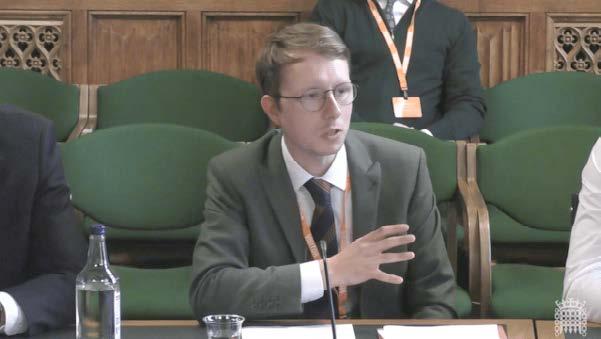
Ahead of the UK Government’s Autumn Budget, the Farmers’ Union of Wales (FUW) has welcomed a new report from the UK Parliament’s Welsh Affairs Committee, which criticises the UK Government for its “complacency” in overlooking the long-term impact of its policies on the sustainability of Welsh agriculture.
In March 2025, the Committee launched an inquiry into the future of farming in Wales, seeking evidence from the FUW and other Welsh farming organisations on the challenges and opportunities facing Welsh agriculture, alongside the impact of UK Government policy on the sector.
In its final report, published this week, the Committee points to the unique context of agriculture in Wales, which occupies over 90% of Wales’ land area, and which employs 11% of the UK’s total agricultural workforce despite containing less than 5% of its total population. However, despite contributing to a food and drink sector worth over £9.3 billion to the Welsh economy, Welsh farming has been suffering from a declining workforce, declining livestock numbers, and lower incomes than elsewhere in the UK. The Committee identifies a sector that “is resilient but under heavy strain”, in a UK policy context that “too often overlooks the distinct nature of farming in Wales.”
The report pays particular attention to the UK Government’s proposed inheritance tax (IHT) reforms, expressing concern over the lack of clarity regarding their potential impact on Welsh farming. Committee members warn that the changes could disproportionately affect elderly farmers and those with terminal
that creates clear pathways for young farmers and new entrants, reflecting the recommendations set out in the FUW’s Mandate for Future Farmers report. The report also calls for greater focus on food security and the promotion of economically sustainable farming practices across Wales.

illnesses who have structured their affairs in line with existing tax advice. Without further guidance, these individuals risk leaving their families facing unexpected and significant tax burdens upon their death.
The Committee accuses UK Ministers of complacency in failing to conduct any assessment of the impact the changes would have on Welsh farming, creating “an unnecessary climate of uncertainty and confusion… in an industry central to the cultural, environmental and economic fabric of rural Wales”, and calls on the Government to delay implementation of IHT reforms until a Wales-specific Impact Assessment has been conducted.
The Committee also took evidence from the FUW regarding the UK Government’s decision to ‘Barnettise’ Welsh agricultural funding; a move that removes the multiannual ring-fence around farm support and merges it into the broader Welsh Government Block Grant. In its oral evidence, the FUW warned that this approach fails to reflect the specific needs of Welsh agriculture and effectively amounts to a real-terms funding cut for the sector. The Committee’s report urges the Treasury and the Wales Office to work closely with the Welsh Government to ensure that this change does not lead to a reduction or deprioritisation of support for Welsh farmers.
The report also highlights the disproportionate impact of liberalised free trade agreements with Australia and new Zealand on Welsh farming, and raises concerns about potential effects from ongoing trade negotiations with other countries. It emphasises the need for a longterm vision for Welsh agriculture
Committee-members urge the UK Government to “take specific account of the unique cultural, environmental and economic circumstances of farming in Wales when making future policy decisions which have direct implications for the agricultural sector in Wales.” They recommend that any future policy decisions affecting Welsh agriculture “be accompanied by a Wales-specific impact assessment led by the Wales Office”.
Commenting on the Committee’s findings, FUW President, Ian Rickman said: “This report sends a clear and timely message to the UK Government that Welsh farming cannot continue to be treated as an afterthought in Whitehall. The Committee has rightly recognised the unique nature of agriculture in Wales; its scale, its contribution to our economy, and its vital role in sustaining our rural communities. Yet too often, UK policy fails to take those distinct circumstances into account.
“The proposed inheritance tax changes and the ‘Barnettisation’ of agricultural funding both risk undermining the long-term sustainability of Welsh family farms at a time when the industry is already under a perfect storm of rising costs, volatile markets and future uncertainty.
“As we approach the Autumn Budget, the Chancellor must take these findings seriously and ensure that future decisions genuinely protect our family farms, strengthen food security, and secure a sustainable future for Welsh agriculture.
“We thank Members of the Welsh Affairs Committee for providing an accurate and wellbalanced report on the current situation of Welsh farming, and for highlighting the urgent need for the unique characteristics of rural Wales to receive certain consideration when policy decisions are made.”
AHEAD of this month’s UK Government Budget, the Farmers’ Union of Wales continues to hold serious concerns over the decision to “Barnettise” Welsh agricultural funding from 2025–26 onwards. The move, announced in the Autumn 2024 Budget, represents a fundamental shift in how rural Wales will be supported in the years ahead - and one that risks long-term harm to the family farms that underpin the rural economy.
Under previous arrangements, agricultural funding was allocated according to need. During the UK’s membership of the EU, the Common Agricultural Policy distributed funds based on farming characteristics such as the size, number, and type of holdings. This system recognised the distinct nature of Welsh agriculture, resulting in Wales receiving around 9.4% of the UK’s total agricultural budget.
That principle has now been abandoned. By absorbing agricultural support into the Welsh Government’s block grant and applying the population-based Barnett Formula to future changes, the Treasury has tied Welsh funding to headcount rather than need. In practice, this will reduce Wales’ share of any proportional changes to the UK agriculture budget from around 9% to around 5%.
The decision marks a clear departure from a system that accounted
for the realities of farming and rural life.
The Farmers’ Union of Wales has consistently warned that the change risks cutting future support for Welsh agriculture and widening disparities between the devolved nations.
The First Minister of Wales, Eluned Morgan MS, has also described the reforms as a matter of “huge concern”, highlighting the potential for serious long-term consequences.
With family farms already facing mounting pressures from volatile markets, climatic challenges, and shifting policy priorities, the timing of this change could not be worse. A fair, transparent, and needs-based system is essential if Welsh agriculture is to remain resilient, productive, and sustainable.
Ahead of the Budget, the FUW is urging the UK Government to revisit the decision and reinstate a funding model that reflects the distinct nature of Welsh farming. The FUW is also calling for a review of proposed reforms to Agricultural Property Relief (APR), warning that these could further undermine farm succession and investment.
Welsh farming has always been about more than food production; it sustains jobs, communities, and landscapes. A funding formula that fails to recognise that reality risks weakening the foundation of rural Wales for generations to come.


THE Kia Pv5 has been named ‘Best Electric van’ and the outright winner as ‘van of the Year’ at the 2026 Parkers van and Pickup Awards. This marks the PV5’s first wins at these prestigious awards, and the double accolade signals a strong debut for Kia in the electric Light Commercial vehicle (eLCv) market.
The Parkers Van and Pickup Awards take place every year, separate to the Parkers new Car Awards, recognising the importance of commercial vehicles in the UK. Award winners are decided by verdicts from expert Parkers reviewers.
Tom Webster, Parkers Vans Editor and Deputy Head of the Digital Automotive Hub at Bauer Media: “The Kia PV5 would have been an excellent van had it been made by one of the long-established names in the industry, but that it has come from a brand that doesn’t have the heritage and customer feedback to exploit is even more impressive. not only is it good to drive and fitted with a comfortable and well-equipped cabin, the PV5 is staggeringly good value, undercutting even much smaller diesel rivals, which are typically the entrypoint to van ownership.”
Webster continues, “It’s priced at a point where it has really made the industry sit up and take notice. It’s a first attempt from Kia, but it is one

that has really shaken things up, with the promise of more to come”.
Paul Philpott, President and CEO at Kia UK Limited: “It’s fantastic to add two awards to the PV5’s already growing collection. This double win reveals the practical and compelling nature of our first electric van and sets a standard of excellence across all of our upcoming electric commercial vehicles, which will be sold through our new network of dealer partners dedicated to commercial vehicles.”
The PV5 sets new benchmarks for performance, capability and flexibility in the competitive e-LCV segment. It reflects Kia’s growing commitment to the electric motoring industry. Following its recent win as The Sun’s ‘Van of the Year’ at the 2025 news UK Motor Awards, the PV5 continues to collect accolades which highlight its versatility and innovation – redefining what a modern van can be. Currently available as a L2H1 Cargo and five-seater Passenger, further PV5 variants
will arrive next year, including larger and smaller PV5 Cargo configurations, and six- and seven-seat PV5 Passenger vehicles. Further down the line, Kia has no intentions of slowing down, with the PV7 arriving in 2027 and the PV9 two years later in 2029.
The Kia PV5 Cargo and Passenger are available to order now from Kia’s brandnew PBV Centre network, with deliveries expected toward the end of the year.




1.2

























At EV Wales, electric vehicles aren't just part of our business – they are our passion. As dedicated EV specialists, we provide a level of in-depth expertise in sales, service, and repair that goes beyond what a main dealer can offer. Are you looking to buy your first EV and need honest, real-world advice from people who drive them every day? Or are you an owner searching for expert, economical repair solutions that make sense? We are your trusted local partners. We believe in making electric driving simple, affordable, and exciting for everyone. For a better way to buy and maintain your EV, speak to the experts who live and breathe them.







Since its debut at the Goodwood Festival of Speed in July, the Hyundai IONIq 6 N has ignited excitement among driving enthusiasts eager to experience the high-performance electric vehicle (EV) firsthand.
This week, that anticipation becomes a reality as Hyundai Motor Company (Hyundai Motor) welcomes international media to the Korea International Circuit in Yeongam for their first opportunity to push the IONIQ 6 N to its limits ahead of its global market launch in early 2026.
IONIQ 6 N is designed to deliver unparalleled driving excitement, guided by Hyundai n’s three-pillar philosophy: Corner Rascal, Racetrack Capability, and Everyday Sportscar. This approach seamlessly blends track-ready performance with daily usability, setting a new benchmark for high-performance EVs.
Building on the technical achievements of the acclaimed IOnIQ 5 N, the IONIQ 6 N delivers an even more distinct n-focused design and a plethora of advanced features for heightened precision and engagement. Specifically optimized for high-intensity driving, it integrates newly developed hardware and intelligent software to ensure peak capability, control, and endurance on circuit.
Key technical innovations include a fully redesigned suspension geometry for superior handling, an enhanced n e-Shift (virtual gear shift) system with shorter gear ratios, and a refined n Active Sound + system achieved through upgraded hardware and meticulous acoustic tuning — all contributing to a more engaging and immersive driving experience.
IONIQ 6 N delivers exceptional cornering precision through advanced suspension geometry and a reengineered chassis for superior handling. Stroke-sensing Electronically Controlled Suspension (ECS) dampers and a lowered roll center work together to enhance grip and stability, ensuring confidence-inspiring performance on undulating roads and demanding circuits.
The revised suspension geometry not only lowers the roll center for improved high-speed stability but also incorporates new bushing applications to balance sharp handling with refined comfort. An electronic limited slip differential (e-LSD) actively manages wheel torque to boost traction and overall performance. Complementary upgrades to axle stiffness, steering

precision, and mount damping further reduce vibration while enhancing ride comfort and refinement across varied surfaces.
Aerodynamic enhancements — such as a motorsport-inspired swanneck rear wing and widened fenders — deliver increased downforce while achieving a drag coefficient of just 0.27Cd, ensuring stability at highspeeds and accentuating the IONIQ 6 n’s aggressive, track-ready stance.
Body rigidity has been strengthened through additional weld points, adhesives, and structural reinforcements. Key upgrades include a stiffer rear anti-roll bar and structural underbody reinforcement, improving load-bearing capacity and rear body stiffness for sharper steering response, reduced vibration, and enhanced ride quality.
Advanced braking systems combine high-performance hardware with intelligent controls to optimize stability, agility and efficiency. Dedicated braking modes support both daily driving and track use, while regenerative systems adapt to road conditions and driving style to maximize energy recovery and range.
Racetrack Capability: Precision Engineering for Peak Performance
IONIQ 6 N is meticulously crafted to excel on the racetrack, delivering an electrified experience that seamlessly blends power, control and advanced technology.
Its integrated power electronics (PE) system delivers significantly higher efficiency and output than the standard model, unlocking maximum performance. At the front, a highefficiency, high-output drive system combines motor, reducer and inverter, while the rear motor serves as the
primary drive unit for enhanced traction.
Generating an impressive 650 PS (478 kW) and 770 Nm of torque[1], IONIQ 6 N accelerates from 0 to 100 km/h in just 3.2 seconds (with n Launch Control) and reaches a top speed of 257 km/h (approximately 160 mph).
IONIQ 6 N boasts N e-Shift, Hyundai n’s innovative shift control feature that replicates close gear ratios inspired by motorsports, amplifying responsiveness and driver engagement. The system works in harmony with key performance features such as n Launch Control, n Drift Optimizer, n Grin Boost and n Torque Distribution, giving the driver maximum control and ensuring IOnIQ 6 N performs at its peak under even the most demanding track conditions.
Drivers can elevate their racetrack performance further with n Track Manager, an intelligent tool that enables custom track design, laptime monitoring, and real-time insights — including ghost car visuals for comparative analysis. Additionally, n Drift Optimizer adds another layer of control, allowing drivers to fine-tune their drift initiation, angle and wheel spin, tailoring the vehicle’s behavior to individual preferences and skill levels.
To meet the rigorous demands of high-performance driving, IONIQ 6 n features the advanced n Battery system. Optimized for temperature management, it adapts seamlessly to drag, sprint and endurance scenarios. Integrated conditioning functions enhance performance longevity, while improved thermal management and an upgraded coolant heater significantly reduce conditioning time.
The upgraded battery also delivers
increased output and improved energy density for greater range and responsiveness. Supporting this is the enhanced Integrated Charging Control Unit (ICCU), which boosts power density and charging capacity. With an innovative 400V–800V multi-charging architecture, IONIQ 6 N achieves a 10–80% charge in just 18 minutes when connected to an ultra-fast charger. IONIQ 6 N’s superior racetrack capabilities are not only underpinned by its advanced vehicle control software but also complemented by Hyundai n’s dedication to precise engineering and innovation, ensuring every trip to the circuit is a highly rewarding adventure.
Everyday Sportscar: Electrified Performance Meets Daily Versatility While IONIQ 6 N delivers exceptional performance on the track, it is also a refined, comfortable everyday companion. At the heart of the experience is n Active Sound+, a dynamic audio system that enriches the driving experience with immersive, tailored soundscapes. Powered by a stereo sound source and a sophisticated Acoustic Design Processor (ADP), this system offers a choice of sound modes — from the motorsport-inspired ‘Ignition’ to the nostalgic rhythm of ‘Evolution,’ and the futuristic tones of ‘Lightspeed’ — to suit the driver’s mood or environment. Adding a visual dimension to the experience, the n Ambient Shift Light provides interior lighting cues that indicate precise shift points, creating a multi-sensory connection between driver and vehicle. This synchronized glow transforms the cockpit into an immersive performance hub, ensuring every gear change is both seen and felt.

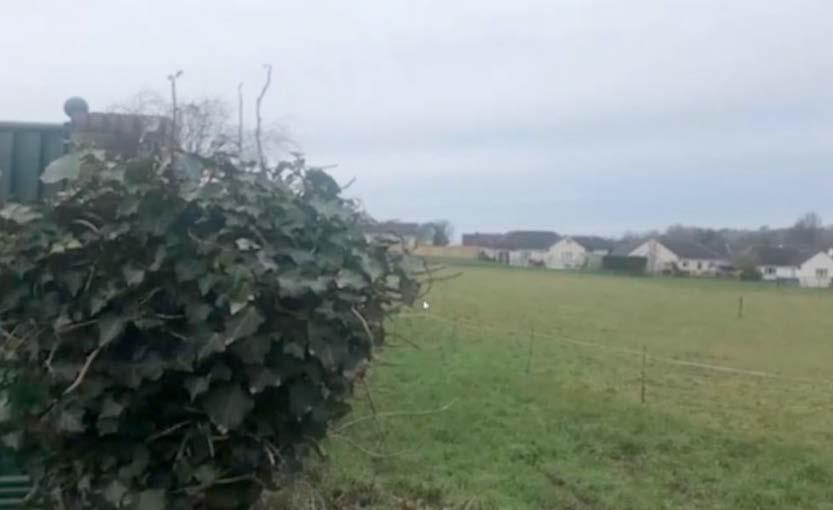
A SCHEME for 50 homes in a Pembrokeshire town, which was put on hold temporarily last month, has been refused despite a call for it to remain paused.
In an application recommended for refusal at the October, and now november, meetings of Pembrokeshire County Council’s planning committee, South Meadow Homes Ltd sought permission for a development of 50 homes, including a 10 per cent affordable housing contribution, on land north of Gibbas Way, Pembroke.
A report for members said that further financial obligations
for the scheme, other than affordable housing units, were sought, comprising of financial obligations to address the shortfall in planned capacity at Henry Tudor School (£41,321.74) and ‘active travel’ improvements (£25,000) respectively.
The financial obligations sought total £66,321.74.
It said that, other than the provision of the affordable housing units, “the applicant has challenged the obligations sought, suggesting that they are
not justified and inferring that the development will be unviable if they are to be secured”.
It was recommended for refusal on the grounds of the absence of that obligation and for the need for a full Screening and Appropriate Assessment (AA) in compliance with the Habitats Regulations (2017) in consultation with natural Resources Wales.
It said, in the absence of this, to grant planning permission would be “unlawful”.
Pembrokeshire County Council recently backed sending a letter to the First Minister,

conveying the authority’s “great concern over natural Resources Wales’ recent river nitrates guidance,” which has “essentially placed a moratorium on certain types of development in Pembrokeshire”.
It says the area which development is required to demonstrate nitrogen neutrality is approximately 75 per cent of the county, including Haverfordwest, narberth, Pembroke and Pembroke Dock, and amounts to approximately 35 per cent of the council’s future housing land supply.
At the October meeting, members heard the applicants were investigating ways of mitigating the nRW concerns, and “at no time” had they refused the other obligations sought, awaiting an independent valuation of the viability with those conditions.
Members backed the scheme being “paused” while those issues could be addressed, the application returning to the november meeting.
At the november meeting, agent Guy Thomas reiterated there was no refusal to pay a contribution; members hearing the nitrates issue was ongoing.
“All we’re asking is for the opportunity to develop this application on a paused basis,” he said.
He said the cost for providing the affordable units amounted to some £0.75m, adding: “Our grievance is on top of that a late bid has been put in by education and highways, despite assurances it was no longer incumbent.”
He asked: “Why of all the nitrates paused applications have we been singled out for refusal?” he asked, adding: “Work with us to create these 50 new homes; we need you to allow the application to remain paused.”
Moving the recommendation of refusal, Cllr Simon Hancock said the scheme in its current form could not be approved.
Members voted in favour of the recommendation of refusal by 11 votes to one, with one abstention.
SENEDD Members quizzed the boss of Dŵr Cymru Welsh Water about plans to cut around 500 jobs amid concerns about the “enormous” pay and bonuses pocketed by executives.
Peter Perry, the outgoing chief executive, appeared before a Senedd committee today (november 5) after Welsh Water unveiled plans to cut annual spending by £50m.Mr Perry is retiring from the industry after joining the company as an apprentice in 1979, with former Sydney Water boss Roch Cheroux set to take the reins in the new year.
He told the climate committee: “In my 46 years, I’ve never seen a time for the industry or the company where there is so much external focus, so much challenge.
“Customers are, rightly, expecting better standards and there’s an unparalleled interest in the environment… we welcome both but there are also considerable challenges.”
He outlined Welsh Water’s trawsnewid (transformation) plan to reduce its workforce by approximately 500 full-time-equivalent roles over the next 18 to 24 months.
“This is not a desired outcome, this is a necessity,” he said.
Mr Perry explained the sector has faced hundreds of millions in extra costs due to the pandemic and droughts, with £60m spent on the Felindre water treatment works alone.
He told Senedd Members a sectorwide credit-rating downgrade has increased borrowing costs, reducing Welsh Water’s financial wiggle room.
“We are not in the same strong financial position we would have been in five years previously,” he said.

2025 to 2030, which is nearly double the amount of the previous five years.
said 316 people have so far put their name forward for voluntary redundancy.
On the risk of losing experienced staff, Mr Perry said: “We will be disappointing some colleagues who would like to go on the basis that we can’t lose their expertise.”
Janet Finch-Saunders, a Tory committee member, said: “There’s been so much concern about the level of executive pay and bonuses at a time… when it is felt by many people that there has been a lot of failings within the water industry and, in particular, Dŵr Cymru.”
Welsh Water’s chief executive received a £460,000-a-year base salary in 2025/26, with total target remuneration of £894,000, according to the company’s latest accounts.
Mr Perry, who earned a base salary of £369,000 in 2024/25, replied: “First and foremost, any of the variable pay that executives have is entirely based on performance so there has been a proportionate reduction.”
“The whole idea of trawsnewid is the company taking responsible action now to make sure we remain in a sustainable financial position for five, ten, 15, 20 years.”
Llŷr Gruffydd, who chairs the committee, asked whether Welsh Water will have to do less due to having fewer people – warning of a “doom loop” of worsening performance.
Mr Perry insisted: “That’s not the case at all… we would not, for one second, look at service levels dropping – our targets are tightening.”
Welsh Water stressed the transformation programme will not impact its £4bn investment plan for
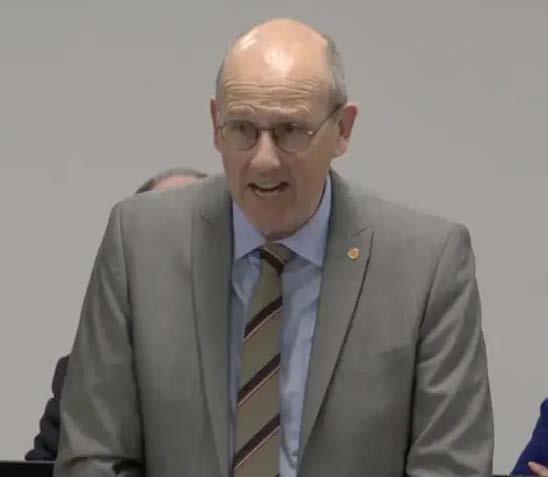
Sam James, commercial managing director at Welsh Water, added: “It’s about doing more with the people we have. How do we make it easier for people to do their job?
“There is still a lot of manual data processing, for example.”
The not-for-profit company is focusing on reducing “back-office” support and management roles to limit the impact on front-line teams.
Ms James said the plan is broader than a restructuring, with 50% of savings to come from employment costs and 50% from other efficiencies, such as better use of data and AI.
Martin Driscoll, Welsh Water’s business support and people director,
He added: “I acknowledge I’m well paid, I’m not going to win the argument on that, but what I would say: the figure that’s been in the public domain of an £800,000 salary is incorrect. 40% of it was linked to an accounting practice… for a future pension accrual.”
Mr Driscoll described the £892,000 listed in the 2021 accounts as total remuneration as “to some extent fictional”, claiming the chief executive’s pay has “tracked downward” over the past five years.
Asked whether executives will take a pay cut, Mr Perry told the committee: “Trawsnewid is not about cutting people’s pay in the organisation at all.
“We’re losing colleagues, regrettably, but we’re not attacking people’s terms and conditions.”
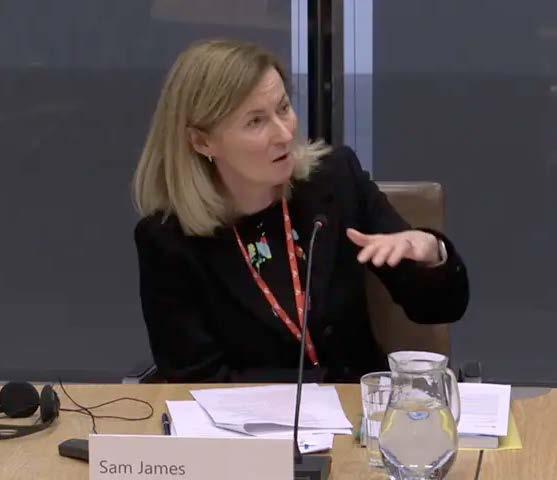



SOUTH PEMBROKESHIRE
MS Samuel Kurtz has warned that patients in Pembroke and Pembroke Dock are being left behind amid what he calls a “growing GP crisis” in the area.
During Health Questions in
the Senedd, Mr Kurtz raised concerns about Argyle Medical Group in Pembroke Dock, now the second-largest GP practice in Wales, caring for more than 22,500 patients with just nine GPs — an average of around 2,500 patients per doctor.

By comparison, Sketty and Killay Medical Centre in Swansea has 18 GPs for just under 22,000 patients — almost double the workforce for the same population.
Mr Kurtz said patients were facing long waits for appointments and staff were under “unsustainable pressure”. He accused the Welsh Government of failing to plan properly for the healthcare needs of rural and coastal communities, calling for urgent action to boost GP recruitment and retention, fair funding for rural practices, and timely access to care.
Speaking after the exchange, he said: “Patients in Pembrokeshire deserve the same access to GP care as those in other parts of Wales, yet they’re being left behind.
“Doctors and staff at Argyle Medical Group are doing their very best under immense strain, but they simply don’t have the numbers to meet demand. This is a workforce crisis that needs immediate attention.
“The Welsh Government must recognise the unique challenges faced by rural healthcare providers and act now to ensure communities in west Wales aren’t forgotten.”
Mr Kurtz added that he had requested an urgent meeting with the Health Minister, Argyle Medical Group and Hywel Dda University Health Board to address what he described as “the number one issue of concern” raised by his constituents.
Earlier this year, The Herald reported that GP shortages in Wales had left patients per doctor at nearly double the European average, with Argyle Medical Group specifically cited as one of the most overstretched practices in the country.
At that time, the practice was treating around 25,000 patients with nine GPs, highlighting long-standing recruitment difficulties in the county.
Hywel Dda University Health Board has previously said that it continues to work closely with local practices to improve capacity and maintain patient access to services, including through cluster working and recruitment incentives for hard-to-staff rural areas.

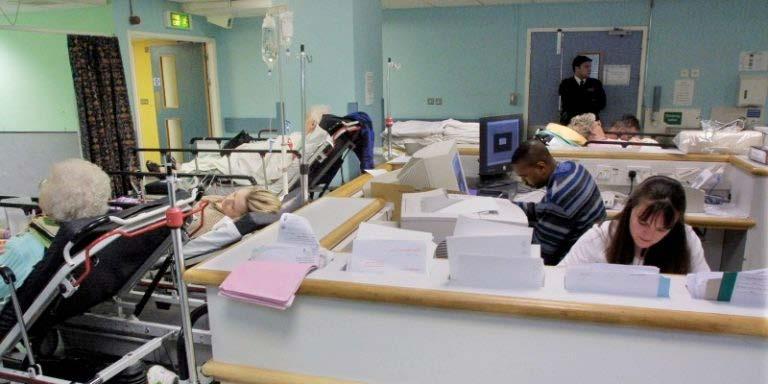
MORE than ten thousand people across Wales have signed a petition demanding urgent action to end the growing practice of “corridor care” in NHS hospitals — including reports from Withybush Hospital where patients have been left waiting for treatment in chairs, trolleys and corridors due to lack of beds.
The petition, supported by both the British Medical Association (BMA) Cymru Wales and the Royal College of nursing (RCn) Wales, was launched after hundreds of nurses and doctors came forward describing unsafe and undignified conditions. It has now been presented to the Welsh Government, and the issue is expected to be debated in the Senedd later this month.
Health staff say the problem, once confined to emergency departments, is now widespread across Welsh hospitals, including those serving Pembrokeshire.
One senior nurse told The Herald: “We’ve had elderly patients waiting on chairs in A&E for two or three days at a time. They can’t lie down, they can’t rest, and there’s no privacy. It’s awful for them and heartbreaking for staff.”
Doctors and nurses who contributed to the petition described distressing conditions:
“I have seen patients where diagnoses have been missed due to inadequate places to examine them,”
said one doctor. Another added: “I routinely see patients on the back of an ambulance, patients whose treatments are delayed because there are no beds or cardiac monitoring spaces.”
Dr Manish Adke, chair of the BMA’s Welsh Consultants Committee, said:
“This overwhelming response sends an unequivocal message: the Welsh public, healthcare professionals and patients are united in their concern about the ongoing crisis of patients being treated in hospital corridors.
“This practice exposes vulnerable individuals to a lack of privacy, dignity and essential care, while staff struggle to deliver safe treatment without adequate equipment or support.”
RCn Wales national Director Helen Whyley said the petition’s closure “marks not the end, but the beginning of renewed efforts to restore dignity, safety and high-quality care to all patients in Wales.”
The petition calls for the Welsh Government to:
• Record and publish all instances of corridor care to ensure transparency and accountability.
• Pause any further reductions in hospital beds until safe alternatives are in place.
• Invest in community-based
services so patients can be treated closer to home.
• Focus on prevention and early intervention to reduce hospital admissions.
At Withybush Hospital in Haverfordwest, staff say corridor care has become a regular feature of winter pressures — but now extends well beyond seasonal peaks.
Sources within Hywel Dda University Health Board told The Herald that emergency departments are frequently running at or above 100 per cent capacity, forcing staff to accommodate patients in waiting areas and temporary bays.
One healthcare assistant said: “It’s not uncommon for patients to be treated in corridors for entire shifts. Staff do their best, but it’s not safe. There’s no privacy, and we can’t always monitor patients properly.”
According to the latest nHS Wales performance data, more than 8,000 people waited over 12 hours in emergency departments across the country in September, including hundreds within the Hywel Dda region. Government and health board response
A Welsh Government spokesperson said: “We recognise the pressures facing our health service and the immense effort being made by nHS staff. We are investing in measures to increase patient flow, expand sameday emergency care and improve discharge pathways so patients can
leave hospital safely when ready.”
A Hywel Dda University Health Board spokesperson added: “Demand for urgent and emergency care remains exceptionally high across the region. Staff at Withybush Hospital and our other sites work tirelessly to maintain patient safety and dignity, and we continue to prioritise actions that reduce overcrowding, including community care initiatives and faster discharge processes.”
Welsh Conservative Shadow Health Minister natasha Asghar MS said: “This is a symptom of a health service under immense strain. Corridor care should never become routine, and patients deserve better than to be treated in waiting rooms and corridors.”
Plaid Cymru’s health spokesperson, Mabon ap Gwynfor MS, added that chronic underfunding of social care was worsening hospital gridlock. “We need an integrated plan that tackles bed shortages and social care blockages together,” he said.
Senedd debate expected this month
The petition — signed by 10,533 people — will now be reviewed by the Senedd’s Petitions Committee before being debated later in november. For frontline nHS workers in Pembrokeshire, the message is simple. As one nurse told The Herald: “Patients in corridors are not numbers. They’re people who deserve care, dignity and respect. We just want the system to let us do our jobs properly.”


WELSH councils have warned plugging a £436m budget gap for next year would require an average council tax increase of 22% or the loss of 14,000 jobs.
The Welsh Local Government Association (WLGA), which represents Wales’ 22 councils, said local authorities face £560m of pressures in 2026/27 – £100m more than expected.
Councils warned a 2% settlement in the Welsh Government’s “roll-over” draft budget would be “extremely damaging” for services and leave a £436m shortfall. Ministers have proposed an average 2.5% increase, with a funding floor to ensure no council receives less than 2.3%.
Bridging the £436m gap would require “unconscionably high” council tax rises of about 22% or the equivalent of around 14,000 job cuts across Wales, according to the WLGA.
The stark warning was echoed by Wales’ outgoing auditor general who said some councils are “very close” to having to issue a formal section 114 (effective bankruptcy) notice.
Adrian Crompton told the Senedd’s finance committee that councils – which are forecasting a £184m overspend in 2025/26 – are
struggling to balance their books.
He said: “There are undoubtedly a few authorities that are very close to having to issue a section 114. Our assessment at the time of publishing our report was that none were about to, so they all had sufficient grip on their in-year position, so it wasn’t imminent.
“But some are right at the edge and they are all facing some very significant demand-led pressures in areas like children’s services, additional learning needs, temporary accommodation, which are very hard to predict.”
Mr Crompton, whose eight-year term as auditor general ends in July, added: “When you’re right at the edge of financial sustainability, if you get hit with a couple of significant cases that you have to deliver against, that could be sufficient to tip authorities over the edge.”
He warned their fragile financial state means councils would be the “most immediately and severely hit” sector if the Welsh Government’s budget fails to pass.
The financial pressures facing councils were detailed in the WLGA’s written evidence on the draft budget which showed how demand-led services are spiralling.
For example, the net cost of homelessness and temporary accommodation has exploded nearly eight-fold in a decade – from £12.8m in 2016/17 to £100.8m budgeted for this year.
The WLGA also warned of “unsustainable” pressures on school finances, with children’s care and education accounting for the majority of the forecasted £184m overspend.
One council said 33 primary and six secondary schools – nearly 70% of all schools in its area – were projecting a deficit budget.
Another reported its schools had “completely eroded a £15m surplus balance into a £2m deficit” and projected a £9m inyear overspend. Others warned of job losses, reserves running dry and class sizes rising above legal limits.
The financial strain is so severe councils are failing at their basic accounting duties, with many missing deadlines to file their accounts – a situation
Mr Crompton described as a “slippery slope” for bodies “so close to financial sustainability”.
He argued spiralling demands are a symptom of a wider failure to shift spending to prevention. The auditor general said his recommendation for the Welsh Government to “embed
prevention into the budget-setting process” had been rejected.
“It’s disappointing that it’s been rejected because it seems so fundamental,” said the auditor general, who added: “I don’t fully understand why.”
Councils’ evidence echoed this, stating while policy “increasingly references the importance of prevention, this is not often reflected” in funding. The WLGA said this has forced councils to cut nonstatutory services such as leisure, transport and community facilities.
Mr Crompton’s warning about councils was part of a wider assessment that Wales’ entire model of public service delivery is “unsustainable on its current trajectory”.
Giving evidence on november 5, he told Senedd Members demand is “outstripping” funding and critical areas have been “hollowed out” after two decades of tight budgets.
Mr Crompton warned this “unsustainable” model was not unique to local government, with all seven health boards in Wales breaching their statutory duty to break even over three years. The finance committee heard the nHS is forecasting a £191m deficit this year.
TWO former Labour council leaders in Wales have defected to the Green Party, signalling growing momentum for the environmental movement ahead of next year’s Senedd election.
Robert James, the former leader of the Labour group on Carmarthenshire County Council, and Sean Morgan, who led Caerphilly County Borough Council before resigning from Labour during the recent by-election, were both unveiled as new Green Party members at the party’s Welsh conference in Cardiff on Saturday (nov 8).
The Greens said the defections reflected a wider shift in Welsh politics, claiming their membership had almost tripled in just two months and was now approaching 6,000.
Party leader Zack Polanski told delegates: “This will be the first of many councillors who we will be welcoming to the Wales Green Party. More breakthroughs will follow.”
Mr James said he had joined a party that “puts people and planet first”
Chris Haines ICNN Senedd reporter
and pledged to campaign on tackling inequality, protecting public services, and safeguarding the environment.
Sean Morgan described his move as an “easy decision”, saying: “It has become increasingly clear in recent months that the Labour Party no longer represents the values of ordinary members or ordinary people in this country. That has caused me to question the ethics of remaining in Labour.”
Wales Green Party leader Anthony Slaughter said the new recruits showed that the “political tectonic plates” were shifting in Wales.
“This truly demonstrates that we are the bold new voice Wales so desperately needs,” he said. “With the introduction of a fully proportional Senedd voting system in May, the Greens will be pivotal in shaping the next Welsh Government.”
Welsh Labour has been asked to comment.

RESUBMITTED plans for a previously refused scheme for eco-friendly natural burials at a Pembrokeshire cemetery have now been given the go-ahead by the county council.
A natural burial is an eco-friendly alternative to traditional burial, burying a body in the ground without a coffin or headstone.
In an application to Pembrokeshire County Council refused in April, the Trustees of Tabernacle Chapel sought permission for a change of use of agricultural land to extend the existing Tabernacle Cemetery, Fishguard to include a natural burial site.
A supporting statement, through agent Gethin Beynon, said the land has been in the cemetery ownership since 1945, adding: “As the development is not proposing any engineering or physical features with the natural habitat being retained, it is considered the change of use of the land would be in keeping in an area where other cemeteries exist to the north, east and west of the application site.”
It added: “With regard to the operation of the burial ground, when a burial takes place, a plot is allocated, and the turf cut and set aside. The topsoil and subsoil are then heaped alongside the grave. The graves would be dug to the appropriate depth to earth over the coffin to protect it whilst allowing the body to recycle in the active/living layer of the soil.”
It said grave locations are plotted
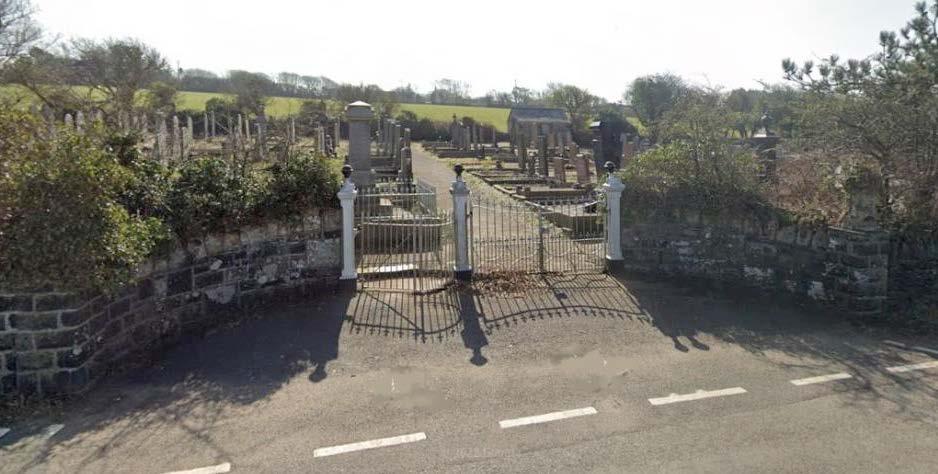
Bruce Sinclair Local Democracy Reporter
and recorded on plan, with no marked graves.
The application was supported by Fishguard and Goodwick Town Council, subject to satisfactory outcomes of an archaeological survey in relation to nearby Castell Mwrtach, an Iron Age defended enclosure and possible associated earthworks, along with discussions with the south Wales Trunk Road Agency.
An officer report, recommending refusal previously, said natural Resources Wales (nRW) had raised concerns about potential water pollution to controlled waters, with no risk assessment in support of the scheme submitted.
Archaeological advisors Heneb had said a geophysics survey of the site was needed to determine any effect on adjacent to Castell Mwrtach, with none submitted.
The scheme was refused by planning officers on the grounds of the concerns raised.
The resubmitted application said a ground and controlled waters assessment has been undertaken and a geophysics survey and archaeological evaluation has been undertaken, concluding the proposed use of the land would not have an unacceptable impact on the historic environment.
An officer report recommending approval said nRW was satisfied there are no unacceptable risks posed to controlled waters, adding there were no objections from Heneb, or on any potential impact on highways.

W ITH ANDREW LyE
Delivering a fair electoral system through proportional representation (PR) is a key pillar of Liberal Democrat policy and the values that drive us for several decades. Under PR, the number of MPs a party would get broadly reflects the number of votes they got across the country.
At the last General Election, for example, in the Mid & South Pembrokeshire seat, Henry Tufnell won, with just 35.4% of the votes cast. In other words, almost 2 out of 3 votes were “wasted”.
Across the UK, millions of votes are rendered worthless under our First Past the Post (FPTP) voting system that awards huge majorities to parties with relatively small shares of the vote.
Only one other nation in Europe uses the FPTP voting system. Belarus.
We Liberal Democrats are the only party with the conviction to stand up and fight for what we believe in. Not because it benefits us, but because we think it’s right for the country. Everyone’s vote should count.
Some political commentators have said that the 2 main party system is history. We have seen the polls that show Reform has surged and taken votes from both Labour and the Tories and whilst support for the Liberal Democrats has remained steady, the Greens have seen a surge in theirs since Zack Polanski was elected leader.
And here in Wales, Plaid Cymru won the Caerphilly Senedd byelection and Labour seem to be on their way out, with all 96 seats up for
election, next May.
Liberal Democrat leader, Ed Davey has confirmed we are committed to electoral reform and said “I’m prepared to work with the government if they wake up.”
Starmer had supported electoral reform during his bid to become Labour leader in 2020, but has since dropped his pledge and it did not include it in their 2024 election manifesto.
An attempt by the Liberal Democrats through a Ten Minute Rule Bill to introduce PR passed it’s first stage in the Commons in December 2024, but got no further as the Government made it clear they had no plans to reform the voting system.
Liberal Democrat MP, Sarah Olney highlighted the fact that Labour won 63% of the seats in the Commons, on just 34% of the vote and that almost 60% of voters are not represented in Parliament by the candidate they voted for.
Ed Davey has called upon Starmer to reconsider the idea for reform as a relatively small share of the vote could result in Reform UK leader, nigel Farage becoming PM if current polls are replicated in the next General Election, due by early 2029, at the very latest.
The irony is that Farage has supported PR for a long time, and it was promised in their 2024 manifesto. now, they have a lead in the polls, he appears to have changed his mind. However, anything can happen between now and the next election.
However, the Liberal Democrats remain committed to PR as we believe in fairness.
If you have any issues or
‘Smoke and mirrors’ after 20 years of ‘inaction’ over landfill stench
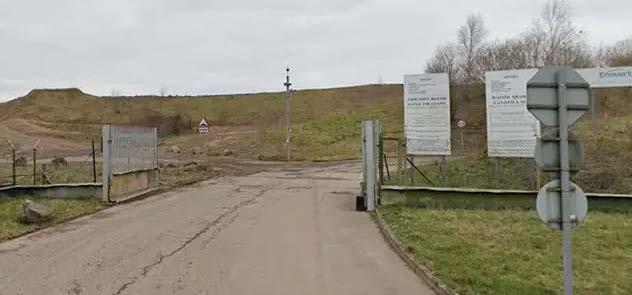
REGULATORS have been accused of presenting “flawed and misleading” evidence to a Senedd inquiry into a stench from a tip which has plagued people’s lives for nearly 20 years.
Steve Gittins, a campaigner from Johnstown, Wrexham, submitted a petition calling for the revocation of Enovert’s environmental permit for the landfill site at the old Hafod quarry.
Giving evidence to the Senedd’s petitions committee today (november 10), Mr Gittins said people would accept nothing less than the site being closed after 20 years of “inaction”.
Criticising “flawed and misleading” evidence submitted to the inquiry by natural Resources Wales (nRW), he suggested graphs and figures were manipulated to downplay problems.
“I think there’s a lot of smoke and mirrors going on here,” he said.
He warned an 18-year history of “noxious odours” and “unacceptable statutory nuisance” has got incrementally worse over the years. He told Senedd Members the problem has not improved since nRW issued an enforcement notice in 2023.
Asked about claims the number of complaints has reduced significantly, Mr Gittins pinned the fall on “complaints fatigue” – with people burned out from reporting problems for years.
He said: “It’s welldocumented, especially with nuisance issues, where complaints fatigue happens. I mean we’ve been complaining for two decades, remember,
Chris Haines ICNN Senedd reporter
and the thing has never got any better… there’s been inaction all along.”
Mr Gittins criticised nRW’s “rather apathetic” response, which advised him to report up to ten incidents a day, adding: “What a burden that is… we’ve got better things to do.”
He told the committee: “Interestingly, all the witnesses… who have said ‘there’s nothing to see here’ – none of them live in Johnstown, none of them… We put up with this daily and all we get is ‘there’s nothing to see here’ – and that’s wrong.”
nRW has stated odour reports have shown a decreasing trend as of May 2025, and a permit can only be revoked if there is a “serious risk” and all other measures have been exhausted.
Wrexham Council concluded “no statutory nuisance exists” after a summer assessment while Huw Irranca-Davies –Wales’ Deputy First Minister –has resisted calls to intervene.
But Mr Gittins raised concerns about the robustness of monitoring arrangements, suggesting Enovert was “marking its own homework” as he called for an independent review.
“Even… with their own figures, they’re not compliant… there’s no hiding from it,” he said.
Mr Gittins added: “I’m getting increasing problems getting an answer from anybody. One member of Wrexham Council has written to me to say he refuses to communicate with me any more and advised me to go to the public ombudsman which I’ve done.”
He told the committee: “On behalf of local residents, I know the strength of feeling, they won’t
accept anything other than the site being closed because they cannot manage it.
“It hasn’t been managed efficiently for 20 years… and 20 years is enough. We’ve got another 35 years’ licence on that landfill site. My children, my grandchildren are all going to suffer from this place. I just don’t understand why we should put up with that.
“IT’S nOT EVEn OUR RUBBISH.”
In 2024, 54% of the waste came from England – primarily Merseyside and Cheshire – and 46% from Wales, of which 25% was from Wrexham.
Asked about the effectiveness of community engagement, Mr Gittins said: “If you spoke to the vast majority of our community, I don’t think I could repeat the answer.”
He dismissed claims of an “open forum” at a liaison group which he was not allowed to join. “All it is is a promise of jam tomorrow…,” he told the committee. “In terms of the transparency and engagement, I feel it is extremely poor.”
Dorothy Tunnah, a member of the Hafod liaison group who lives nearby, criticised Enovert executives who suggested the rain makes no difference to the level of odour.
“Absolutely untrue, just ask anyone who lives in Johnstown,” she wrote in evidence.
She pleaded with the petitions committee: “Enovert has had enough time to get it right and we hope you agree that Hafod landfill should be closed down. Please do not let us down as former members of the Senedd have over the past 18 years.”

TOURISM leaders have urged Wales not to follow Scotland’s lead by replicating a “failed” licensing scheme that has “harmed” the industry and created a “thriving black market”.
Last week, the Welsh Government unveiled a tourism bill in the Senedd which, if passed, will create a mandatory licensing scheme for short-term Airbnb-style rentals.
But industry representatives gave a damning account of a similar policy in Scotland, describing the experience since its introduction in 2022 as a “real horror story”.
Marc Crothall, chief executive of the Scottish Tourism Alliance, warned the policy has created “far greater harm than good” as he gave evidence in the Senedd.
He told the economy committee: “When policy is developed without a clear objective and without reliable data, it fails, and Scotland… is that case study.”
Fiona Campbell, chief executive of the Association of Scotland’s Self-Caterers, pointed to two successful judicial reviews brought against Edinburgh Council. She warned the entire Scottish scheme is “in breach” of the Human Rights Act.
She said: “I would just urge the Welsh Government and policy makers to really take heed
of these warnings… don’t do it as Scotland has done it – or you may well end up in court.”
Ms Campbell argued that rather than solving housing problems, the policy was “harming the wrong people and regulating the wrong thing”.
Calling for extreme caution, she criticised the Welsh Government’s projected £75 annual fee for the new licence, labelling it “entirely uncredible” based on Scotland’s experence.
Ms Campbell – who has run a self-catering property for 23 years – told Senedd Members while low fees were promised in Scotland, the reality is they range from £205 to £5,698.
She also dismissed assurances that artificial intelligence and automation would keep administrative costs down as “entirely unrealistic”. “Unless Wales has come up with amazing AI that I’m not aware of, I just don’t think it’s credible,” she said.
Ms Campbell warned of the impact on small operators, with 70% of the Scottish self-catering sector made up of women aged over 55 – a figure she wagered was similar in Wales.
“These are the people you’re harming,” she said.
With Brian Murphy
THIS week has seen many services of Remembrance across the whole country, and I was privileged to attend the Festival of Remembrance in the Royal Albert Hall. It was a very moving and emotional experience. Over the course of two days in London with many veterans I was impressed with their dedication to service and loyalty.
I was reflecting on my time in uniformed service to the Crown and was asked if I would do it again. “Absolutely” was my response. And it was the response of every veteran I asked.
She told the committee the “horror story” in Scotland has seen operators “leaving in droves”.
Mr Crothall added this has led to empty homes, pointing to 230 properties on the Isle of Skye that “remain purely second homes” after their owners opted not to apply for a licence.
Both witnesses stressed they were not against regulation but they argued a separate licensing scheme was disproportionate.
Ms Campbell said the industry supports a national register that includes mandatory health and safety checks but she questioned the need for a second, more costly licensing layer.
“My question is: why do you need licensing on top?” she asked the committee. “If I were a policy maker in Wales, I would wait until I had all the data… it feels premature.”
Giving evidence during an earlier session on november 5, finance secretary Mark Drakeford defended the tourism bill as “good for the industry”. The former First Minister argued the bill would create a level-playing field and reassure visitors.
Prof Drakeford said Wales had learned from Scotland’s “locally based scheme” – which he said had caused confusion –by opting for a simpler, national model.
Around me was respect, tolerance, understanding with people from every race, creed and other demographics. This was the Britain that I and others stood up for. If you want to see diversity, equality and inclusion all you need to do is attend any of the Remembrance Services held every year across the UK. This contrasts with the constant diet we are fed by mainstream and social media that the UK is full of racists, bigots and people who wish to sew division everywhere.
That is why the current crisis the BBC is facing is so important to society. Its job is to reflect reality and be impartial in its reporting. I watched the Panorama programme about the events in Washington and accepted that what I heard trump saying was an accurate record of his speech. That has formed my opinion of his actions that day and the type of person he is. To find out it was blatantly doctored to show he was inciting riotous behaviour, and I was lied to by the BBC was scandalous. The whistleblower who released the information has also listed a litany of similar examples where BBC reporters have given one-sided reports on transgender issues,
as well as reports on the Gaza conflict without doing basic checks on the integrity of its sources. What particularly worries me is this is not the first time the BBC has been found to have deliberately shown sequences out of order to create a false narrative. In 1984 a report on the Battle of Orgeave, during the miners’ strike, was shown out of chronological order. In a documentary about the Royal Family, they did the same to make it look like the Queen had stormed out of a photo shoot. Another example occurred in 2008 when they accused Primark of using child labour in Bangalore; that was entirely untrue. And of course, we all recall how the BBC supported Huw Edwards and Jimmy Saville before the pressure became too much. Even though the bosses knew the truth.
Added to this is the comment made this week by the now ex- Director general Tim Davie that “we’ve got to fight for our journalism”. Does he think that the BBC’s version of journalism is the only one worth fighting for? What are the other types of journalism? It is disgraceful and an affront to the many brave journalists who uphold standards of honesty, integrity, truth such as Tony Collins who uncovered the Post Office Horizon scandal. They, like the veterans I met at the weekend, hold true the values and standards we value in Britain and are worth defending.

SEND yOUR LETTERS TO: THE EDITOR, 11 HAMILTON TERRACE, MILFORD HAVEN, PEMBROKESHIRE, SA73 3AL
EMAIL US AT: editor@herald.email


When I first became entitled to vote, it was in the shadow of a war in which forty million people died to defeat the hard-right ideologies that had taken root across the world. Beyond Conservatism and Republicanism lay something darker — the poisonous beliefs of the Ku Klux Klan, Fascism, Racism, and, at its most evil, Nazism. Entire nations followed Germany into that abyss, consumed by hatred so deep it led to the murder of six million Jewish men, women, and children.
SUE RyDER’S DECEMBER DAILy DASH
We’re encouraging the local community to take on Sue Ryder’s December Daily Dash, a fundraising event my husband and I created in memory of my dad, and in gratitude to the incredible Sue Ryder Nurses who cared for him in his final days.
We lost my dad to cancer in 2015, just 18 months after we lost my mum to the same illness. During this difficult time, the Sue Ryder team went above and beyond, from bringing him a comforting hot chocolate before bed to ensuring he felt dignified and cared for in every moment. Their care made an unbearable time just that little bit more manageable, and we wanted to give something back.
That’s how the December Daily Dash was born.
The challenge is simple, either walk, jog or run 1k, 3k or 5k every day throughout December. It’s a chance to take time for yourself and boost your wellbeing. Plus, the money you raise will provide nursing care for people with a terminal illness, just like my dad, and also provide free bereavement support for people this Christmas.
What began with just the two of us and 11 friends has grown into a community of over 3,800 “Dashers”. Over the past ten years, “Dashers” have covered thousands of kilometres and raised over £650,000 to support Sue Ryder’s work.
This year, we’d love even more people to join us. Whether you dash outdoors or on a treadmill, solo or
with friends, family or your dog, you’ll be part of a community making sure no one has to face death or grief alone this Christmas.
To sign up for free, visit: decemberdailydash.com.
On behalf of us and Sue Ryder, thank you.
Jackie and Mark Smith – Founders of the December Daily Dash and Sue Ryder fundraisers.
Today, while attending my local hospital for a flu jab, I noticed a sign on the wall reminding us of one of the great enduring truths upon which the NHS was founded in 1948 — by the Labour and Liberal parties — that in taking steps to preserve our own health, such as through vaccination, we also take the most effective action to protect the health of every other person on the planet. We are interdependent.
This is not merely a sentimental notion, but a proven and universal truth — one revealed through centuries of scientific and ethical discovery. Through the dedication of great minds, both material and abstract truths have been passed down from the universe itself to humankind, the most
advanced of all mammals on this planet — a planet 13.7 billion years in the making. The design of this universe, as we can see it so far, teaches a clear lesson: we are meant to care deeply for others.
After four billion years of life evolving on Earth, we should have learned this lesson well. Family life, devotion, and sacrifice — values seen in all mammals — have evolved into ethical principles of the common good, championed by Puritans and Roundheads in the seventeenth century, and by social reformers in the nineteenth, who fought for democracy, universal education, and social protection through pensions and unemployment benefits. Every one of these advances was opposed by Conservatives in their day — in 1870, in 1909, and again with the founding of the NHS in 1948. Yet each represented another step in our ethical evolution.
I have never understood why Conservative and Reform parties continue to resist the proven design of this universe — one built on cooperation, compassion, and interdependence. When former Prime Minister David Cameron introduced policies denying support to a family’s third child, I could not help but ask: what species would make such a choice? no mammal on Earth would abandon its young. Why, then, would any adult human do so?
N. Westerman
Today, much of the media reports that politicians are viewed as dishonest and untrustworthy. But I believe the problem runs deeper: that many of today’s voters, in Britain and elsewhere, have forgotten the moral principles of their grandparents — men and women who crossed the globe to give their lives for others.
The rise of far-right movements such as Reform reflects a return to the same poisonous attitudes — racism and hatred — that those earlier generations died to defeat. Such beliefs are subhuman, denying the family love, devotion, and sacrifice that even animals display, and defying the very moral order of the universe.
Our society’s worship of money, treating wealth as the measure of a human life, is a betrayal of those ideals. The greed, selfishness, and arrogance of capitalism were all foreseen in the new Testament, but still selfinterest rules the minds of the modern right, shutting out reason and compassion.
For over a century we have known that money is not the only currency. no billionaire can buy a pint of donated blood to save his own life. Yet only around four percent of British adults give blood — a simple, risk-free act of generosity. What does that say about the other ninety-six percent, and the example they set for their children?
They will live their lives without ever discovering what it truly means to believe in something worth living for.
name and address supplied




A Memorial Service will be held for Miss Llyewla Harris in the Lady Chapel, St.Davids Cathedral on Saturday 22nd November at 2.00pm, followed by the interment of the ashes on the North Bank.
Enquiries to W.G.Bernard Mathias & Daughter, Funeral Directors 01437 720 537.
SUDDENLY on Tuesday 28th October, Joyce of Church Close, Begellly, Kilgetty.
Beloved wife of Jim dear mother of Diane and Paul, respected mother-inlaw of Hazel and stepmother of Hilary, loving mamgu of Llyr, Gethin, Ffion, Elin, Sarah, Owen and Abi.
Funeral service on Tuesday, 18th n ovember, at Tabernacle Chapel, Whitland, at 1p.m. followed by interment at n azareth Cemetery, n orth Road.
Family flowers only.
Donations if so desired towards The Wales Air Ambulance or Cancer Research, (cheques payable to ‘Donation account’ please) received by Ken Davies & Sons, Funeral Directors, Blaenwern, Bro Waldo, Clynderwen. SA66 7NQ. Tel: 01437 563319
THE death occurred peacefully at home on Tuesday 28th October 2025 of Mrs May Mathias, aged 96 years of Summerton Farm, Carew. Beloved wife of the late George. Dearly loved Mother of Clive, Andrew and Ann.
The funeral service will take place on Wednesday 26th November 2025 at St. Mary’s Church, Carew at 1.45pm followed by cremation at Parc Gwyn Crematorium, n arberth at 3.15pm. There will be family flowers only. Funeral arrangements are being carried out by E. C. Thomas and Son Funeral Directors, Zoar Chapel Funeral Home, Llanteg, n arberth SA67 8QH (01834) 831876.
PASSED away peacefully at home on Sunday 26 October 2025, age 89.
Cherished wife of Pat. Much loved father of Michael and Robert.
The funeral service will take place at St Tudwal’s Church, Llanstadwell on Thursday 13 n ovember 2025 at 11.00am, followed by interment at Honeyborough Cemetery, n eyland.
Immediate family flowers only. If desired, donations in lieu of flowers to The Paul Satori Foundation.
Donations can be sent directly (via Paul Sartori House, Winch Lane, Haverfordwest, Pembrokeshire, SA61 1RP) or via Robert Keegan (3 Clos n ant y Cwm, Pontprennau, Cardiff, CF23 8LG).
All enquiries to Tom n ewing and Son Ltd, Milford Haven. Tel: 01646 693180
IT is with great sadness we announce that following a short illness, Owen of Trefgarn Owen Farm passed away suddenly but peacefully, on Wednesday 29th October at Withybush Hospital. Devoted and beloved husband of Mair, cherished and loving father and father-in-law of Sarah & Simon and Meurig & Grace, proud and much loved Dats to Cerys, Rhydian, Jack, Megan & Llyr, loved brother of the late Mary and a very dear uncle & brotherin-law.
Public funeral service on Friday 21st n ovember at 1pm at Trefgarn Owen Chapel, followed by private interment.
Immediate family flowers only. Donations in lieu if desired, made payable to ‘Heart Research Wales’ or ‘Cancer Research Wales’ c/o Paul Jenkins & Sons Funeral Directors, Feidr Castell, Fishguard, SA65 9BB.
Tel - 01348 873250.
M ARGARET H EARy ( N é E L EWIS )
PEMBROKE - Margaret passed away peacefully after a short illness on Wednesday, 29th October 2025, at Withybush Hospital, aged 89 years.
Beloved wife of the late Arthur, sister to the late Joanna and Elizabeth. A dear auntie who will be sadly missed by family and friends. Her funeral service will take place on Monday, 24th November 2025 at 2:30 pm, at Parc Gwyn Crematorium, n arberth.
Family flowers only please, but if desired, donations in lieu for The n ational Trust may be sent c/o John Roberts & Son, Funeral Directors, 51, Bush Street, Pembroke Dock, SA72 6AN. Tel. 01646 683115


























RECLAIMED BUILDING MATERIAL

RUBBISH AND WASTE REMOVAL


PROFESSIONAL CAR WASH

PODIATRy

SCRAP METAL

SHUTTERS & BLINDS

STORAGE TANKS

SOUND LIGHT AND STAGE

TECHNOLOGy AND COMPUTERS

TRAILERS

VEHICLE RECOVERy












CYMRU will be without Ben Davies and Kieffer Moore for their final World Cup qualifying matches against Liechtenstein and North Macedonia after both players were ruled out through injury.
Swansea City defender Ben Cabango has also withdrawn from the squad.
Tottenham Hotspur’s Davies, 32, has not featured since suffering a hamstring injury in October’s defeat to Belgium. Despite being named in Rob Page’s squad for Saturday’s trip to Vaduz and next Tuesday’s home clash with north Macedonia, he has now been forced to pull out.
Wrexham striker Moore, 33, was also originally included but picked up an injury during his club’s Championship victory over Charlton Athletic last weekend
He will be replaced by uncapped Cardiff City forward Isaak Davies, while Queens Park Rangers leftback Rhys norrington-Davies comes in for Spurs defender Davies.
With Davies sidelined, Cymru must also appoint a new captain. The defender has been wearing the
armband in the ongoing absence of regular skipper Aaron Ramsey, who remains unavailable through injury.
Swansea captain Cabango completed the full 90 minutes in Saturday’s 4-1 loss to Ipswich Town, but the Football Association of Wales (FAW) confirmed that the 25-yearold has also been ruled out due to injury.
Liechtenstein v Cymru
Saturday 15 november, kick-off 17:00 GMT, Rheinpark Stadion, Vaduz
Coverage: Live on BBC Two (or BBC One Wales) and S4C with Welsh commentary. Also available to stream on BBC iPlayer and via S4C’s online service.
Cymru v North Macedonia
Tuesday 18 november, kick-off
19:45 GMT, Cardiff City Stadium
Coverage: Live on BBC One Wales (English commentary) and S4C (Welsh commentary). The match will also be available via BBC iPlayer and the BBC Sport website/app, and S4C’s online platform.

CYMRU have unveiled their new adidas home shirt, inspired by Welsh history and national pride.
The classic red base is paired with bold horizontal stripes in dark green, red, and white — colours from the national flag. The word CYMRU is subtly woven into the green stripe, symbolising unity and identity.
On the back of the neck, the motto Gorau Chwarae Cyd Chwarae (“Best Play is Team Play”) reflects the team’s spirit of togetherness. The design blends tradition with modern style, echoing Cymru’s adidas kits from 1976 and 1984.
Made with adidas’ CLIMACOOL+ technology for comfort and performance, the shirt also features the brand’s new lenticular logo. Fans can see it debut at Cardiff City Stadium on 18 november, when Cymru face North Macedonia in their final 2026 FIFA World Cup qualifier.
The new kit has be available from 6 november exclusively through JD, in stores and online.

LOUIS REES-ZAMMIT will make his first Wales start since the 2023 Rugby World Cup after being promoted from the bench for Saturday’s Autumn Nations Series Test against Japan.
The Bristol wing is joined in the starting xV by back-row forward Olly Cracknell, as head coach Steve Tandy makes four changes to the side beaten 52–28 by Argentina last weekend.
Rees-Zammit replaces Tom Rogers on the right wing, while Cracknell, who made his Test debut against the Pumas, steps in at number eight for injured captain Jac Morgan.
With a quick six-day turnaround, Tandy has refreshed his front row. nicky Smith and Archie Griffin come into the starting side, with Rhys Carre and Keiron Assiratti moving to the bench.
The loss of Morgan, the British and Irish Lions flanker who suffered a series-ending shoulder injury while scoring his third try against Argentina, means Ospreys hooker Dewi Lake will captain the team— just as he did during the summer
tour to Japan.
Morgan’s absence has prompted a reshuffle in the back row. Alex Mann, typically a blind-side flanker, will wear the number seven shirt, while Aaron Wainwright, fit again after hobbling off last Sunday, switches to blind-side.
“We feel he’s got all the qualities to play six or seven,” said Tandy of Mann. “Some of his attacking ability you’ve seen on the weekend and his defensive energy was outstanding. Then bringing Olly Cracknell in at number eight and moving Aaron Wainwright to six gives us a really good balance in the back row.”
Scarlets forward Taine Plumtree and Saracens centre nick Tompkins return to the matchday 23 after missing out against Argentina, with Rogers dropping out.
The squad features 12 players based outside Wales—11 in England and Montpellier lock Adam Beard—who will be unavailable for the autumn finale against South Africa, as it falls outside World Rugby’s official Test window.

Rees-Zammit’s return to the starting XV
Rees-Zammit earned his 33rd cap when coming off the bench against Argentina, marking his first appearance since returning to rugby with Bristol this summer following two years pursuing an American football career.
The 24-year-old will start for the first time since the World Cup quarter-final defeat to Argentina, aiming to add to his 14 international tries.
“He played a good few minutes last weekend and we feel he’s ready to return to the starting line-up,” said Tandy. “I think we’ve definitely seen lots of how we want to play against Argentina. There was lots to be pleased about – our attack I thought was excellent and I saw a lot of physicality – but there’s lots to improve.”
Saturday’s Test at Cardiff’s Principality Stadium carries added importance ahead of December’s World Cup draw. Twelfth-placed Wales must beat Japan to remain
above them in the world rankings and stay in the second seeding pot for the 2027 tournament.
Tandy is still seeking his first win as head coach after taking over in the summer. Wales ended an 18-Test losing streak with victory over Japan earlier this year under interim boss—and current attack coach—Matt Sherratt.
Wales team to face Japan
Wales: Murray; Rees-Zammit, Llewellyn, B Thomas, Adams; Edwards, T Williams; Smith, Lake (capt), Griffin, D Jenkins, Beard, Wainwright, Mann, Cracknell. Replacements: Belcher, Carre, Assiratti, F Thomas, Plumtree, Hardy, J Evans, Tompkins.
Match details
Venue: Principality Stadium, Cardiff
Date: Saturday, 15 november
Kick-off: 17:40 GMT
Coverage: TNT Sports, S4C, Live commentary on BBC Sounds, BBC Radio Wales, BBC Radio Cymru.

IT’S not every day you get a WhatsApp message telling you to get a visa — followed by an invitation to compete at the Beijing Rallycross. But that’s exactly what happened to local rally driver Chris Hand, who was contacted by the UCRC Rally Team in China and soon found himself packing his bags for a ten-hour flight to Beijing.
For Chris, a Cilwendeg Rally winner and the current runner-up in the 2025 BRC national Championship, it was a once-in-a-lifetime opportunity — and one he grasped with both hands, despite having no prior rallycross experience.
“Rallycross was a completely new discipline for me,” said Chris. “But after a few test runs, we quickly found our rhythm. Working our way through the heats, we lined up fourth for the final. After a hard-fought five-lap race, we managed to bring it home in second place.”
Chris first met William from the UCRC Rally Team during the Grampian Forestry Rally in August, where William took a shine to Chris’s distinctive yellow Toyota Starlet. A few Zoom calls later, an official invitation arrived — and so began an unforgettable adventure.
“It still feels surreal — just an average guy from west Wales competing in such
a major international event. It was a truly unbelievable experience. A huge thank you to everyone back home who’s helped keep the wheels turning and made this possible through their support — especially my wife, Letty, whose encouragement means the world.”
Competing in identical cars made for close, fast-paced racing. “There were split seconds between us all,” Chris said. “Without a navigator, it was just pure reaction and focus — and a lot of fun!”
Chris was joined on the trip by Sam Mason, a BRC contender in the Junior Rally 4 category, who sadly suffered a serious accident during the event and was taken to hospital.
Despite the challenges — including a significant language barrier — Chris said the welcome from the UCRC Rally Team was exceptional. “William’s daughter was an incredible help, translating everything and even taking me to see the Great Wall of China and the Bird’s nest Stadium.”
Reflecting on the experience, Chris added: “I met incredible people on my journey and made lasting friendships. I’d definitely go back again. I’m so grateful to the UCRC Rally Team for making this trip possible.”
APPRENTICE electrician and rising rally star, 17-year-old Henri Cynwyl from Ponthirwaun, has secured yet another podium finish — this time at the Kevin Ephraim Memorial Toyota Harlech Stages, alongside co-driver Catrin Price, where the pair finished in second place.
Henri has led the Junior F1000 UK Championship throughout the season, and the final round at Anglesey this weekend will determine the overall winner.
“I have to use a drop score on one of the days, so what will be will be,” said Henri, who recently co-drove at Rali Ceredigion with local man Andrew Davies, and also finished third in class co-driving on the Tour of Epynt with Kyle Green.
Reflecting on his progress, Henri added: “It’s been a year of learning and having invaluable advice from my mentor, James Williams. I’ll be sad to move on to the seniors, but I’m relishing the challenge and can’t wait for the 2026 season to start.”
Over the weekend, Henri added another strong result to his record, taking a podium finish with co-driver Dilwyn John at the Llandeilo Motor Club Towy Legends Targa event at Pembrey, where they finished 21st overall and

third in class — an impressive result in Henri’s first ever senior event.
“It’s been a terrific year and I’ve made so many memories, friends and contacts,” he said. “Every rally is
different, and the weather has been challenging on many of them, but I’ve learnt a lot. I’m very grateful to everyone who has supported me on my journey – from my co-drivers to my service
DIVISION
III v Milford Athletic Res
Narberth Reserves v Lawrenny Res
Pembroke Boro Res v Letterston Res
Prendergast Villa II v Milford United III
